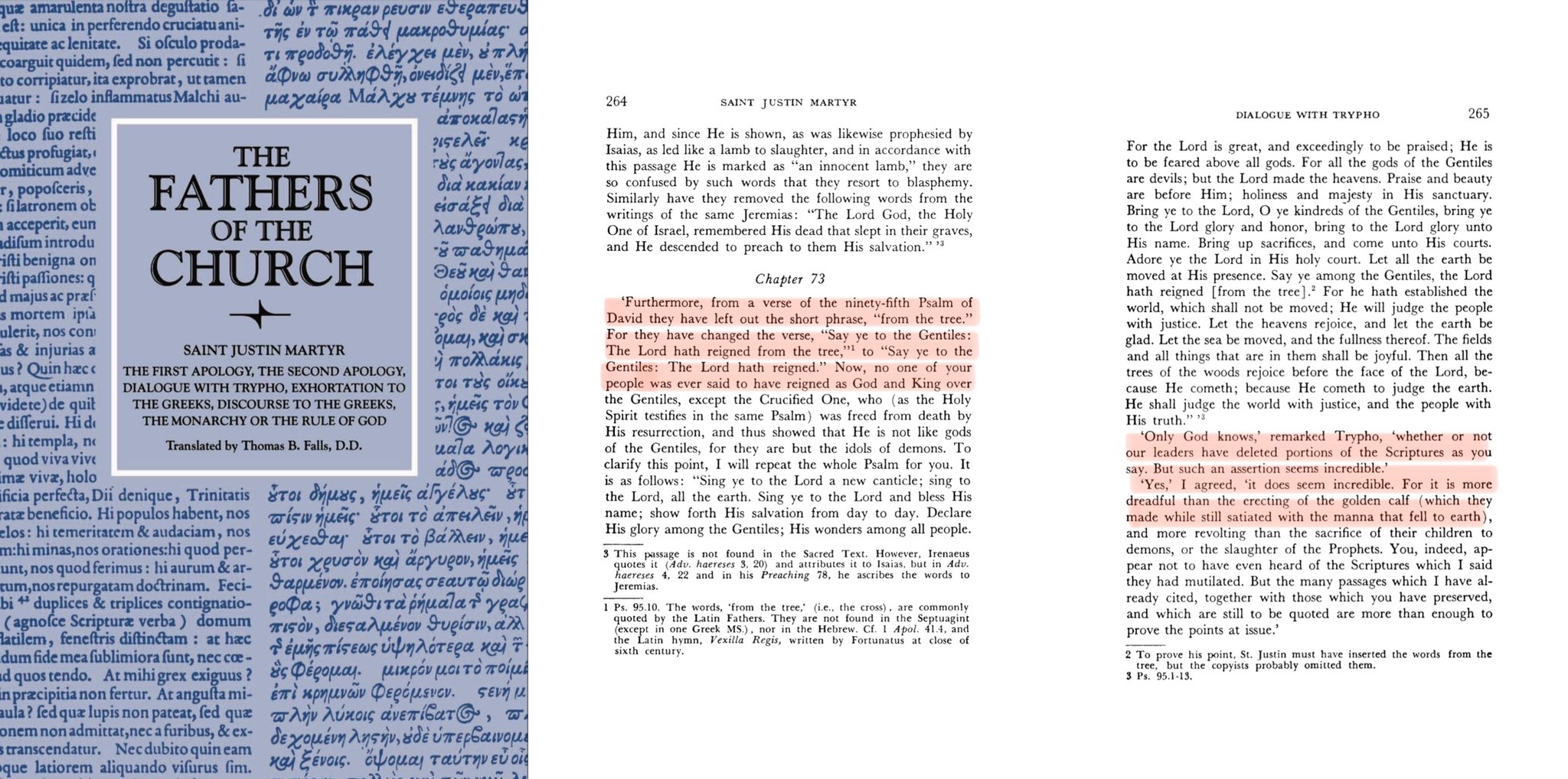 (Saint) Justin Martyr (100-165CE) who is venerated in the EO , OO , Catholic , Lutheran and Anglican church believed in biblical corruption. He is the earliest Christian apologist. He says the biblical corruption of the Jews is worse than them worshipping the golden calf.
very interesting
https://youtu.be/G0jakZXApcg
https://youtu.be/AymnA526j9U
https://youtu.be/XKp4yWGTfXo
https://youtu.be/kX62bRIG-OI
(Saint) Justin Martyr (100-165CE) who is venerated in the EO , OO , Catholic , Lutheran and Anglican church believed in biblical corruption. He is the earliest Christian apologist. He says the biblical corruption of the Jews is worse than them worshipping the golden calf.
very interesting
https://youtu.be/G0jakZXApcg
https://youtu.be/AymnA526j9U
https://youtu.be/XKp4yWGTfXo
https://youtu.be/kX62bRIG-OI

 TRANSLATION
6.5 OLD TESTAMENT JEWISH CORRUPTION
This rubric shows what some church fathers and Christian scholars say accusing the Jews of removing or changing the verses in the Old Testament because of their profit or their negligence. If the Christians who are supposed to share the same book with the Jews say that, how to ask the Muslims to believe that the Bible is the pure word of God?
6.5.1 Justin Martyr: Jews Remove "Many Scriptures"
The first example is Justin Martyr (100-168 AD) who was a church father who says in his dialogue with Trypho (a Jew) that the Jews removed many scriptures:
"But I am far from putting confidence in your teachers, who refuse to admit that the interpretation made by the seventy elders (...) is correct; and they try to formulate another 169. And I want you to observe, that they have all removed many Scriptures (noXkáą ypowpac;) of the translations made by those seventy elders (...) but I proceed to continue my discussions by means of those passages that are still admitted by you (...) you contradict the proposition «Behold, a virgin concebird» (Is 7, 14], and they say that it should be read "Behold, a young concebird","
At the request of Trypho, who, unbelieving, asks him for an example of those Scriptures that he considers "removed", 171 Justin limited himself to citing a fragment of Ezra, another of Psalm 96, 10 (none of them are preserved in the current canons ) and two of Jeremias, of which one is preserved in the canon (Jr. 11, 19) and the other, unknown, presents an interesting parallelism with the doctrine of Christ's descent into Hell: "The Lord God remembered His dead people of Israel lay in the graves, and He came down to preach His own salvation to them" 112. (Dialogue with Trypho LXX to LXXII, source here and in English)
We see here that Justin accuses the Jews of changing the Bible for their benefit, which means that the Jews did not obey God in Deuteronomy 4:2 and changed His words.
6.5.2 John Chrysostom affirms the loss of many Biblical writings
John Chrysostom said about Matthew 2:23 speaking of a prophecy spoken by the prophets
about Jesus who "was to be called a Nazarene":
WHY IS JESUS CALLED A NAZARENE
But what prophet said that? Don't inquire curiously, don't waste time in overiguario. Because many books of the prophets have disappeared, as can be seen from the history of the Paralipomenos (Par 34,14ss), and it is because the Jews were negligent and continually fell into idolatry; hence some books were left to be lost, others tore them to pieces themselves. One is told by Jeremias (36,19), the other by the author of the fourth book of Kings, saying that after a long time, the book of Deuteronomy, which had been buried there and disappeared, was found with great difficulty (4 Kings 22,8). Now, if when the foreigner had not yet occupied their country, they abandoned the sacred books, much more after the foreign invasion.
(Homily on the Gospel of St. Matthew, St. John Chrysostom source here page 132 and English source ggul)
6.5.3 Adam Clarke: Mount Gerizim or al Monte Ebal
We find the following statement in Deuteronomy:
It will be when you have crossed the Jordan that you will establish these stones that I am commanding you today, on Mount Ebal, and you must plaster with plaster .."
On the other hand the Samaritan version contains:
...the stones that I command them to SET in Gerizim.
Adam Clarke, the famous Protestant scholar, says on page 817 of the first volume of his commentary:
The scholar Kennicott held that the Samaritan version was correct, while scholars
Parry and Verschuur claimed that the Hebrew version was authentic, but it is generally known
that Kennicott's own arguments are irrefutable, and people positively believe that the Jews,
of his enmity against the Samaritans, changed the text. (source here in English)
6.5.4 Conclusion
We found above that the Jews had no problem removing or changing the scriptures for their benefit against the Christians, the Samaritans and in other rubrics we will see examples against the Muslims regarding the offered son of Abraham.
These were some examples in the Christian works, and of course if we search further we will discover more examples. The ancient Islamic works speak of scriptures predicting the arrival of the Prophet Muhammad explicitly and they are not present in the Bible today. If Jews remove verses talking about Jesus and share the Old Testament with Christians, it would be easier to remove verses talking about Prophet Muhammad since Jews don't share the Bible with Muslims, and Christians would agree with them. So we cannot say that the Bible today contains the pure and correct word of God.
Sources:
Pages: 88-89
https://es.wikipedia.org/wiki/Justino_M%C3%A1rtir
https://www.ccel.org/ccel/schaff/anf01.viii.iv.lxxii.html
https://archive.org/stream/el-libro-de-la-sabidurc3ada-y/el-libro-de-la-sabidurc3ada-y_djvu.txt
https://es.scribd.com/doc/65897169/Homilias-sobre-el-Evangelio-de-San-Mateo-San-Juan-Crisostomo
https://www.ccel.org/ccel/schaff/npnf110.iii.IX.html
https://www.studylight.org/commentary/deuteronomy/27-4.html
Types of Scribal Changes:
Unintentional:
1) Parablepsis
2) homeoteleuton
3) homeoarchy
4) Dittography
5) Transposition
Intentional:
1) Antiadoptionistic
2) Antidocetistic
3) Antiseperationistic
4) Anti-jewish
5) Anti-Heretical
5) Heterodoxical
All of these changes happened at a mass scale in the early stages of the transmission of the new testament, the Problem is excaterbated when scribes are not trained (which was the case for 3 whole Centuries during early Christianity due to Christianity being a minority persecuted group with untrained Scribes copying Manuscripts, making many many changes)
Corruption Quotes:
Justin Martyr: (2nd Century Christian Apologist)
And I wish you to observe, that they [the Jews] have altogether taken away many Scriptures from the translations...
Origen: (3rd Century Church Father)
The differences among the manuscripts have become great, either through the negligence of some copyists or through the perverse audacity of others; they either neglect to check over what they have transcribed, or, in the process of checking, they make additions or deletions as they please.
Textual scholar Bruce Metzger quoted this passage, and then observed:
Origen suggests that perhaps all of the manuscripts existing in his day may have become corrupt.
Dionysius (2nd Century Bishop)
When my fellow-Christians invited me to write letters to them I did so. These the devil's apostles have filled with tares, taking away some things and adding others. For them the woe is reserved. Small wonder then if some have dared to tamper even with the word of the Lord himself, when they have conspired to mutilate my own humble efforts.
Celsus (2nd Century Philosopher)
Some believers, as though froma drinking bout, go so far as to oppose themselves and alter the original text of the gospel three or four or several times over, and they change its character to enable them to deny difficulties in face of criticism.
TRANSLATION
6.5 OLD TESTAMENT JEWISH CORRUPTION
This rubric shows what some church fathers and Christian scholars say accusing the Jews of removing or changing the verses in the Old Testament because of their profit or their negligence. If the Christians who are supposed to share the same book with the Jews say that, how to ask the Muslims to believe that the Bible is the pure word of God?
6.5.1 Justin Martyr: Jews Remove "Many Scriptures"
The first example is Justin Martyr (100-168 AD) who was a church father who says in his dialogue with Trypho (a Jew) that the Jews removed many scriptures:
"But I am far from putting confidence in your teachers, who refuse to admit that the interpretation made by the seventy elders (...) is correct; and they try to formulate another 169. And I want you to observe, that they have all removed many Scriptures (noXkáą ypowpac;) of the translations made by those seventy elders (...) but I proceed to continue my discussions by means of those passages that are still admitted by you (...) you contradict the proposition «Behold, a virgin concebird» (Is 7, 14], and they say that it should be read "Behold, a young concebird","
At the request of Trypho, who, unbelieving, asks him for an example of those Scriptures that he considers "removed", 171 Justin limited himself to citing a fragment of Ezra, another of Psalm 96, 10 (none of them are preserved in the current canons ) and two of Jeremias, of which one is preserved in the canon (Jr. 11, 19) and the other, unknown, presents an interesting parallelism with the doctrine of Christ's descent into Hell: "The Lord God remembered His dead people of Israel lay in the graves, and He came down to preach His own salvation to them" 112. (Dialogue with Trypho LXX to LXXII, source here and in English)
We see here that Justin accuses the Jews of changing the Bible for their benefit, which means that the Jews did not obey God in Deuteronomy 4:2 and changed His words.
6.5.2 John Chrysostom affirms the loss of many Biblical writings
John Chrysostom said about Matthew 2:23 speaking of a prophecy spoken by the prophets
about Jesus who "was to be called a Nazarene":
WHY IS JESUS CALLED A NAZARENE
But what prophet said that? Don't inquire curiously, don't waste time in overiguario. Because many books of the prophets have disappeared, as can be seen from the history of the Paralipomenos (Par 34,14ss), and it is because the Jews were negligent and continually fell into idolatry; hence some books were left to be lost, others tore them to pieces themselves. One is told by Jeremias (36,19), the other by the author of the fourth book of Kings, saying that after a long time, the book of Deuteronomy, which had been buried there and disappeared, was found with great difficulty (4 Kings 22,8). Now, if when the foreigner had not yet occupied their country, they abandoned the sacred books, much more after the foreign invasion.
(Homily on the Gospel of St. Matthew, St. John Chrysostom source here page 132 and English source ggul)
6.5.3 Adam Clarke: Mount Gerizim or al Monte Ebal
We find the following statement in Deuteronomy:
It will be when you have crossed the Jordan that you will establish these stones that I am commanding you today, on Mount Ebal, and you must plaster with plaster .."
On the other hand the Samaritan version contains:
...the stones that I command them to SET in Gerizim.
Adam Clarke, the famous Protestant scholar, says on page 817 of the first volume of his commentary:
The scholar Kennicott held that the Samaritan version was correct, while scholars
Parry and Verschuur claimed that the Hebrew version was authentic, but it is generally known
that Kennicott's own arguments are irrefutable, and people positively believe that the Jews,
of his enmity against the Samaritans, changed the text. (source here in English)
6.5.4 Conclusion
We found above that the Jews had no problem removing or changing the scriptures for their benefit against the Christians, the Samaritans and in other rubrics we will see examples against the Muslims regarding the offered son of Abraham.
These were some examples in the Christian works, and of course if we search further we will discover more examples. The ancient Islamic works speak of scriptures predicting the arrival of the Prophet Muhammad explicitly and they are not present in the Bible today. If Jews remove verses talking about Jesus and share the Old Testament with Christians, it would be easier to remove verses talking about Prophet Muhammad since Jews don't share the Bible with Muslims, and Christians would agree with them. So we cannot say that the Bible today contains the pure and correct word of God.
Sources:
Pages: 88-89
https://es.wikipedia.org/wiki/Justino_M%C3%A1rtir
https://www.ccel.org/ccel/schaff/anf01.viii.iv.lxxii.html
https://archive.org/stream/el-libro-de-la-sabidurc3ada-y/el-libro-de-la-sabidurc3ada-y_djvu.txt
https://es.scribd.com/doc/65897169/Homilias-sobre-el-Evangelio-de-San-Mateo-San-Juan-Crisostomo
https://www.ccel.org/ccel/schaff/npnf110.iii.IX.html
https://www.studylight.org/commentary/deuteronomy/27-4.html
Types of Scribal Changes:
Unintentional:
1) Parablepsis
2) homeoteleuton
3) homeoarchy
4) Dittography
5) Transposition
Intentional:
1) Antiadoptionistic
2) Antidocetistic
3) Antiseperationistic
4) Anti-jewish
5) Anti-Heretical
5) Heterodoxical
All of these changes happened at a mass scale in the early stages of the transmission of the new testament, the Problem is excaterbated when scribes are not trained (which was the case for 3 whole Centuries during early Christianity due to Christianity being a minority persecuted group with untrained Scribes copying Manuscripts, making many many changes)
Corruption Quotes:
Justin Martyr: (2nd Century Christian Apologist)
And I wish you to observe, that they [the Jews] have altogether taken away many Scriptures from the translations...
Origen: (3rd Century Church Father)
The differences among the manuscripts have become great, either through the negligence of some copyists or through the perverse audacity of others; they either neglect to check over what they have transcribed, or, in the process of checking, they make additions or deletions as they please.
Textual scholar Bruce Metzger quoted this passage, and then observed:
Origen suggests that perhaps all of the manuscripts existing in his day may have become corrupt.
Dionysius (2nd Century Bishop)
When my fellow-Christians invited me to write letters to them I did so. These the devil's apostles have filled with tares, taking away some things and adding others. For them the woe is reserved. Small wonder then if some have dared to tamper even with the word of the Lord himself, when they have conspired to mutilate my own humble efforts.
Celsus (2nd Century Philosopher)
Some believers, as though froma drinking bout, go so far as to oppose themselves and alter the original text of the gospel three or four or several times over, and they change its character to enable them to deny difficulties in face of criticism.
 Variation of different texts
In the Name of Allah, the Most Beneficent, the Most Merciful
Evidence of the corruption of the Bible
Ambrose, Bishop of Milan, testifies that heretics have corrupted the Bible manuscripts
Who’s Ambrose? Here’s a small biography
Variation of different texts
In the Name of Allah, the Most Beneficent, the Most Merciful
Evidence of the corruption of the Bible
Ambrose, Bishop of Milan, testifies that heretics have corrupted the Bible manuscripts
Who’s Ambrose? Here’s a small biography
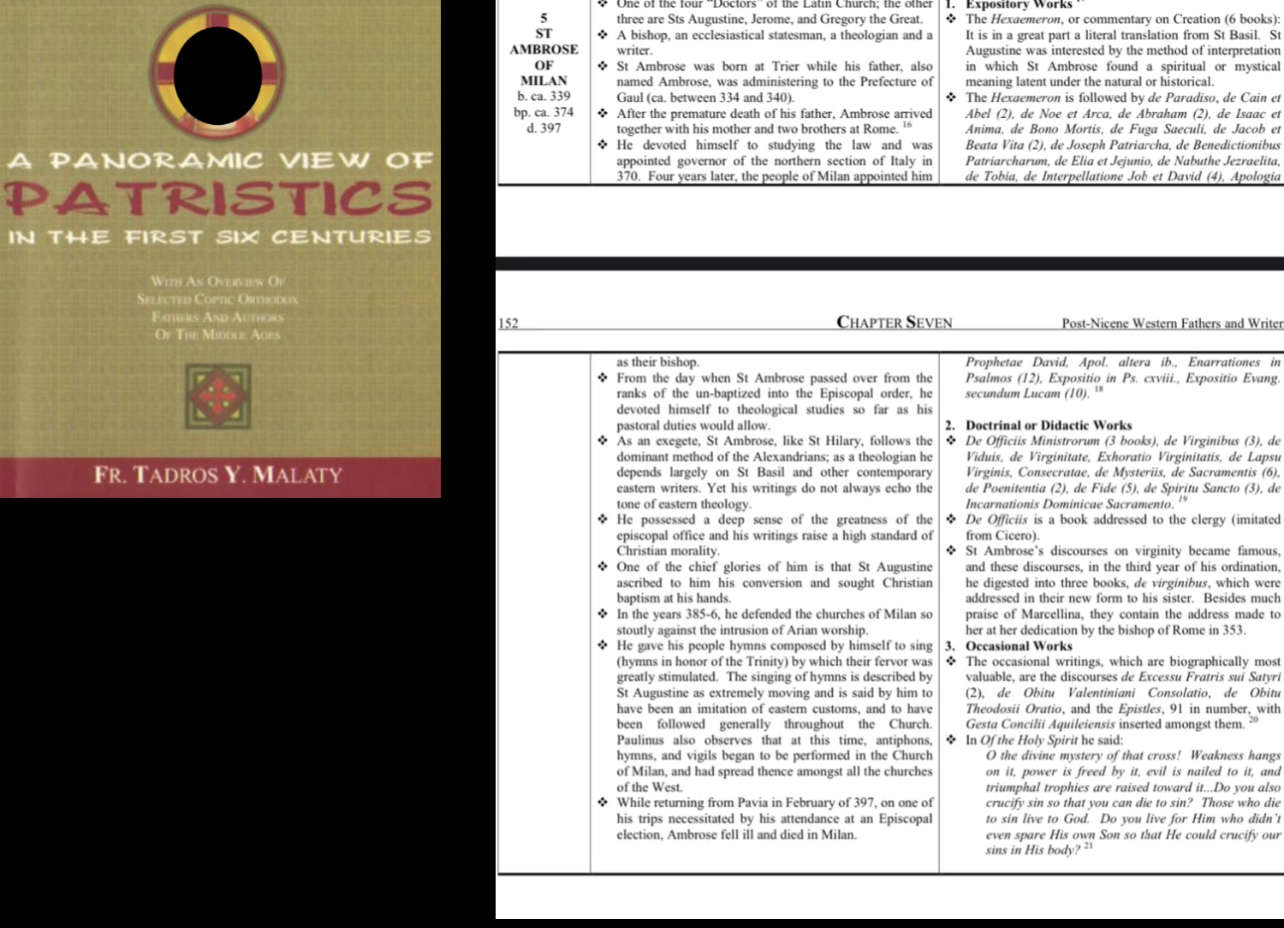 Now let’s see his testimony
the name of the book is "Exposition of Christian Faith"
or "On the Faith" by Ambrose
Book 5, chapter 16, paragraph 192 : See download link
https://www.ccel.org/ccel/s/schaff/npnf210/cache/npnf210.pdf
Now let’s see his testimony
the name of the book is "Exposition of Christian Faith"
or "On the Faith" by Ambrose
Book 5, chapter 16, paragraph 192 : See download link
https://www.ccel.org/ccel/s/schaff/npnf210/cache/npnf210.pdf
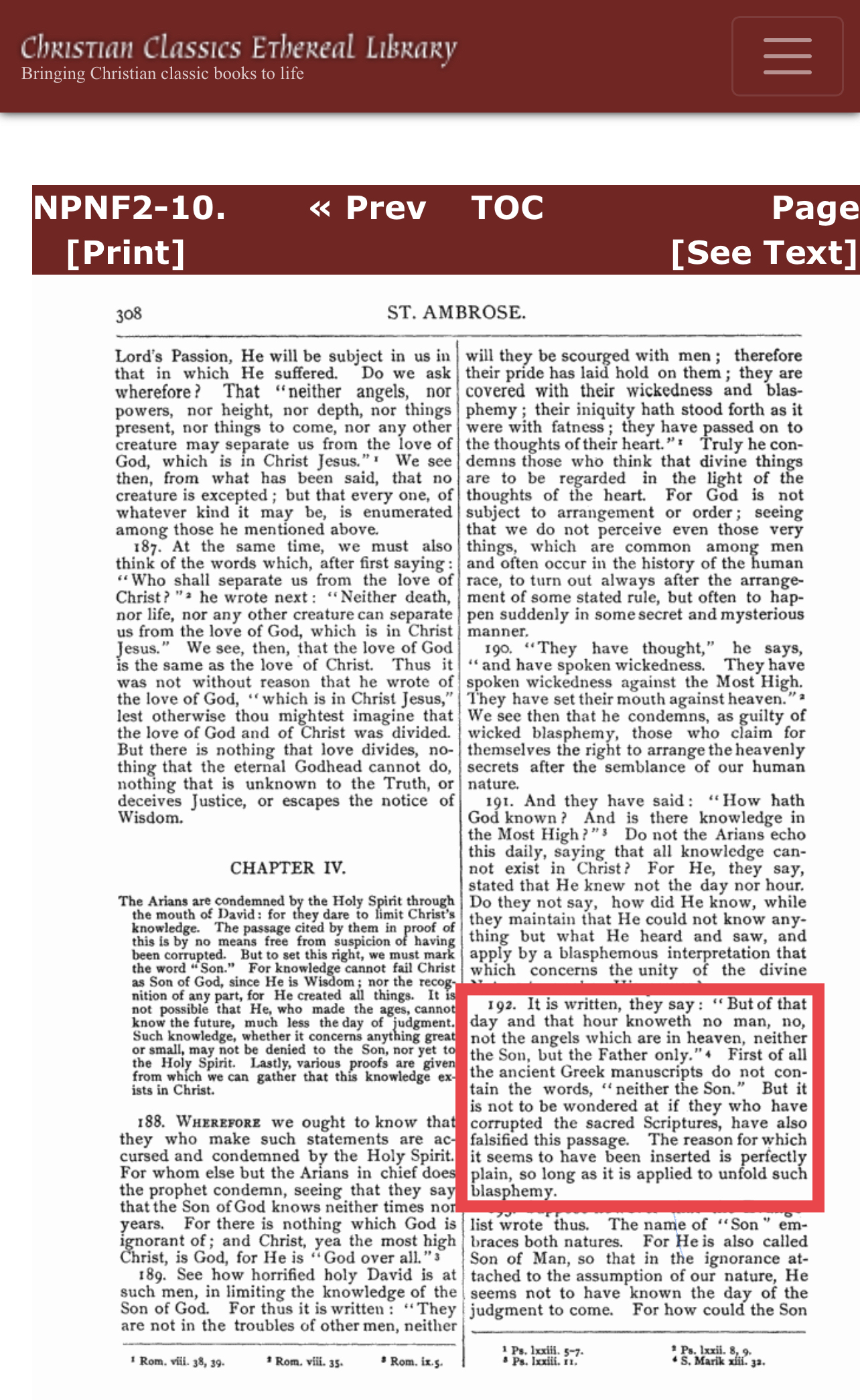 The most ancient available manuscript
containing the Gospel of Mark is Codex Sinaiticu
However, Codex Sinaiticus
And in Codex Vaticanus,
the Codex Alexandrinus,
Codex Washingtonensis, Codex Bezae
and almost all manuscripts contain "nor the Son" variant with the exception of a few late manuscripts which can be counted on the fingers of two hands at most These late, even very late manuscripts, from the 10th century for example These ones don't contain the expression
" nor the Son"
Ambrose, Bishop of Milan considered manuscripts with the phrase "nor the Son" as corrupt manuscripts this is a disaster because corruption at early centuries was spread through manuscripts and translations until modern days
Analyzation: First : Ambrose testifies that there were heretics, or forgers
who distorted the Scriptures to spread
through them blasphemy, impiety and heresy Ok thenSecond : We have to consider two hypotheses:Is the statement of Ambrose, bishop of Milan aboutthe phrase "nor the Son"in Mark 13:32 accurate or not ? For either the statement is accurate or not If his statement is accurate then all the ancient manuscripts which Ambrose mentioned are necessarily untraceable and lost Ambrose, referring to ancient manuscripts, certainly means manuscripts of the 3rd and 4th centuries And since there are surviving manuscripts
from the 4th century ie C. Sinaiticus and C. Vaticanus as we said above and both have the phrase "nor the Son" So, if Ambrose is telling the truth about these manuscripts, none of these manuscripts have survived Third : and that would be a real disaster for Christians
The heretics succeeded in diffusing
their heresy, blasphemy and impiety in the Bible to such an extent that the current Bible,
be it the Van Dyck Bible or any other accredited Bible contains blasphemy, heresy and impiety
and this absolutely blows away
all authenticity and reliability of the Bible
Now, assuming Ambrose knowingly lied
that is, he knew that the phrase "nor the Son" in
the text of Mark 13:32 is present in ancient manuscripts and he lies by denying that the phrase exists in the old manuscripts to evade the difficulty we have at least an explicit admission from him that the phrase "nor the Son" is heresy, impiety and blasphemy
Another important deduction :
Let us emphasize this statement of Ambrose :
"But it is not to be wondered at if they who have corrupted the sacred Scriptures have ALSO falsified this passage"
This means that what Ambrose exposes here
is only a sample of the corruption committed by heretics in the Holy Scriptures
This is just one example, among many,
of the acts of corruption
committed by heretics in the Holy Scriptures
This is enough for the present issue
Problem of the absence of punctuation marks in the early manuscripts
The most ancient available manuscript
containing the Gospel of Mark is Codex Sinaiticu
However, Codex Sinaiticus
And in Codex Vaticanus,
the Codex Alexandrinus,
Codex Washingtonensis, Codex Bezae
and almost all manuscripts contain "nor the Son" variant with the exception of a few late manuscripts which can be counted on the fingers of two hands at most These late, even very late manuscripts, from the 10th century for example These ones don't contain the expression
" nor the Son"
Ambrose, Bishop of Milan considered manuscripts with the phrase "nor the Son" as corrupt manuscripts this is a disaster because corruption at early centuries was spread through manuscripts and translations until modern days
Analyzation: First : Ambrose testifies that there were heretics, or forgers
who distorted the Scriptures to spread
through them blasphemy, impiety and heresy Ok thenSecond : We have to consider two hypotheses:Is the statement of Ambrose, bishop of Milan aboutthe phrase "nor the Son"in Mark 13:32 accurate or not ? For either the statement is accurate or not If his statement is accurate then all the ancient manuscripts which Ambrose mentioned are necessarily untraceable and lost Ambrose, referring to ancient manuscripts, certainly means manuscripts of the 3rd and 4th centuries And since there are surviving manuscripts
from the 4th century ie C. Sinaiticus and C. Vaticanus as we said above and both have the phrase "nor the Son" So, if Ambrose is telling the truth about these manuscripts, none of these manuscripts have survived Third : and that would be a real disaster for Christians
The heretics succeeded in diffusing
their heresy, blasphemy and impiety in the Bible to such an extent that the current Bible,
be it the Van Dyck Bible or any other accredited Bible contains blasphemy, heresy and impiety
and this absolutely blows away
all authenticity and reliability of the Bible
Now, assuming Ambrose knowingly lied
that is, he knew that the phrase "nor the Son" in
the text of Mark 13:32 is present in ancient manuscripts and he lies by denying that the phrase exists in the old manuscripts to evade the difficulty we have at least an explicit admission from him that the phrase "nor the Son" is heresy, impiety and blasphemy
Another important deduction :
Let us emphasize this statement of Ambrose :
"But it is not to be wondered at if they who have corrupted the sacred Scriptures have ALSO falsified this passage"
This means that what Ambrose exposes here
is only a sample of the corruption committed by heretics in the Holy Scriptures
This is just one example, among many,
of the acts of corruption
committed by heretics in the Holy Scriptures
This is enough for the present issue
Problem of the absence of punctuation marks in the early manuscripts

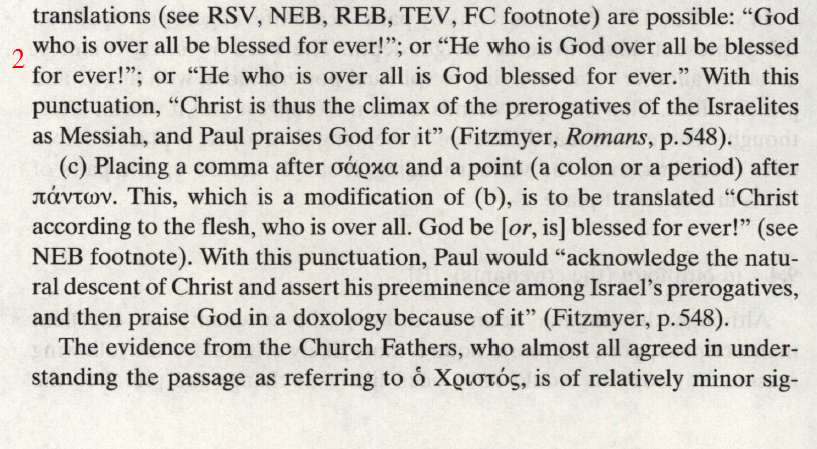

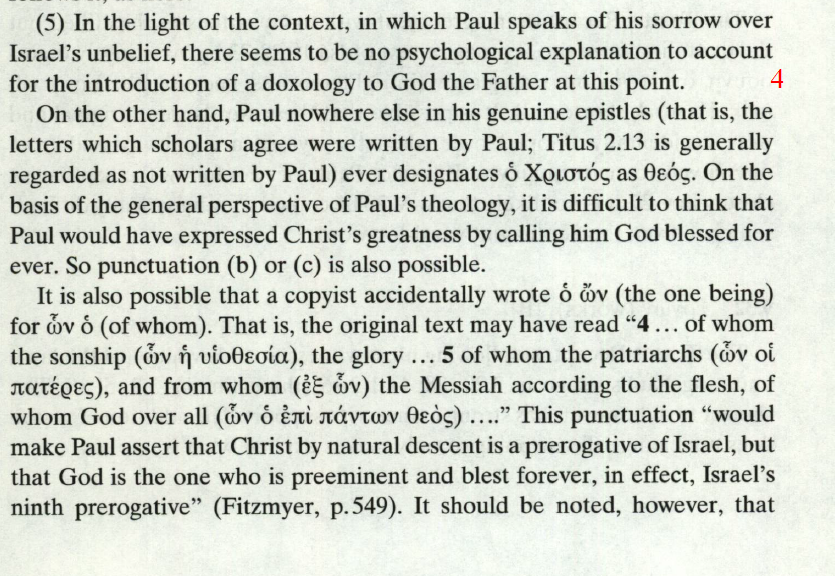
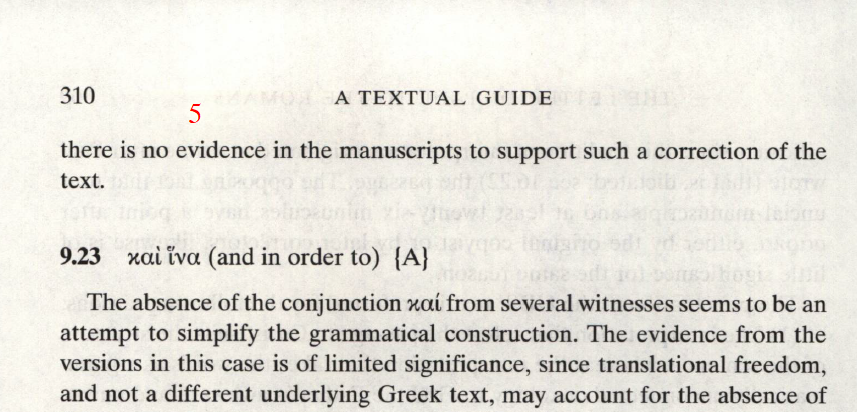 Received text problems: Manuscripts used by Erasmus: amount + date + badness:
New Testament Tools and Studies Edited by Bruce M. Metzger, Ph.D., D.D., L.H.D.,D. Theol., D. Litt.
Professor of New Testament Language and Literature, Emeritus Princeton Theological Seminary and
Corresponding Fellow of the British Academy and ,Bart D. Ehrman, Ph.D. James A. Gray, Distinguished
Professor of Religious Studies University of North Carolina at Chapel Hill,PG335-336
Received text problems: Manuscripts used by Erasmus: amount + date + badness:
New Testament Tools and Studies Edited by Bruce M. Metzger, Ph.D., D.D., L.H.D.,D. Theol., D. Litt.
Professor of New Testament Language and Literature, Emeritus Princeton Theological Seminary and
Corresponding Fellow of the British Academy and ,Bart D. Ehrman, Ph.D. James A. Gray, Distinguished
Professor of Religious Studies University of North Carolina at Chapel Hill,PG335-336
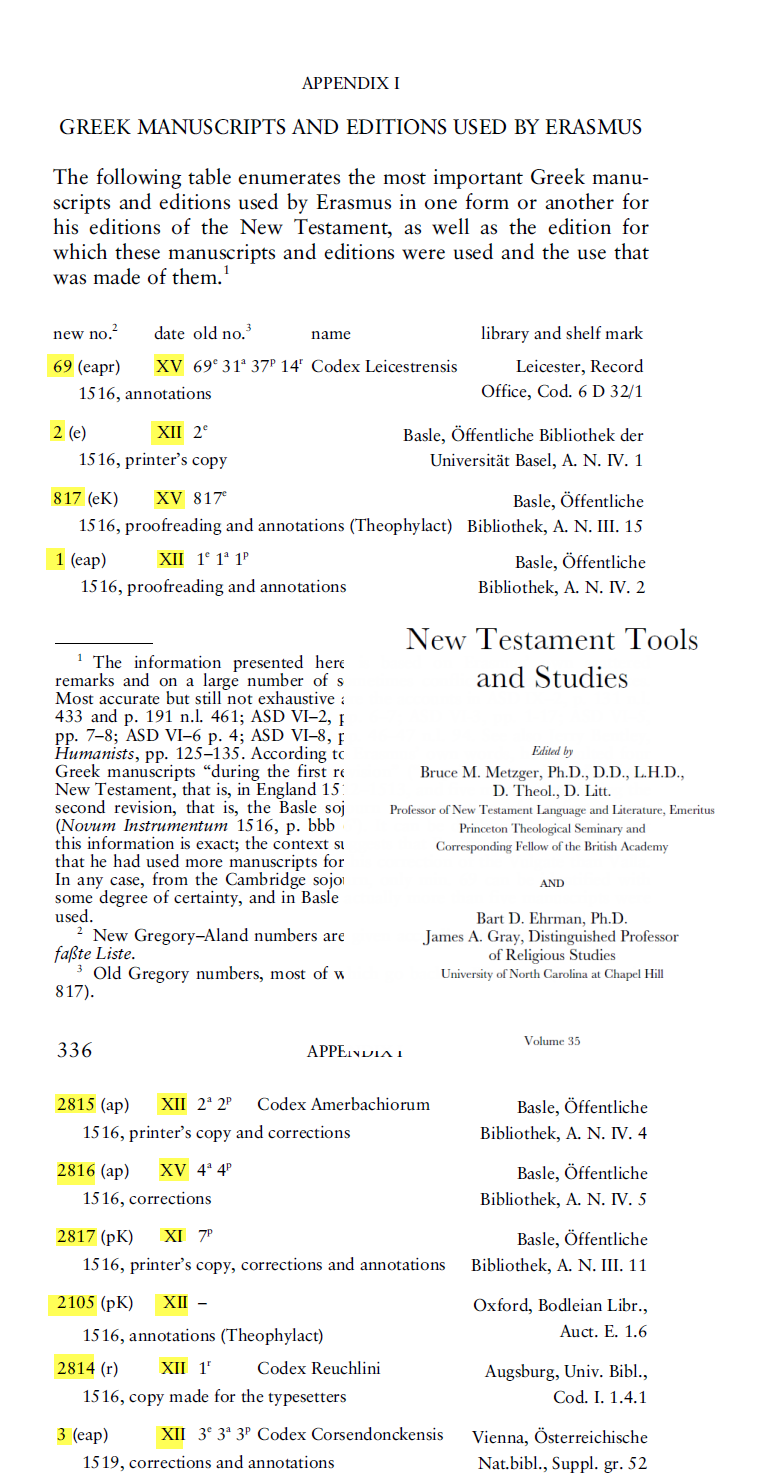 [Yet great progress had been made since the day when Erasmus could base an edition of the text on five or fewer manuscripts.]
The text of the new testament pg.7
“But because of the paucity of Greek manuscripts, and in particular the lack of those Greek manuscripts in which he would perceive the origin of the Latin readings, it was difficult for him to take a decision.”
Beyond What Is Written, Erasmus and Beza as Conjectural Critics of the New Testament, by Jan Krans, pg27. (2006)
(The most serious defect of the first edition of the Greek New Testament was not so much its innumerable errors2 as the type of text it represented. Erasmus relied on manuscripts of the twelfth/thirteenth century which represented the Byzantine Imperial text, the Koine text, or the Majority text — however it may be known3—the most recent and the poorest of the various New Testament text types, and his successors have done the same. This was the dominant form of
the text in the fourteenth/fifteenth century manuscript tradition, and even where earlier uncial manuscripts were available they were not consulted.
-------
2. many of these were pointed out to Erasmus by his contemporaries; a nineteenth century
critic in England called it the least carefully printed book ever published.
3. For these terms, cf. p. 66, etc.)
The text of the New Testament pg4
"The defects of King James's Version are many.
1- It was not rendered directly from the original Greek of the New Testament, but was really collated from several English versions, most of which were themselves translations from the Latin. It therefore necessarily misses the finer shades of meaning in the Greek, for it has been well said that "the Greek can draw a clear line where other languages can only make a blot". It would be impossible for a translation of a translation to be a
faithful rendering. Professedly translated from the same Greek text as Luther's, it was mostly from a recension collated by Erasmus in 1516, and Robert Stephens in 1550, from manuscripts no older than the tenth century, and was mainly a revision of several older English versions nearly all from the Latin Vulgate, or Beza's Latin version. We have closely examined a version of S. Tomson, dated 1587, 25 years before King James's saw the light, and find the two to be almost word for word.
2- But even if the Established Version had been a faithful translation of the Greek manuscripts of the New Testament then accessible, it would have been defective, for there were then but eight known and available, none of which were older than the
tenth century, and not one of superior critical value. The book of revelation had but one, and that an incomplete MS., and the missing portions liad to be supplied from the Latin Vulgate. Since then the number of known MSS. has been increased to more than 1,700, besides versions in Latin, Syriac, Coptic and Gothic, dating from two to four centuries after Christ, which contain 150,000 variations from each other. This fact alone should call for a translation from a text made after the most careful and critical collation."
The New Covenant : containing : I. An accurate translation of the New Testament : II. A harmony of the four Gospels : III. A chronological arrangement of the text : IV. A brief and handy commentary by Hanson, J. W. (John Wesley), 1823-1901; Universalist Publishing House; Massachusetts Bible Society, pg 7-8
"The received text rests on a handful of late manuscripts and contains speculative
readings, attested in no existing manuscript, made by Erasmus in his edition of the Greek New Testament of 1516. In spite of the reverence subsequently accorded Erasmus' text, it contains many erroneous and late readings."
The Five Gospels .,The Search for the Authentic Words of Jesus.,pg 8 .,by: Robert W. Funk,Westar Institute
Julian V. Hills,Marquette University
Translation Panel, Harold Attridge University of Notre Dame
Edward F. Beutner,Westar Institute
J. Dominic Crossan,DePaul University
Jon B. Daniels,Defiance College
Arthur J. Dewey,Xavier University
Robert T. Fortna,Vassar College
Ronald F. Hock,University of Southern California Editors, Apocryphal Gospels,Ron Cameron Wesleyan University
Karen L. King,Occidental College
Roy W. Hoover,Whitman College
Arland D. Jacobson,Concordia College JohnS. Kloppenborg,University of Toronto Helmut Koester,Harvard University
Lane C. McGaughy,Willamette University Marvin W. Meyer,Chapman College Robert J. Miller,Midway College
·Stephen J. Patterson,Eden Theological Seminary Daryl D. Schmidt,Texas Christian University Bernard Brandon Scott Phillips Graduate Seminary Chris Shea,Ball State University
Mahlon H. Smith,Rutgers University
"Erasmus simply used about a half dozen late manuscripts that were available to him."
The Majority Text and the Original Text: Are They Identical? Daniel B. Wallace , June 3rd 2004.
https://bible.org/article/majority-text-and-original-text-are-they-identical
"If the TR equals the original text, then the editor must have been just as inspired as the original writers, for he not only selected what readings were to go in this first published edition, but he also created some of the readings. To be specific, the last leaf of Erasmus’ copy of Revelation was missing, so he “back-translated” from Latin
into Greek and thereby created numerous readings which have never been found in any Greek manuscript. This should cause some pause to those conservative Protestants who hail Erasmus’ text as identical with the original, for such a view implies that revelation continued into at least the sixteenth century."
Inspiration, Preservation, and New Testament Textual Criticism,26-june-2004
https://bible.org/article/inspiration-preservation-and-new-testament-textual-criticism
[One must admit that the Vulgate contained a more reliable text of the New
Testament than Erasmus’ Greek manuscripts.]
Beyond What Is Written, Erasmus and Beza as Conjectural Critics of the New Testament, by Jan Krans, intro., pg15. (2006)
[In the early 1970’s, work commenced in the production of a Majority based text of the Greek New Testament. This edition was the work of various Western textual scholars led by Prof. Zane C. Hodges and Arthur L. Farstad. In 1982, the 1st edition of this text was published by Thomas Nelson Publishers. It would later undergo minor revision for a second printing in 1985. The text of the edition departed in less than two thousand total variations from the textus receptus.] Introduction to the BGNT,Historical Background of Byzantine NT MSS.
( this is no doubt partially due to the TR besing originally based on very narrow manuscript foundation)
The greek new testament according to the majority text,second edition,edited by ;ZANE C. HODGES&ARTHUR L. FARSTAD,preface pg7.
(It is often stated that textual criticism of the Bible ends when the era of printed books begins; from that time on, there is no new evidence available. This is largely true — but not entirely. It is true enough that the first printed New Testament, Erasmusʼs edition which eventually led to the Textus Receptus, is derived from manuscripts we know, and thus it has no value. The earliest printed Latin Bible is almost equally useless; while the
source manuscripts are not known, the text is late.)
The Encyclopedia of New Testament Textual Criticism by Robert B. Waltz Inspired by Rich Elliott ,Last Preliminary Edition,pg 44
the Byzantine text has hundreds of splits where no clear majority emerges.
THE TEXT OF THE NEW TESTAMENT IN CONTEMPORARY RESEARCH., CHAPI'ER 19 THE MAJORITY TEXT THEORY:
HISTORY, METHODS, AND CRITQUE., Daniel B. Wallace., pg. 315
Aland found fifty-two variants within the Majority text in the space of two
verses!
THE TEXT OF THE NEW TESTAMENT IN CONTEMPORARY RESEARCH., CHAPI'ER 19 THE MAJORITY TEXT THEORY:
HISTORY, METHODS, AND CRITQUE., Daniel B. Wallace., pg. 315
"The majority of the MSS do not always have a text which is identical to the
TR"
REVIEW ARTICLE., The Greek New Testament According to the Majority Text., DANIEL B. WALLACE., pg120
In Conclusion: most Christians are reading a very bad text of the Bible due to its small amount, late and poor manuscripts. (Note: there’s so much to be said about this and more problems but for now this is enough)
———————————————————
The book catches all the false arguments and lies of those who are silly: 1. The lie of the existence of the original copies, and the duration of their existence. 2. Myth comparing the number of manuscripts of the New Testament to the rest of the writings such as writings Philosophers and others 3. The myth of giving manuscripts a false date (important) 4. Does the history of the manuscript have any value?!!! 5. Myths Regarding Correction Processes (Sinaiticus is Full of Errors) 6. Myth that the differences(variants) are not important 7- Myths related to patristic quotations and the role of the patriarchs in textual criticism 8. Myths related to translations of the New Testament and their value (we have Latin manuscripts from the second century!!) 9. Myths related to modern printed copies
[Yet great progress had been made since the day when Erasmus could base an edition of the text on five or fewer manuscripts.]
The text of the new testament pg.7
“But because of the paucity of Greek manuscripts, and in particular the lack of those Greek manuscripts in which he would perceive the origin of the Latin readings, it was difficult for him to take a decision.”
Beyond What Is Written, Erasmus and Beza as Conjectural Critics of the New Testament, by Jan Krans, pg27. (2006)
(The most serious defect of the first edition of the Greek New Testament was not so much its innumerable errors2 as the type of text it represented. Erasmus relied on manuscripts of the twelfth/thirteenth century which represented the Byzantine Imperial text, the Koine text, or the Majority text — however it may be known3—the most recent and the poorest of the various New Testament text types, and his successors have done the same. This was the dominant form of
the text in the fourteenth/fifteenth century manuscript tradition, and even where earlier uncial manuscripts were available they were not consulted.
-------
2. many of these were pointed out to Erasmus by his contemporaries; a nineteenth century
critic in England called it the least carefully printed book ever published.
3. For these terms, cf. p. 66, etc.)
The text of the New Testament pg4
"The defects of King James's Version are many.
1- It was not rendered directly from the original Greek of the New Testament, but was really collated from several English versions, most of which were themselves translations from the Latin. It therefore necessarily misses the finer shades of meaning in the Greek, for it has been well said that "the Greek can draw a clear line where other languages can only make a blot". It would be impossible for a translation of a translation to be a
faithful rendering. Professedly translated from the same Greek text as Luther's, it was mostly from a recension collated by Erasmus in 1516, and Robert Stephens in 1550, from manuscripts no older than the tenth century, and was mainly a revision of several older English versions nearly all from the Latin Vulgate, or Beza's Latin version. We have closely examined a version of S. Tomson, dated 1587, 25 years before King James's saw the light, and find the two to be almost word for word.
2- But even if the Established Version had been a faithful translation of the Greek manuscripts of the New Testament then accessible, it would have been defective, for there were then but eight known and available, none of which were older than the
tenth century, and not one of superior critical value. The book of revelation had but one, and that an incomplete MS., and the missing portions liad to be supplied from the Latin Vulgate. Since then the number of known MSS. has been increased to more than 1,700, besides versions in Latin, Syriac, Coptic and Gothic, dating from two to four centuries after Christ, which contain 150,000 variations from each other. This fact alone should call for a translation from a text made after the most careful and critical collation."
The New Covenant : containing : I. An accurate translation of the New Testament : II. A harmony of the four Gospels : III. A chronological arrangement of the text : IV. A brief and handy commentary by Hanson, J. W. (John Wesley), 1823-1901; Universalist Publishing House; Massachusetts Bible Society, pg 7-8
"The received text rests on a handful of late manuscripts and contains speculative
readings, attested in no existing manuscript, made by Erasmus in his edition of the Greek New Testament of 1516. In spite of the reverence subsequently accorded Erasmus' text, it contains many erroneous and late readings."
The Five Gospels .,The Search for the Authentic Words of Jesus.,pg 8 .,by: Robert W. Funk,Westar Institute
Julian V. Hills,Marquette University
Translation Panel, Harold Attridge University of Notre Dame
Edward F. Beutner,Westar Institute
J. Dominic Crossan,DePaul University
Jon B. Daniels,Defiance College
Arthur J. Dewey,Xavier University
Robert T. Fortna,Vassar College
Ronald F. Hock,University of Southern California Editors, Apocryphal Gospels,Ron Cameron Wesleyan University
Karen L. King,Occidental College
Roy W. Hoover,Whitman College
Arland D. Jacobson,Concordia College JohnS. Kloppenborg,University of Toronto Helmut Koester,Harvard University
Lane C. McGaughy,Willamette University Marvin W. Meyer,Chapman College Robert J. Miller,Midway College
·Stephen J. Patterson,Eden Theological Seminary Daryl D. Schmidt,Texas Christian University Bernard Brandon Scott Phillips Graduate Seminary Chris Shea,Ball State University
Mahlon H. Smith,Rutgers University
"Erasmus simply used about a half dozen late manuscripts that were available to him."
The Majority Text and the Original Text: Are They Identical? Daniel B. Wallace , June 3rd 2004.
https://bible.org/article/majority-text-and-original-text-are-they-identical
"If the TR equals the original text, then the editor must have been just as inspired as the original writers, for he not only selected what readings were to go in this first published edition, but he also created some of the readings. To be specific, the last leaf of Erasmus’ copy of Revelation was missing, so he “back-translated” from Latin
into Greek and thereby created numerous readings which have never been found in any Greek manuscript. This should cause some pause to those conservative Protestants who hail Erasmus’ text as identical with the original, for such a view implies that revelation continued into at least the sixteenth century."
Inspiration, Preservation, and New Testament Textual Criticism,26-june-2004
https://bible.org/article/inspiration-preservation-and-new-testament-textual-criticism
[One must admit that the Vulgate contained a more reliable text of the New
Testament than Erasmus’ Greek manuscripts.]
Beyond What Is Written, Erasmus and Beza as Conjectural Critics of the New Testament, by Jan Krans, intro., pg15. (2006)
[In the early 1970’s, work commenced in the production of a Majority based text of the Greek New Testament. This edition was the work of various Western textual scholars led by Prof. Zane C. Hodges and Arthur L. Farstad. In 1982, the 1st edition of this text was published by Thomas Nelson Publishers. It would later undergo minor revision for a second printing in 1985. The text of the edition departed in less than two thousand total variations from the textus receptus.] Introduction to the BGNT,Historical Background of Byzantine NT MSS.
( this is no doubt partially due to the TR besing originally based on very narrow manuscript foundation)
The greek new testament according to the majority text,second edition,edited by ;ZANE C. HODGES&ARTHUR L. FARSTAD,preface pg7.
(It is often stated that textual criticism of the Bible ends when the era of printed books begins; from that time on, there is no new evidence available. This is largely true — but not entirely. It is true enough that the first printed New Testament, Erasmusʼs edition which eventually led to the Textus Receptus, is derived from manuscripts we know, and thus it has no value. The earliest printed Latin Bible is almost equally useless; while the
source manuscripts are not known, the text is late.)
The Encyclopedia of New Testament Textual Criticism by Robert B. Waltz Inspired by Rich Elliott ,Last Preliminary Edition,pg 44
the Byzantine text has hundreds of splits where no clear majority emerges.
THE TEXT OF THE NEW TESTAMENT IN CONTEMPORARY RESEARCH., CHAPI'ER 19 THE MAJORITY TEXT THEORY:
HISTORY, METHODS, AND CRITQUE., Daniel B. Wallace., pg. 315
Aland found fifty-two variants within the Majority text in the space of two
verses!
THE TEXT OF THE NEW TESTAMENT IN CONTEMPORARY RESEARCH., CHAPI'ER 19 THE MAJORITY TEXT THEORY:
HISTORY, METHODS, AND CRITQUE., Daniel B. Wallace., pg. 315
"The majority of the MSS do not always have a text which is identical to the
TR"
REVIEW ARTICLE., The Greek New Testament According to the Majority Text., DANIEL B. WALLACE., pg120
In Conclusion: most Christians are reading a very bad text of the Bible due to its small amount, late and poor manuscripts. (Note: there’s so much to be said about this and more problems but for now this is enough)
———————————————————
The book catches all the false arguments and lies of those who are silly: 1. The lie of the existence of the original copies, and the duration of their existence. 2. Myth comparing the number of manuscripts of the New Testament to the rest of the writings such as writings Philosophers and others 3. The myth of giving manuscripts a false date (important) 4. Does the history of the manuscript have any value?!!! 5. Myths Regarding Correction Processes (Sinaiticus is Full of Errors) 6. Myth that the differences(variants) are not important 7- Myths related to patristic quotations and the role of the patriarchs in textual criticism 8. Myths related to translations of the New Testament and their value (we have Latin manuscripts from the second century!!) 9. Myths related to modern printed copies
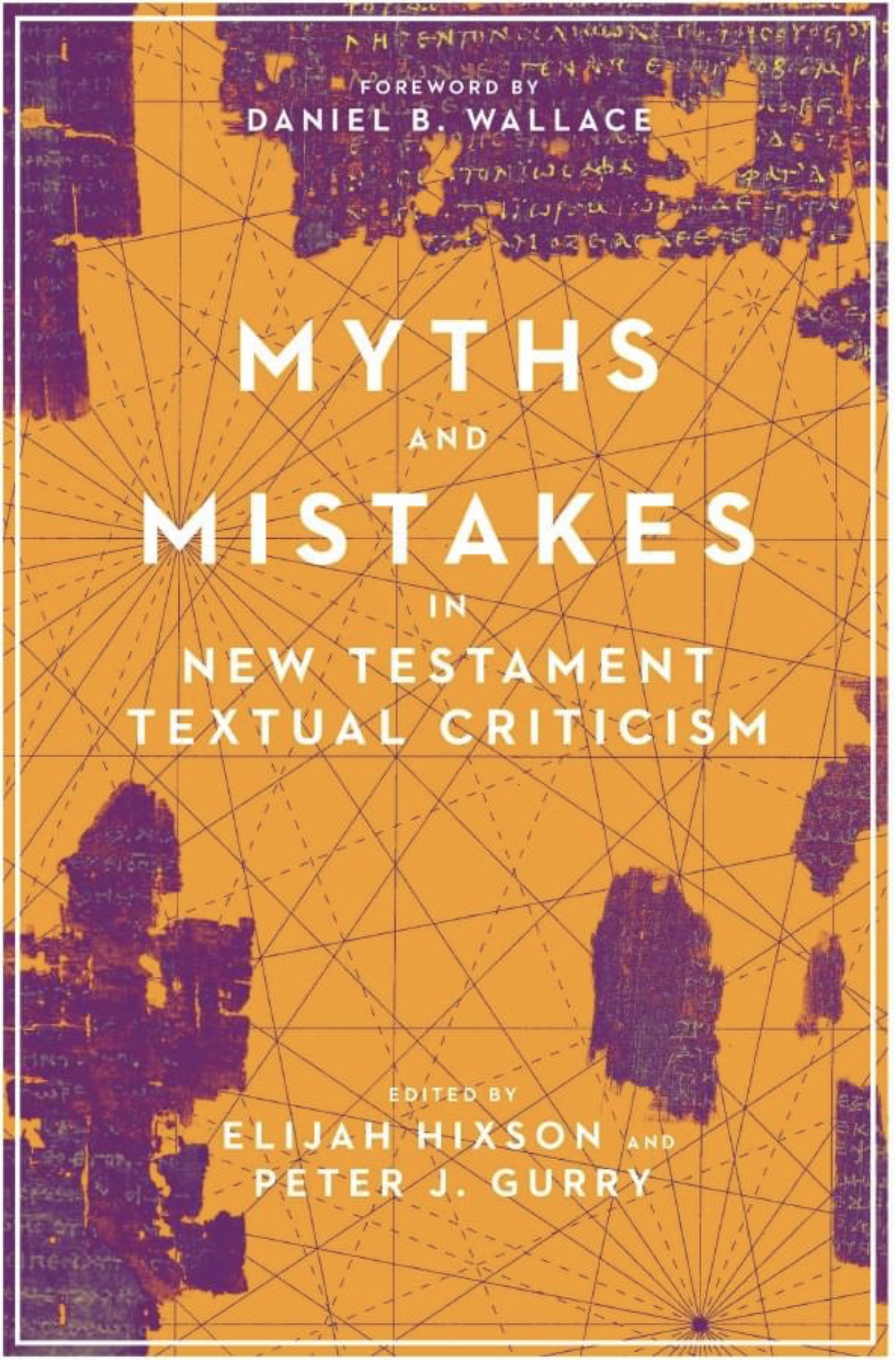 Those are common arguments used by Christians (when you discuss the preservation of the Bible with them you will at least see one of them)
———————————————————
This book compares King James Bible with the other translations, first writes the text as in the King James Version, then puts under it the text from other versions that contradict King James, but the corresponding versions do not put it, so it is understood from that that the rest of the 26 that are not put in comparison are in agreement with King JamesThose are common arguments used by Christians (when you discuss the preservation of the Bible with them you will at least see one of them)
Those are common arguments used by Christians (when you discuss the preservation of the Bible with them you will at least see one of them)
———————————————————
This book compares King James Bible with the other translations, first writes the text as in the King James Version, then puts under it the text from other versions that contradict King James, but the corresponding versions do not put it, so it is understood from that that the rest of the 26 that are not put in comparison are in agreement with King JamesThose are common arguments used by Christians (when you discuss the preservation of the Bible with them you will at least see one of them)
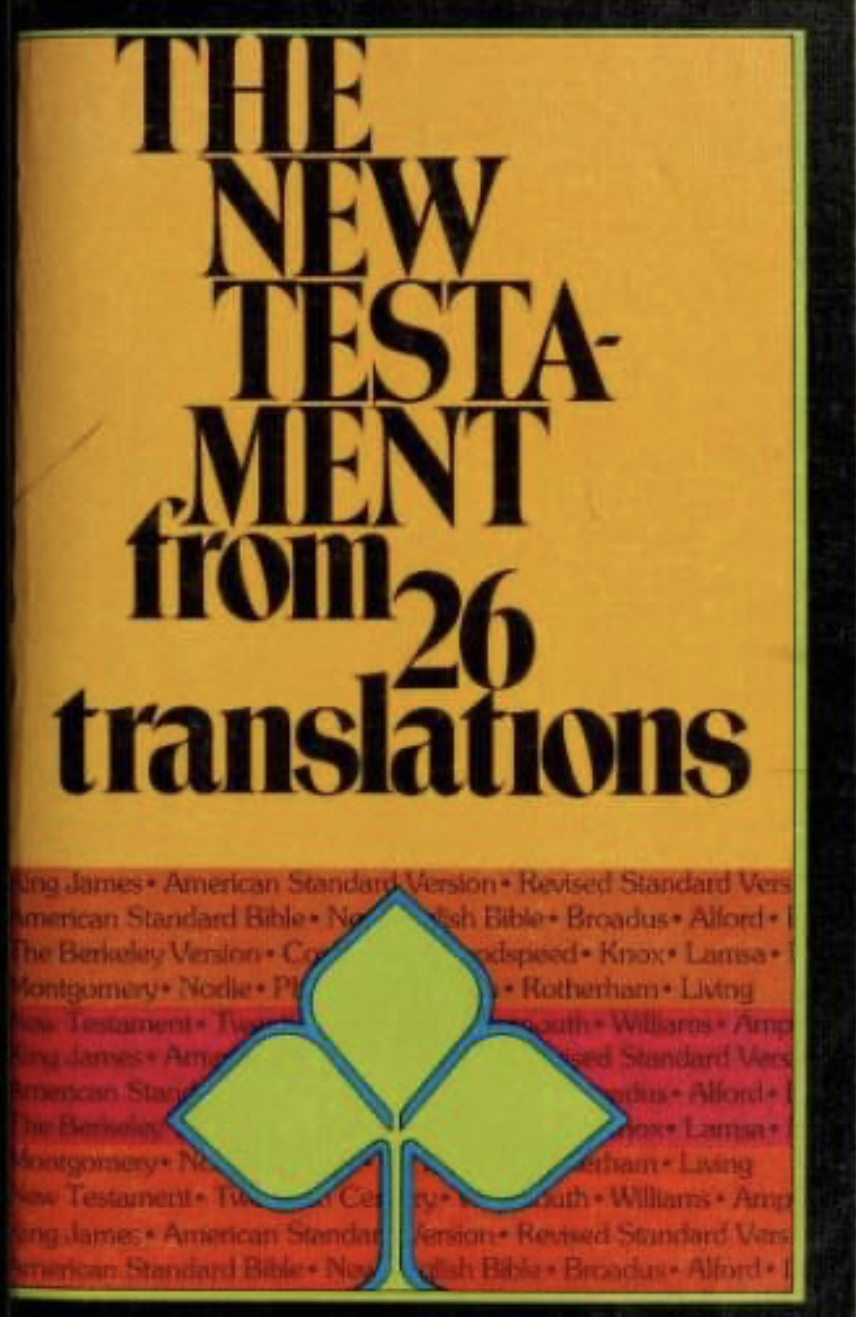 Note: translations differences are due to differences in manuscripts.
———————————————————
The Naṣārā used to believe in a form of the New Testament Text known as the "Textus Receptus". This was the text which Christians received from their Church Tradition and was believed to be the preserved Word of God
However, towards the era of biblical manuscript archeology and discovery, the unearthing of ancient biblical manuscripts such as Codex Sinaiticus, Vaticus, Alexandrinus, revealed something shocking
Every Significant Ancient Biblical Codex differed in terms of its verses and textual contents from the Text which Christians received from their tradition and what they believed in, meaning their tradition had been corrupted
Some Examples of Ancient Biblical Codecies and their textual differences from the "Textus Receptus":
New Testament Omissions
Codex Sinaiticus
Omitted: Matt. {12:47}, 16:3, 17:21, 18:11, 23:14, 24:35, Mark 1:33, 7:16, 9:44, 46, 10:36, 11:26, 15:28, 47, 16:9-20, Luke 10:32, {17:35}, 17:36, John 5:4, 7:53-8:11, 9:38, 16:15, {19:20}, 20:6, {21:25}, Acts {2:21}, 8:37, 15:24, 24:7, 28:29, Rom. {11:30}, 16:24, {1Cor. 2:15}, {Eph. 2:7}, {Heb. 4:9}.
Codex Alexandrinus
Omitted: Mark 15:28, Luke 17:36, 22:43-44, 23:17, {John 5:12}, Acts 8:37, 15:34, 24:7, 28:29, Rom. 11:12, 16:24, 1Cor. 6:3-6, 9:2, 16:19, Rev. 5:4.
Codex Vaticanus.
Omitted: Matt. 12:47, 16:3, 17:21, 18:11, 23:14, Mark 7:16, 9:44, 46, 11:26, 15:28, 16:9-20, Luke 17:36, 22:43-44, 23:17, John 5:4, 7:53-8:11, Acts 8:37, 15:34, 24:7, 28:29, Rom. 16:24, 1Pet. 5:3. Codex Ephraemi Rescriptus.
Omitted : Mark 9:44, 46, 11:26, 15:28, John 5:4, Acts 8:37, Rom. 8:1-2, 16:24.
Codex Bezae Cantabrigiensis.
Omitted: Matt. 5:20, 30, 9:34, 21:44, 23:14, Mark 15:28, Luke 3:30, 5:39, 11:32, 36, 12:21, 19:25, 33, 22:20, 24:12, 40, John 5:4, 8:46, 12:8, 15:3.
Codex Borgianus.
Omitted: Luke 22:43-44, 23:17, John 5:4, 7:53-8:11.
Codex Washingtonianus
Omitted: Matt. 4:21-22, Mark 1:43, 9:44, 46, 10:48, 11:26, Luke 3:24-38, 17:36, 19:25, 22:43-44, John 5:4, 12, 7:53-8:11, 9:38. Westcott, Brooke Foss and Fenton John Anthony Hort, The New Testament in the Original Greek, MacMillan and Co.: Cambridge, England, 1885
Omitted: Matt. 12:47, 16:3, 17:21, 18:11, 23:14, Mark 7:16, 9:44, 46, 11:26, 15:28, 16:9-20, Luke 17:36, 22:20, 43-44, 23:17, 24:12, 40, John 5:4, 7:53-8:11, Acts 8:37, 15:34, 24:7, 28:29, Rom. 16:24.
Institute for New Testament Textual Research, Novum Testamentum Graece: Nestle-Aland, 28th edition, German Bible Society: Berlin, Germany, 1993
Omitted: Matt. 17:21, 18:11, 23:14, Mark 7:16, 9:44, 46, 11:26, 15:28, 16:9-20, Luke 17:36, 22:43-44, 23:17, John 5:4, 7:53-8:11, Acts 8:37, 15:34, 24:7, 28:29, Rom. 16:24.
Holmes, Michael W., The Greek New Testament: SBL Edition, Society of Biblical Literature: Atlanta, GA, 2010
Omitted: Matt. 17:21, 18:11, 23:14, Mark 7:16, 9:44, 46, 11:26, 15:28, 16:9-20, Luke 17:36, 23:17, John 5:4, 7:53-8:11, Acts 8:37, 15:34, 24:7, 28:29, Rom. 16:25-27. Alan Bunning, Bunning Heuristic Prototype Greek New Testament, Center for New Testament Restoration: Lafayette, IN, 2012.
Omitted: Matt. 16:3, 17:21, 18:11, 23:14, Mark 7:16, 9:44, 46, 11:26, 15:28, 16:9-20, Luke 17:36, 22:43-44, 23:17, John 5:4, 7:53-8:11, Acts 8:37, 15:34, 24:7, 28:29, Rom. 16:24.
G. Pierpont, The New Testament in the Original Greek: Byzantine Textform 2005, Chilton Book Publishing: Southborough, MA, 2005 December 1.
Omitted: Luke 17:36, Acts 8:37, 15:34, 24:7.
[Source: Center for New Testament Restoration (https:// greekcntr.org)]
- Armour
———————————————————
Matthew 28:19 NIV
19 Therefore go and make disciples of all nations, baptizing them in the name of the Father and of the Son and of the Holy Spirit,
Oldest Greek manuscript containing the text = Codex Sinaiticus 325 AD
Time of writing of the Gospel attributed to Matthew = not earlier than 80 AD
Missing period between the original and the oldest manuscript = 325 - 80 = 245 years
The problem of baptizing by Jesus name:
Acts 2:38 NIV
38 Peter replied, “Repent and be baptized, every one of you, in the name of Jesus Christ for the forgiveness of your sins. And you will receive the gift of the Holy Spirit.
Acts 8:16 NIV
16 because the Holy Spirit had not yet come on any of them; they had simply been baptized in the name of the Lord Jesus.
Acts 10:48 NIV
48 So he ordered that they be baptized in the name of Jesus Christ. Then they asked Peter to stay with them for a few days
Acts 19:5 NIV
5 On hearing this, they were baptized in the name of the Lord Jesus.
All of those verses are contradicting Matthew 28:19 because they say by Jesus name only
Problem of Eusebius quotations:
Eusebius quoted Mathew 28:19 in the shorter version (17 times) before Nicea (325 CE)
The Proof of the Gospel (5 times)
Commentary in Psalms (4 times)
The Theophania (4 times)
Commentary in Isaiah (2 times)
History of the Church (1 time)
In Praise of Constantine (1 time)
The Proof of the Gospel, Vol. 1, edited and translated by W.J. Ferrar, 1981, page 157 ["Whereas He, who conceived nothing human or mortal, see how truly he speaks with the voice of God, saying in these very words to those disciples of His, the poorest of the poor: ’Go forth, and make disciples of all the nations.’ ‘But how,’ the disciples might reasonably have answered the Master, ‘can we do it?’... But while the disciples of Jesus were most likely either saying thus, or thinking thus, the Master solved their difficulties, by the addition of one phrase, saying they should triumph ‘IN MY NAME.’ For He did not bid them simply and indefinitely 'make disciples of all nations,' but with the necessary addition 'In My Name.' And the power of His Name being so great, that the Apostle says: 'God has given him a name which is above every name, that in the name of Jesus every knee should bow, of things in heaven, and things in earth, and things under the earth.' He showed the virtue of the power in His Name concealed from the crowd, when He said to His Disciples: 'Go, and make disciples of all nations in my name.']
The Proof of the Gospel, Vol. 1, edited and translated by W.J. Ferrar, 1981, page 152 ["But our Lord and Savior did not conceive and not dare to attempt, neither did he attempt and not succeed. With one voice He said to His disciples: 'Go and make disciples of all nation in My Name,' teaching them to observe all things whatsoever I have commanded you.' And He enjoined the effect of His Word; and in a little while every race of the Greek and Barbarians was being brought into discipleship."]
The Proof of the Gospel, Vol. 1, edited and translated by W.J. Ferrar, 1981, page 159 ["I am irresistibly forced to retrace my steps, and search for their cause, and to confess that they could only have succeeded in their daring venture, by a power more divine, and more strong than man's, and by the cooperation of Him Who said to them: 'Make Disciples of all nations in my Name.']
The Proof of the Gospel, Vol. 2, edited and translated by W.J. Ferrar, 1981, page 175 ["'For I came and there was no man, I called and there was none that heard.' And He says to them, 'The Kingdom of God shall be taken away from you, and shall be given to a nation bearing the fruits of it.' And He bid His own disciples after their rejection, 'Go ye make disciples of all the nations in my name.'"]
The Theophania from the Syriac, Text edited by Samuel Lee, London 1842. Cambridge 1843, page 333 ["But he who used nothing human or mortal, see how in truth he again conceded the oracle
of God, in the word which he spoke to his disciples, the weak ones, saying, 'Go ye and make disciples of all the peoples...' These things then (scil. how can we do this? how preach to the Romans, etc.) the disciples of our savior would either have said or thought; so by a simple addition of a word, he resolved the sum of those things of which they doubted, the sum of them he committed to them in that he said, ye conquer 'in my name.' For it was not that he ordered them simply and without discriminating, to 'go and make disciples of all the peoples,' but with the important addition, and he said 'in my name.' For because of the power of his name did all this come about, even as the Apostle said, God has given him a name more excellent than all names, that at the name of Jesus every knee should bow, which is in heaven and in earth and under the earth..."]
The Theophania from the Syriac, Text edited by Samuel Lee, London 1842. Cambridge 1843, page 336 ["The Disciples could not otherwise have undertaken this enterprise, than by a Divine power which exceeds that of man, and by the assistance of Him who said to them, 'Go, and make Disciples of all nations in my name.' And when he had said this to them, he attached to it the promise, by which they should be so encouraged, as readily to give themselves up to the things commanded. For he said unto them, "Behold I am with you always, even to the end of the world."]
The Theophania from the Syriac, Text edited by Samuel Lee, London 1842. Cambridge 1843, page 242 ["Our Savior said to them therefore, after His resurrection, 'Go ye and make Disciples of all nations in my name.
' And these things He said, who formerly had commanded: "In the way of the Gentiles go ye not," but enjoined them that they should preach to the Jews only. But, when these abused their inviters, then He dismissed the servants the second time, and said, "go ye out into the ways and paths, and all that ye find call to the feast."]
The Theophania from the Syriac, Text edited by Samuel Lee, London 1842. Cambridge 1843, page 298 ["Which of the magicians is it, whoever projected that which our Saviour did? But, if one did so project; still he dared not to advance this. But, if one so dared; still he brought not the matter to effect. He (the Saviour) said in one word and enouncement to His Disciples, 'Go and make disciples of all nations in my name, and teach ye them everything that I have commanded you.' And the deed he made to follow the word. For thence, every race of the Greeks and Barbarians became at once, and in a short space of time, (His) Disciples."]
Ecclesiastical History, translated by C.F. Cruse, (1998) Book 3, Chap. 5, page 70 ["But the rest of the apostles, who were harassed in innumerable ways with a view to destroy them and drive them from the land of Judea, had gone forth to preach the Gospel to all the nations, relying upon the aid of Christ, when he said, 'Go ye, teach all nations in my name.']
The Oration in Praise of Constantine, Chap. 16, page 907-908 ["What king or prince in any age of the world, what philosopher, legislator, or prophet, in civilized or barbarous lands, has attained so great a height of excellence, I say not after death, but while living still, and full of mighty power, as to fill the ears and tongues of all mankind with the praises of his name? Surely none save our only Savior has done this, when, after his victory over death, he spoke the word to his followers, and fulfilled it by the event, saying to them, 'Go ye, and make disciples of all nations in my name.']
The Lord's Command to Baptise, Bernard H. Cuneo, 1923, page 77 - Psalms 59:9 ["According to another explanation, the words Sichem, Galaad, Manasses, Ephraim, Juda, Moab, and Edom represent all nations indiscriminately. The Jews are mentioned in the first place, because to them first should the kingdom of God be announced; but after them Christ commanded his disciples to preach the Gospel 'to all the nations in his name.'"]
The Lord's Command to Baptise, Bernard H. Cuneo, 1923, page 78 - Psalms 65:5-6 ["All nations are invited to come consider the awe-inspiring deeds, which God performed in behalf of his people, in Egypt, in the Red Sea, in the Jordan; and to reflect that he who could confute his enemies of old, is still powerful against them. Hence we should rejoice in him, who by his power endureth forever. We should understand these words of that saying of Christ: 'All power is given to me in heaven and on earth. Going make disciples of all the nations in my name.' Wherefore Aquila translates it: 'who exercises authority in his power forever.'"]
The Lord's Command to Baptise, Bernard H. Cuneo, 1923, page 78 - Psalms 67:34 ["That Christ's voice was endowed with power is evident from his deeds; for when he said to his disciples: 'Come, follow me, and I shall make you fishers of men," he actually fulfilled this promise by his power; and again when he commanded them saying: 'Going make disciples of all the nations in my name,' he manifested his power in very deed."]
The Lord's Command to Baptise, Bernard H. Cuneo, 1923, page 79 -
Psalms 76:20 ["From the preceding verse we learn that the earth shook and trembled. This was realized when Christ entered Jerusalem, and the entire city was in consternation; also when the nations of the world trembled upon hearing the words of the Gospel from the lips of the Apostles. How should we understand the prophet when he says that Christ's way is in the sea, and his paths in many waters, and his footsteps will not be known? This passage receives light from his promise to his disciples: 'Going make disciples of all nations in my name,' and, 'Behold I am with you all days even to the end of the world.' For throughout the entire world, invisibly present to his disciples, he traveled on the sea of life, and in the many waters of the nations. This he accomplished by his invisible and hidden power."]
The Lord's Command to Baptise, Bernard H. Cuneo, 1923, page 79 - Isaiah 18:2 ["This command seems to be given to the disciples of our Savior. Since they are messengers of good tidings, they are called messengers, and light ones, to distinguish them from the apostles of the Jews. Wherefore the prophet addresses these messengers of good tidings thus: You disciples of Christ, go as the Savior himself has commanded you; 'Go rather to the lost sheep of the house of Israel,' and 'Going make disciples of all the nations in my name.'"]
The Lord's Command to Baptise, Bernard H. Cuneo, 1923, page 80 - Isaiah 34:16 ["For he who said to them, 'make disciples of all the nations in my name,' also forbad them to establish churches in one and the same place."]
Keep in mind that Eusebius quoted all of that before the oldest manuscript of Mathew
Note: translations differences are due to differences in manuscripts.
———————————————————
The Naṣārā used to believe in a form of the New Testament Text known as the "Textus Receptus". This was the text which Christians received from their Church Tradition and was believed to be the preserved Word of God
However, towards the era of biblical manuscript archeology and discovery, the unearthing of ancient biblical manuscripts such as Codex Sinaiticus, Vaticus, Alexandrinus, revealed something shocking
Every Significant Ancient Biblical Codex differed in terms of its verses and textual contents from the Text which Christians received from their tradition and what they believed in, meaning their tradition had been corrupted
Some Examples of Ancient Biblical Codecies and their textual differences from the "Textus Receptus":
New Testament Omissions
Codex Sinaiticus
Omitted: Matt. {12:47}, 16:3, 17:21, 18:11, 23:14, 24:35, Mark 1:33, 7:16, 9:44, 46, 10:36, 11:26, 15:28, 47, 16:9-20, Luke 10:32, {17:35}, 17:36, John 5:4, 7:53-8:11, 9:38, 16:15, {19:20}, 20:6, {21:25}, Acts {2:21}, 8:37, 15:24, 24:7, 28:29, Rom. {11:30}, 16:24, {1Cor. 2:15}, {Eph. 2:7}, {Heb. 4:9}.
Codex Alexandrinus
Omitted: Mark 15:28, Luke 17:36, 22:43-44, 23:17, {John 5:12}, Acts 8:37, 15:34, 24:7, 28:29, Rom. 11:12, 16:24, 1Cor. 6:3-6, 9:2, 16:19, Rev. 5:4.
Codex Vaticanus.
Omitted: Matt. 12:47, 16:3, 17:21, 18:11, 23:14, Mark 7:16, 9:44, 46, 11:26, 15:28, 16:9-20, Luke 17:36, 22:43-44, 23:17, John 5:4, 7:53-8:11, Acts 8:37, 15:34, 24:7, 28:29, Rom. 16:24, 1Pet. 5:3. Codex Ephraemi Rescriptus.
Omitted : Mark 9:44, 46, 11:26, 15:28, John 5:4, Acts 8:37, Rom. 8:1-2, 16:24.
Codex Bezae Cantabrigiensis.
Omitted: Matt. 5:20, 30, 9:34, 21:44, 23:14, Mark 15:28, Luke 3:30, 5:39, 11:32, 36, 12:21, 19:25, 33, 22:20, 24:12, 40, John 5:4, 8:46, 12:8, 15:3.
Codex Borgianus.
Omitted: Luke 22:43-44, 23:17, John 5:4, 7:53-8:11.
Codex Washingtonianus
Omitted: Matt. 4:21-22, Mark 1:43, 9:44, 46, 10:48, 11:26, Luke 3:24-38, 17:36, 19:25, 22:43-44, John 5:4, 12, 7:53-8:11, 9:38. Westcott, Brooke Foss and Fenton John Anthony Hort, The New Testament in the Original Greek, MacMillan and Co.: Cambridge, England, 1885
Omitted: Matt. 12:47, 16:3, 17:21, 18:11, 23:14, Mark 7:16, 9:44, 46, 11:26, 15:28, 16:9-20, Luke 17:36, 22:20, 43-44, 23:17, 24:12, 40, John 5:4, 7:53-8:11, Acts 8:37, 15:34, 24:7, 28:29, Rom. 16:24.
Institute for New Testament Textual Research, Novum Testamentum Graece: Nestle-Aland, 28th edition, German Bible Society: Berlin, Germany, 1993
Omitted: Matt. 17:21, 18:11, 23:14, Mark 7:16, 9:44, 46, 11:26, 15:28, 16:9-20, Luke 17:36, 22:43-44, 23:17, John 5:4, 7:53-8:11, Acts 8:37, 15:34, 24:7, 28:29, Rom. 16:24.
Holmes, Michael W., The Greek New Testament: SBL Edition, Society of Biblical Literature: Atlanta, GA, 2010
Omitted: Matt. 17:21, 18:11, 23:14, Mark 7:16, 9:44, 46, 11:26, 15:28, 16:9-20, Luke 17:36, 23:17, John 5:4, 7:53-8:11, Acts 8:37, 15:34, 24:7, 28:29, Rom. 16:25-27. Alan Bunning, Bunning Heuristic Prototype Greek New Testament, Center for New Testament Restoration: Lafayette, IN, 2012.
Omitted: Matt. 16:3, 17:21, 18:11, 23:14, Mark 7:16, 9:44, 46, 11:26, 15:28, 16:9-20, Luke 17:36, 22:43-44, 23:17, John 5:4, 7:53-8:11, Acts 8:37, 15:34, 24:7, 28:29, Rom. 16:24.
G. Pierpont, The New Testament in the Original Greek: Byzantine Textform 2005, Chilton Book Publishing: Southborough, MA, 2005 December 1.
Omitted: Luke 17:36, Acts 8:37, 15:34, 24:7.
[Source: Center for New Testament Restoration (https:// greekcntr.org)]
- Armour
———————————————————
Matthew 28:19 NIV
19 Therefore go and make disciples of all nations, baptizing them in the name of the Father and of the Son and of the Holy Spirit,
Oldest Greek manuscript containing the text = Codex Sinaiticus 325 AD
Time of writing of the Gospel attributed to Matthew = not earlier than 80 AD
Missing period between the original and the oldest manuscript = 325 - 80 = 245 years
The problem of baptizing by Jesus name:
Acts 2:38 NIV
38 Peter replied, “Repent and be baptized, every one of you, in the name of Jesus Christ for the forgiveness of your sins. And you will receive the gift of the Holy Spirit.
Acts 8:16 NIV
16 because the Holy Spirit had not yet come on any of them; they had simply been baptized in the name of the Lord Jesus.
Acts 10:48 NIV
48 So he ordered that they be baptized in the name of Jesus Christ. Then they asked Peter to stay with them for a few days
Acts 19:5 NIV
5 On hearing this, they were baptized in the name of the Lord Jesus.
All of those verses are contradicting Matthew 28:19 because they say by Jesus name only
Problem of Eusebius quotations:
Eusebius quoted Mathew 28:19 in the shorter version (17 times) before Nicea (325 CE)
The Proof of the Gospel (5 times)
Commentary in Psalms (4 times)
The Theophania (4 times)
Commentary in Isaiah (2 times)
History of the Church (1 time)
In Praise of Constantine (1 time)
The Proof of the Gospel, Vol. 1, edited and translated by W.J. Ferrar, 1981, page 157 ["Whereas He, who conceived nothing human or mortal, see how truly he speaks with the voice of God, saying in these very words to those disciples of His, the poorest of the poor: ’Go forth, and make disciples of all the nations.’ ‘But how,’ the disciples might reasonably have answered the Master, ‘can we do it?’... But while the disciples of Jesus were most likely either saying thus, or thinking thus, the Master solved their difficulties, by the addition of one phrase, saying they should triumph ‘IN MY NAME.’ For He did not bid them simply and indefinitely 'make disciples of all nations,' but with the necessary addition 'In My Name.' And the power of His Name being so great, that the Apostle says: 'God has given him a name which is above every name, that in the name of Jesus every knee should bow, of things in heaven, and things in earth, and things under the earth.' He showed the virtue of the power in His Name concealed from the crowd, when He said to His Disciples: 'Go, and make disciples of all nations in my name.']
The Proof of the Gospel, Vol. 1, edited and translated by W.J. Ferrar, 1981, page 152 ["But our Lord and Savior did not conceive and not dare to attempt, neither did he attempt and not succeed. With one voice He said to His disciples: 'Go and make disciples of all nation in My Name,' teaching them to observe all things whatsoever I have commanded you.' And He enjoined the effect of His Word; and in a little while every race of the Greek and Barbarians was being brought into discipleship."]
The Proof of the Gospel, Vol. 1, edited and translated by W.J. Ferrar, 1981, page 159 ["I am irresistibly forced to retrace my steps, and search for their cause, and to confess that they could only have succeeded in their daring venture, by a power more divine, and more strong than man's, and by the cooperation of Him Who said to them: 'Make Disciples of all nations in my Name.']
The Proof of the Gospel, Vol. 2, edited and translated by W.J. Ferrar, 1981, page 175 ["'For I came and there was no man, I called and there was none that heard.' And He says to them, 'The Kingdom of God shall be taken away from you, and shall be given to a nation bearing the fruits of it.' And He bid His own disciples after their rejection, 'Go ye make disciples of all the nations in my name.'"]
The Theophania from the Syriac, Text edited by Samuel Lee, London 1842. Cambridge 1843, page 333 ["But he who used nothing human or mortal, see how in truth he again conceded the oracle
of God, in the word which he spoke to his disciples, the weak ones, saying, 'Go ye and make disciples of all the peoples...' These things then (scil. how can we do this? how preach to the Romans, etc.) the disciples of our savior would either have said or thought; so by a simple addition of a word, he resolved the sum of those things of which they doubted, the sum of them he committed to them in that he said, ye conquer 'in my name.' For it was not that he ordered them simply and without discriminating, to 'go and make disciples of all the peoples,' but with the important addition, and he said 'in my name.' For because of the power of his name did all this come about, even as the Apostle said, God has given him a name more excellent than all names, that at the name of Jesus every knee should bow, which is in heaven and in earth and under the earth..."]
The Theophania from the Syriac, Text edited by Samuel Lee, London 1842. Cambridge 1843, page 336 ["The Disciples could not otherwise have undertaken this enterprise, than by a Divine power which exceeds that of man, and by the assistance of Him who said to them, 'Go, and make Disciples of all nations in my name.' And when he had said this to them, he attached to it the promise, by which they should be so encouraged, as readily to give themselves up to the things commanded. For he said unto them, "Behold I am with you always, even to the end of the world."]
The Theophania from the Syriac, Text edited by Samuel Lee, London 1842. Cambridge 1843, page 242 ["Our Savior said to them therefore, after His resurrection, 'Go ye and make Disciples of all nations in my name.
' And these things He said, who formerly had commanded: "In the way of the Gentiles go ye not," but enjoined them that they should preach to the Jews only. But, when these abused their inviters, then He dismissed the servants the second time, and said, "go ye out into the ways and paths, and all that ye find call to the feast."]
The Theophania from the Syriac, Text edited by Samuel Lee, London 1842. Cambridge 1843, page 298 ["Which of the magicians is it, whoever projected that which our Saviour did? But, if one did so project; still he dared not to advance this. But, if one so dared; still he brought not the matter to effect. He (the Saviour) said in one word and enouncement to His Disciples, 'Go and make disciples of all nations in my name, and teach ye them everything that I have commanded you.' And the deed he made to follow the word. For thence, every race of the Greeks and Barbarians became at once, and in a short space of time, (His) Disciples."]
Ecclesiastical History, translated by C.F. Cruse, (1998) Book 3, Chap. 5, page 70 ["But the rest of the apostles, who were harassed in innumerable ways with a view to destroy them and drive them from the land of Judea, had gone forth to preach the Gospel to all the nations, relying upon the aid of Christ, when he said, 'Go ye, teach all nations in my name.']
The Oration in Praise of Constantine, Chap. 16, page 907-908 ["What king or prince in any age of the world, what philosopher, legislator, or prophet, in civilized or barbarous lands, has attained so great a height of excellence, I say not after death, but while living still, and full of mighty power, as to fill the ears and tongues of all mankind with the praises of his name? Surely none save our only Savior has done this, when, after his victory over death, he spoke the word to his followers, and fulfilled it by the event, saying to them, 'Go ye, and make disciples of all nations in my name.']
The Lord's Command to Baptise, Bernard H. Cuneo, 1923, page 77 - Psalms 59:9 ["According to another explanation, the words Sichem, Galaad, Manasses, Ephraim, Juda, Moab, and Edom represent all nations indiscriminately. The Jews are mentioned in the first place, because to them first should the kingdom of God be announced; but after them Christ commanded his disciples to preach the Gospel 'to all the nations in his name.'"]
The Lord's Command to Baptise, Bernard H. Cuneo, 1923, page 78 - Psalms 65:5-6 ["All nations are invited to come consider the awe-inspiring deeds, which God performed in behalf of his people, in Egypt, in the Red Sea, in the Jordan; and to reflect that he who could confute his enemies of old, is still powerful against them. Hence we should rejoice in him, who by his power endureth forever. We should understand these words of that saying of Christ: 'All power is given to me in heaven and on earth. Going make disciples of all the nations in my name.' Wherefore Aquila translates it: 'who exercises authority in his power forever.'"]
The Lord's Command to Baptise, Bernard H. Cuneo, 1923, page 78 - Psalms 67:34 ["That Christ's voice was endowed with power is evident from his deeds; for when he said to his disciples: 'Come, follow me, and I shall make you fishers of men," he actually fulfilled this promise by his power; and again when he commanded them saying: 'Going make disciples of all the nations in my name,' he manifested his power in very deed."]
The Lord's Command to Baptise, Bernard H. Cuneo, 1923, page 79 -
Psalms 76:20 ["From the preceding verse we learn that the earth shook and trembled. This was realized when Christ entered Jerusalem, and the entire city was in consternation; also when the nations of the world trembled upon hearing the words of the Gospel from the lips of the Apostles. How should we understand the prophet when he says that Christ's way is in the sea, and his paths in many waters, and his footsteps will not be known? This passage receives light from his promise to his disciples: 'Going make disciples of all nations in my name,' and, 'Behold I am with you all days even to the end of the world.' For throughout the entire world, invisibly present to his disciples, he traveled on the sea of life, and in the many waters of the nations. This he accomplished by his invisible and hidden power."]
The Lord's Command to Baptise, Bernard H. Cuneo, 1923, page 79 - Isaiah 18:2 ["This command seems to be given to the disciples of our Savior. Since they are messengers of good tidings, they are called messengers, and light ones, to distinguish them from the apostles of the Jews. Wherefore the prophet addresses these messengers of good tidings thus: You disciples of Christ, go as the Savior himself has commanded you; 'Go rather to the lost sheep of the house of Israel,' and 'Going make disciples of all the nations in my name.'"]
The Lord's Command to Baptise, Bernard H. Cuneo, 1923, page 80 - Isaiah 34:16 ["For he who said to them, 'make disciples of all the nations in my name,' also forbad them to establish churches in one and the same place."]
Keep in mind that Eusebius quoted all of that before the oldest manuscript of Mathew
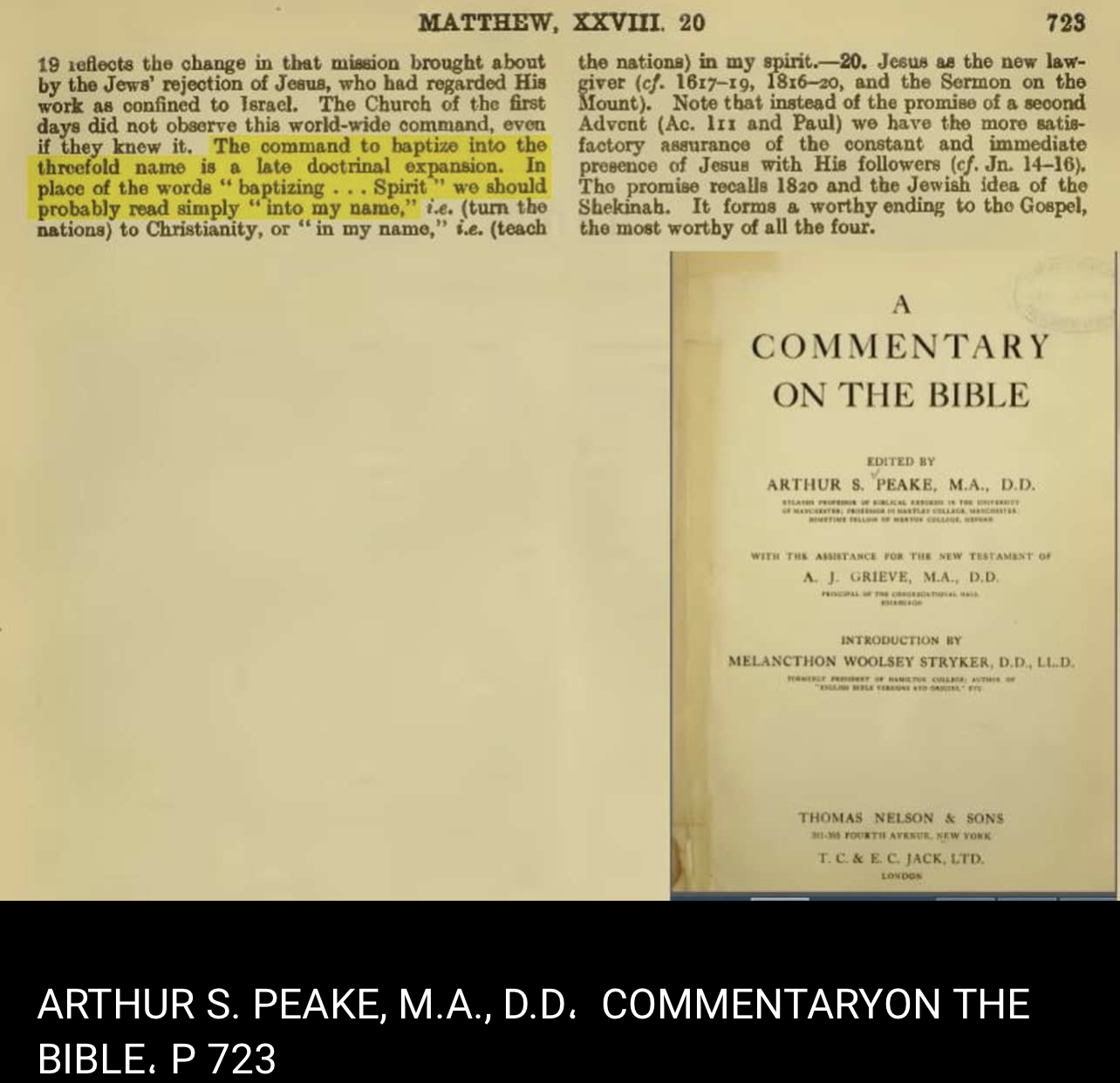
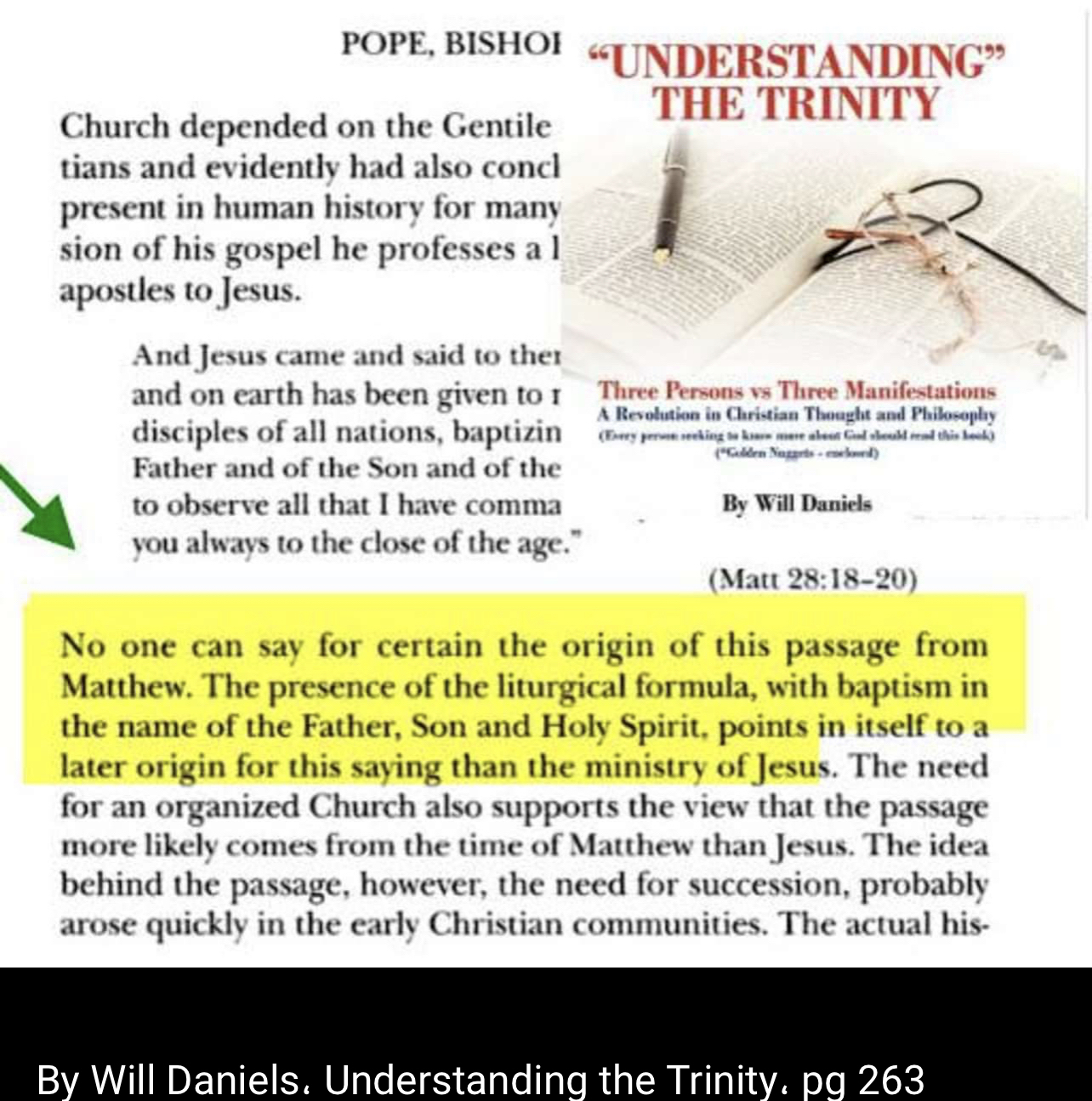
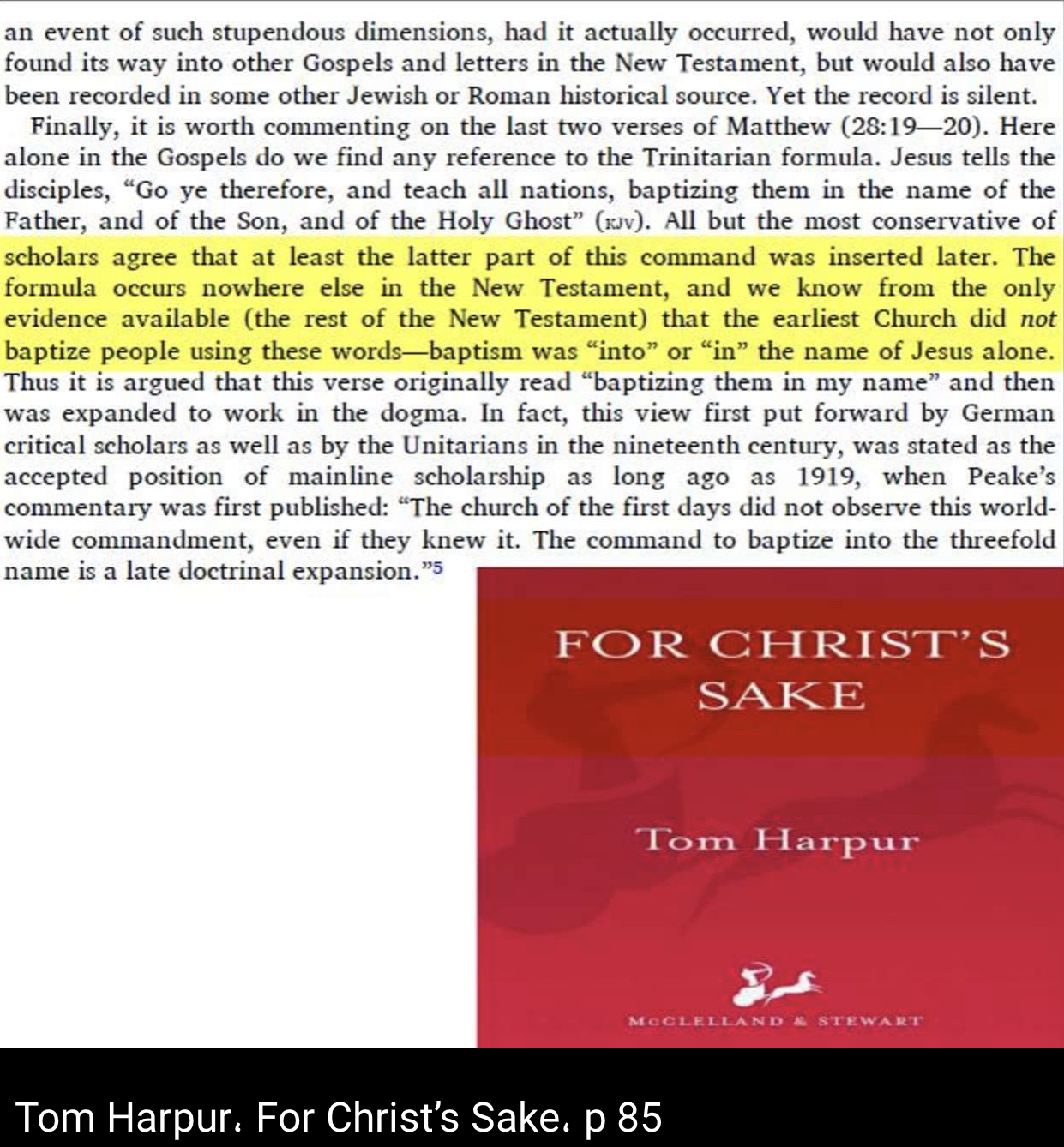 ———————————————————
Amount of manuscripts and dates
———————————————————
Amount of manuscripts and dates
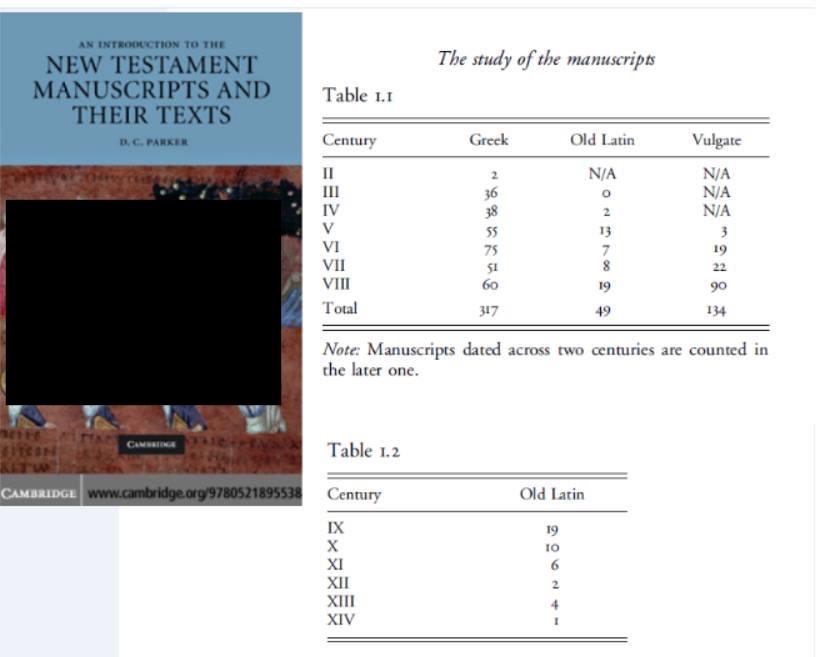
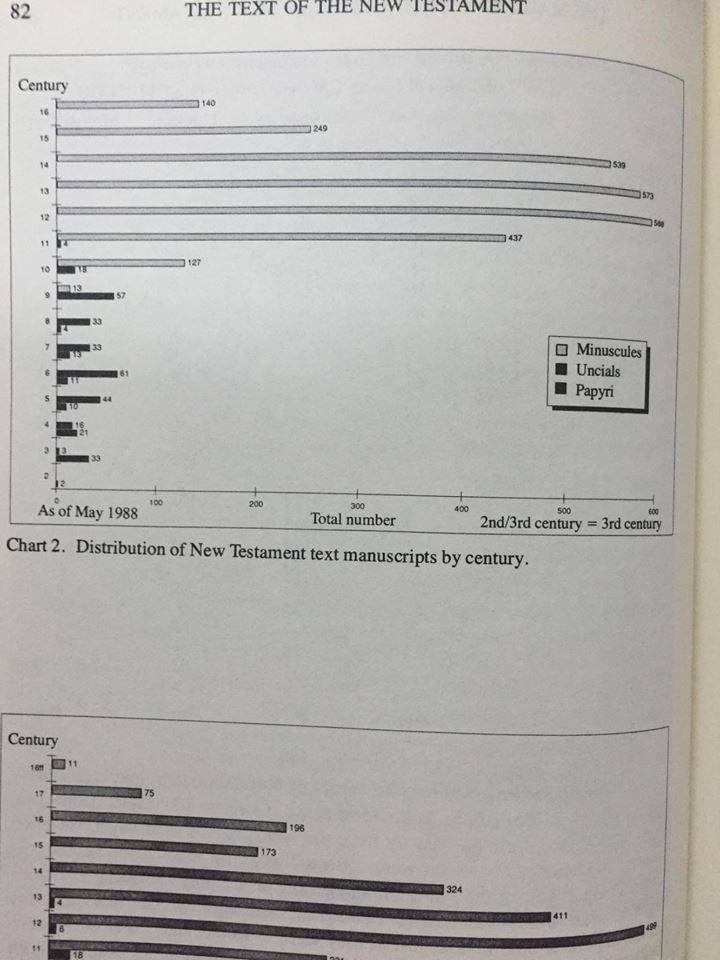

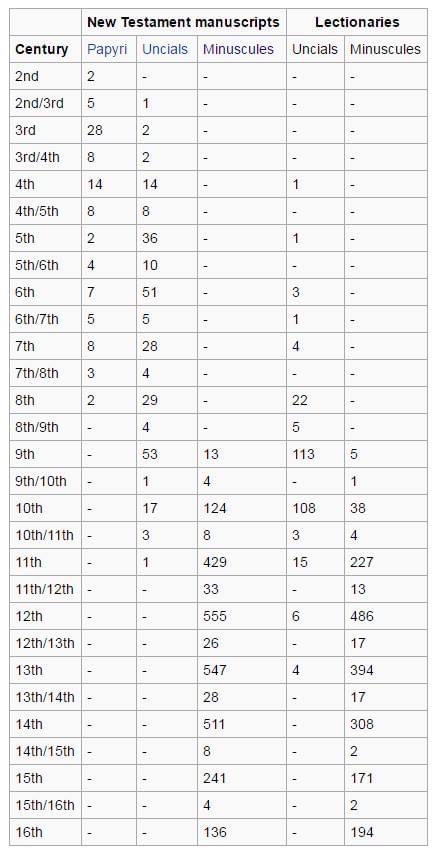 ———————————————————
———————————————————
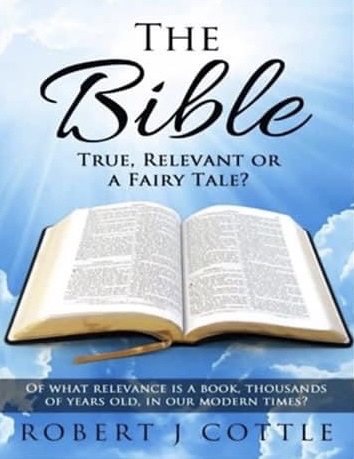
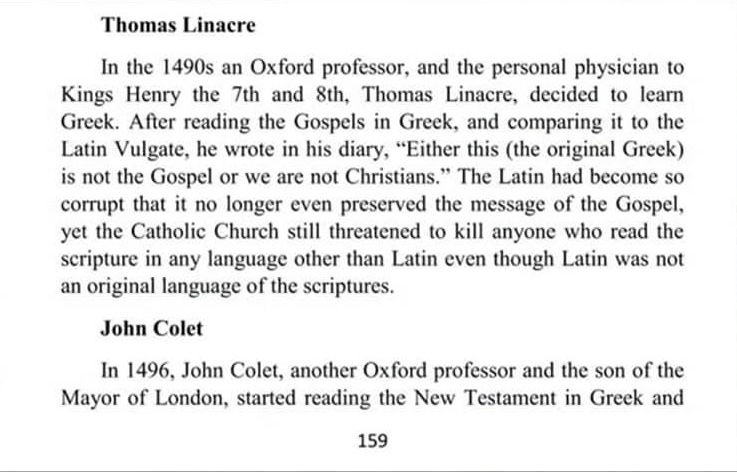 ———————————————————
Books and Verses mentioned in the Bible that are not in the Bible Canon
❗️Moses quotes a verse to comfort Aaron that doesn’t exist in the Old Testament
👇
“Moses then said to Aaron, “This is what the Lord spoke of when he said: ‘Among those who approach me I will be proved holy; in the sight of all the people I will be honored.’ Aaron remained silent.”
(Leviticus 10:3)
❗️Where’s the Book or Wars?
👇
“That is why the Book of the Wars of the Lord says: ‘…Zahab in Suphah and the ravines, the Arnon.’”
(Numbers 21:14)
❗️ Where is The Chronicles of the Kings of Israel?
👇
“Now the rest of the acts of Jeroboam, how he warred and how he reigned, behold, they are written in the Book of the Chronicles of the Kings of Israel.”
(1 Kings 14:19)
❗️Where’s the Book of the Annals of the kings of Judah?
👇
“As for the other events of Rehoboam’s reign, and all he did, are they not written in the book of the annals of the kings of Judah?”
(1 Kings 14:29)
❗️Where’s the “Book of Shemaiah, and of Iddo the Seer” (also called Story of the Prophet Iddo or The Annals of the Prophet Iddo.)
👇
“As for the other events of Solomon’s reign, from beginning to end, are they not written in the records of Nathan the prophet, in the prophecy of Ahijah the Shilonite and in the visions of Iddo the seer concerning Jeroboam son of Nebat?”
(2 Chronicles 9:29)
“Now the acts of Rehoboam, first and last, are they not written in the book of Shemaiah the prophet, and of Iddo the seer concerning genealogies? And there were wars between Rehoboam and Jeroboam continually.”
(2 Chronicles 12:15)
“The other events of Abijah’s reign, what he did and what he said, are written in the annotations of the prophet Iddo.”
(2 Chronicles 13:22)
——
❗️Where’s the Book of the Annals of Solomon?
👇
“As for the other events of Solomon’s reign—all he did and the wisdom he displayed—are they not written in the book of the annals of Solomon?”
(1 Kings 11:41)
❗️Where’s The Annals of King David?
👇
“Joab son of Zeruiah began to count the men but did not finish. God’s wrath came on Israel on account of this numbering, and the number was not entered in the book of the annals of King David.”
(1 Chronicles 27:24)
❗️Where’s the “Book of Nathan the prophet,” “The book of Samuel the seer,” and the “Book of Gad the Seer”? 👇
“As for the events of King David’s reign, from beginning to end, they are written in the records of Samuel the seer, the records of Nathan the prophet and the records of Gad the seer, together with the details of his reign and power, and the circumstances that surrounded him and Israel and the kingdoms of all the other lands.”
(1 Chronicles 29:29-30)
“As for the other events of Solomon’s reign, from beginning to end, are they not written in the records of Nathan the prophet, in the prophecy of Ahijah the Shilonite and in the visions of Iddo the seer concerning Jeroboam son of Nebat?”
(2 Chronicles 9:29)
❗️Where’s The Story of the Book of Kings?
👇
“The account of his sons, the many prophecies about him, and the record of the restoration of the temple of God are written in the annotations on the book of the kings. And Amaziah his son succeeded him as king.”
(2 Chronicles 24:27)
❗️Where’s The Book of the Kings of Judah and Israel? 👇
“The other events of Hezekiah’s reign and his acts of devotion are written in the vision of the prophet Isaiah son of Amoz in the book of the kings of Judah and Israel.”
(2 Chronicles 32:32)
——
❗️ Where’s The Sayings of the Seers (or Sayings of Hozai, in the Masoretic Text)?
👇
“His prayer and how God was moved by his entreaty, as well as all his sins and unfaithfulness, and the sites where he built high places and set up Asherah poles and idols before he humbled himself—all these are written in the records of the seers.”
(2 Chronicles 33:19)
❗️Where’s the Book of Jasher?
👇
“So the sun stood still, and the moon stopped, till the nation avenged itself on its enemies, as it is written in the Book of Jashar. The sun stopped in the middle of the sky and delayed going down about a full day.”
(Joshua 10:13)
“David took up this lament concerning Saul and his son Jonathan, and he ordered that the people of Judah be taught this lament of the bow (it is written in the Book of Jashar):”
(2 Samuel 1:17-18)
❗️Where’s The Laments for Josiah?
👇
“Jeremiah composed laments for Josiah, and to this day all the male and female singers commemorate Josiah in the laments. These became a tradition in Israel and are written in the Laments.”
(2 Chronicles 35:25)
❗️Where in any of the 4 Gospels is this quote from Jesus found?
👇
“In everything I did, I showed you that by this kind of hard work we must help the weak, remembering the words the Lord Jesus himself said: ‘It is more blessed to give than to receive.’ ”
(Acts 20:35)
———————————————————
Books and Verses mentioned in the Bible that are not in the Bible Canon
❗️Moses quotes a verse to comfort Aaron that doesn’t exist in the Old Testament
👇
“Moses then said to Aaron, “This is what the Lord spoke of when he said: ‘Among those who approach me I will be proved holy; in the sight of all the people I will be honored.’ Aaron remained silent.”
(Leviticus 10:3)
❗️Where’s the Book or Wars?
👇
“That is why the Book of the Wars of the Lord says: ‘…Zahab in Suphah and the ravines, the Arnon.’”
(Numbers 21:14)
❗️ Where is The Chronicles of the Kings of Israel?
👇
“Now the rest of the acts of Jeroboam, how he warred and how he reigned, behold, they are written in the Book of the Chronicles of the Kings of Israel.”
(1 Kings 14:19)
❗️Where’s the Book of the Annals of the kings of Judah?
👇
“As for the other events of Rehoboam’s reign, and all he did, are they not written in the book of the annals of the kings of Judah?”
(1 Kings 14:29)
❗️Where’s the “Book of Shemaiah, and of Iddo the Seer” (also called Story of the Prophet Iddo or The Annals of the Prophet Iddo.)
👇
“As for the other events of Solomon’s reign, from beginning to end, are they not written in the records of Nathan the prophet, in the prophecy of Ahijah the Shilonite and in the visions of Iddo the seer concerning Jeroboam son of Nebat?”
(2 Chronicles 9:29)
“Now the acts of Rehoboam, first and last, are they not written in the book of Shemaiah the prophet, and of Iddo the seer concerning genealogies? And there were wars between Rehoboam and Jeroboam continually.”
(2 Chronicles 12:15)
“The other events of Abijah’s reign, what he did and what he said, are written in the annotations of the prophet Iddo.”
(2 Chronicles 13:22)
——
❗️Where’s the Book of the Annals of Solomon?
👇
“As for the other events of Solomon’s reign—all he did and the wisdom he displayed—are they not written in the book of the annals of Solomon?”
(1 Kings 11:41)
❗️Where’s The Annals of King David?
👇
“Joab son of Zeruiah began to count the men but did not finish. God’s wrath came on Israel on account of this numbering, and the number was not entered in the book of the annals of King David.”
(1 Chronicles 27:24)
❗️Where’s the “Book of Nathan the prophet,” “The book of Samuel the seer,” and the “Book of Gad the Seer”? 👇
“As for the events of King David’s reign, from beginning to end, they are written in the records of Samuel the seer, the records of Nathan the prophet and the records of Gad the seer, together with the details of his reign and power, and the circumstances that surrounded him and Israel and the kingdoms of all the other lands.”
(1 Chronicles 29:29-30)
“As for the other events of Solomon’s reign, from beginning to end, are they not written in the records of Nathan the prophet, in the prophecy of Ahijah the Shilonite and in the visions of Iddo the seer concerning Jeroboam son of Nebat?”
(2 Chronicles 9:29)
❗️Where’s The Story of the Book of Kings?
👇
“The account of his sons, the many prophecies about him, and the record of the restoration of the temple of God are written in the annotations on the book of the kings. And Amaziah his son succeeded him as king.”
(2 Chronicles 24:27)
❗️Where’s The Book of the Kings of Judah and Israel? 👇
“The other events of Hezekiah’s reign and his acts of devotion are written in the vision of the prophet Isaiah son of Amoz in the book of the kings of Judah and Israel.”
(2 Chronicles 32:32)
——
❗️ Where’s The Sayings of the Seers (or Sayings of Hozai, in the Masoretic Text)?
👇
“His prayer and how God was moved by his entreaty, as well as all his sins and unfaithfulness, and the sites where he built high places and set up Asherah poles and idols before he humbled himself—all these are written in the records of the seers.”
(2 Chronicles 33:19)
❗️Where’s the Book of Jasher?
👇
“So the sun stood still, and the moon stopped, till the nation avenged itself on its enemies, as it is written in the Book of Jashar. The sun stopped in the middle of the sky and delayed going down about a full day.”
(Joshua 10:13)
“David took up this lament concerning Saul and his son Jonathan, and he ordered that the people of Judah be taught this lament of the bow (it is written in the Book of Jashar):”
(2 Samuel 1:17-18)
❗️Where’s The Laments for Josiah?
👇
“Jeremiah composed laments for Josiah, and to this day all the male and female singers commemorate Josiah in the laments. These became a tradition in Israel and are written in the Laments.”
(2 Chronicles 35:25)
❗️Where in any of the 4 Gospels is this quote from Jesus found?
👇
“In everything I did, I showed you that by this kind of hard work we must help the weak, remembering the words the Lord Jesus himself said: ‘It is more blessed to give than to receive.’ ”
(Acts 20:35)
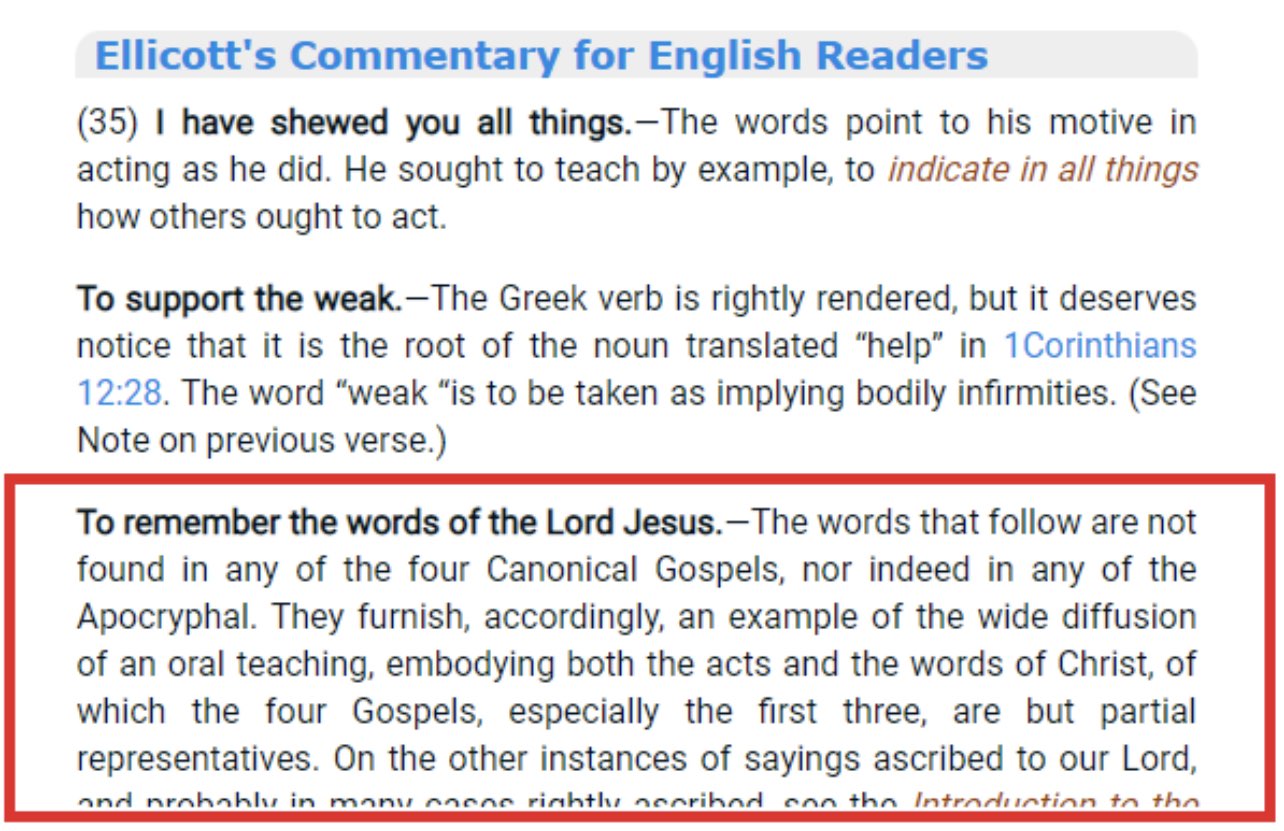 ❗️Where is Paul’s former letter to the Corinthians
👇
“I wrote to you in my letter not to associate with sexually immoral people.”
(1 Corinthians 5:9)
—-
For those who still argue that the New Testament is preserved:
➡️0% of the NT manuscripts that we have come from the 1st century!
➡️94% of the surviving manuscripts come from the 9th century or later.
Let that sink in!
Reference:
Aland, Kurt; Aland, Barbara (1995). The Text of The New Testament: An Introduction to the Critical Editions and to the Theory and Practice of Modern Textual Criticism, p. 81
❗️Where is Paul’s former letter to the Corinthians
👇
“I wrote to you in my letter not to associate with sexually immoral people.”
(1 Corinthians 5:9)
—-
For those who still argue that the New Testament is preserved:
➡️0% of the NT manuscripts that we have come from the 1st century!
➡️94% of the surviving manuscripts come from the 9th century or later.
Let that sink in!
Reference:
Aland, Kurt; Aland, Barbara (1995). The Text of The New Testament: An Introduction to the Critical Editions and to the Theory and Practice of Modern Textual Criticism, p. 81
 83% of the Greek NT manuscripts come from the year 1,000 onwards.
83% of the Greek NT manuscripts come from the year 1,000 onwards.
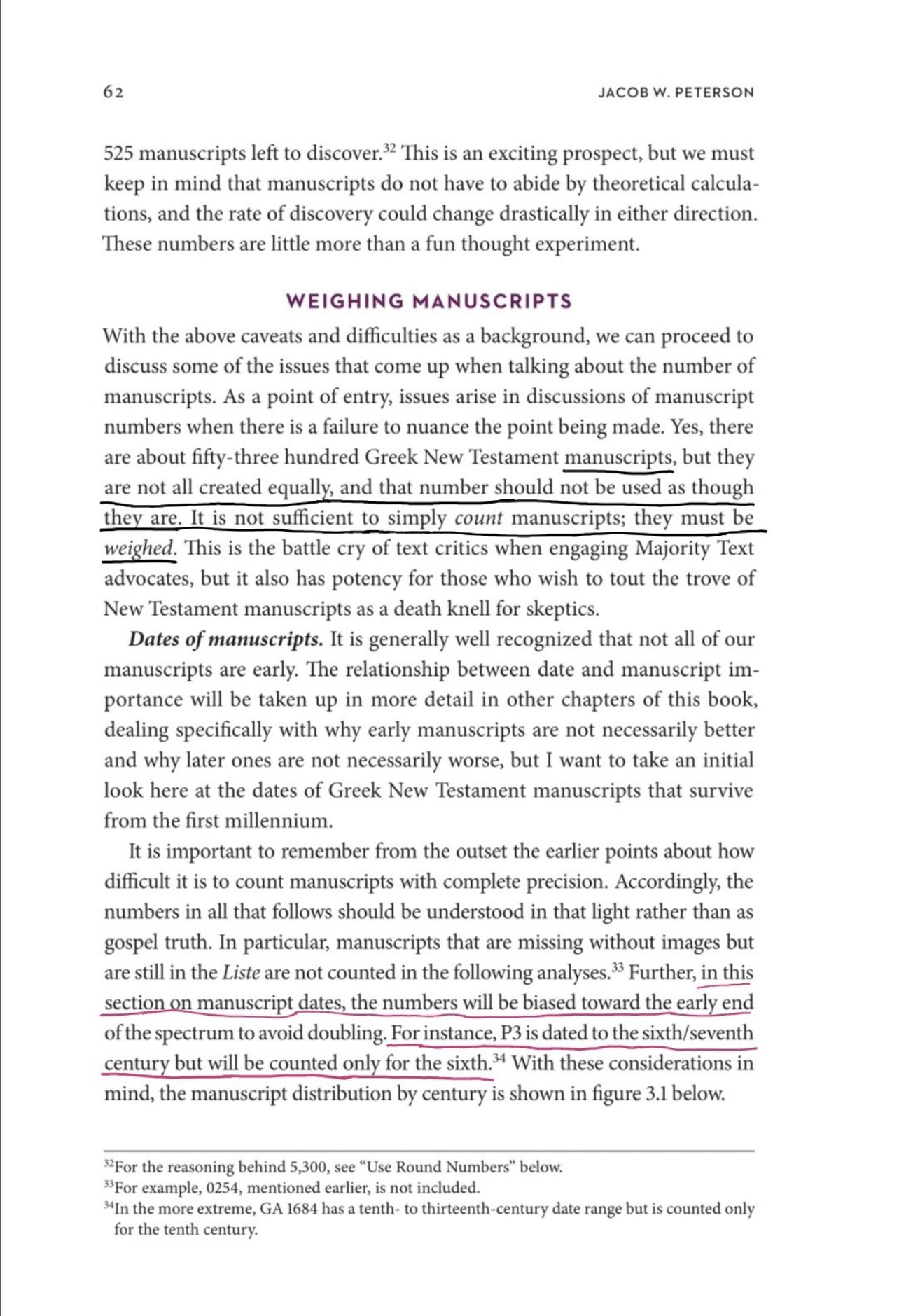
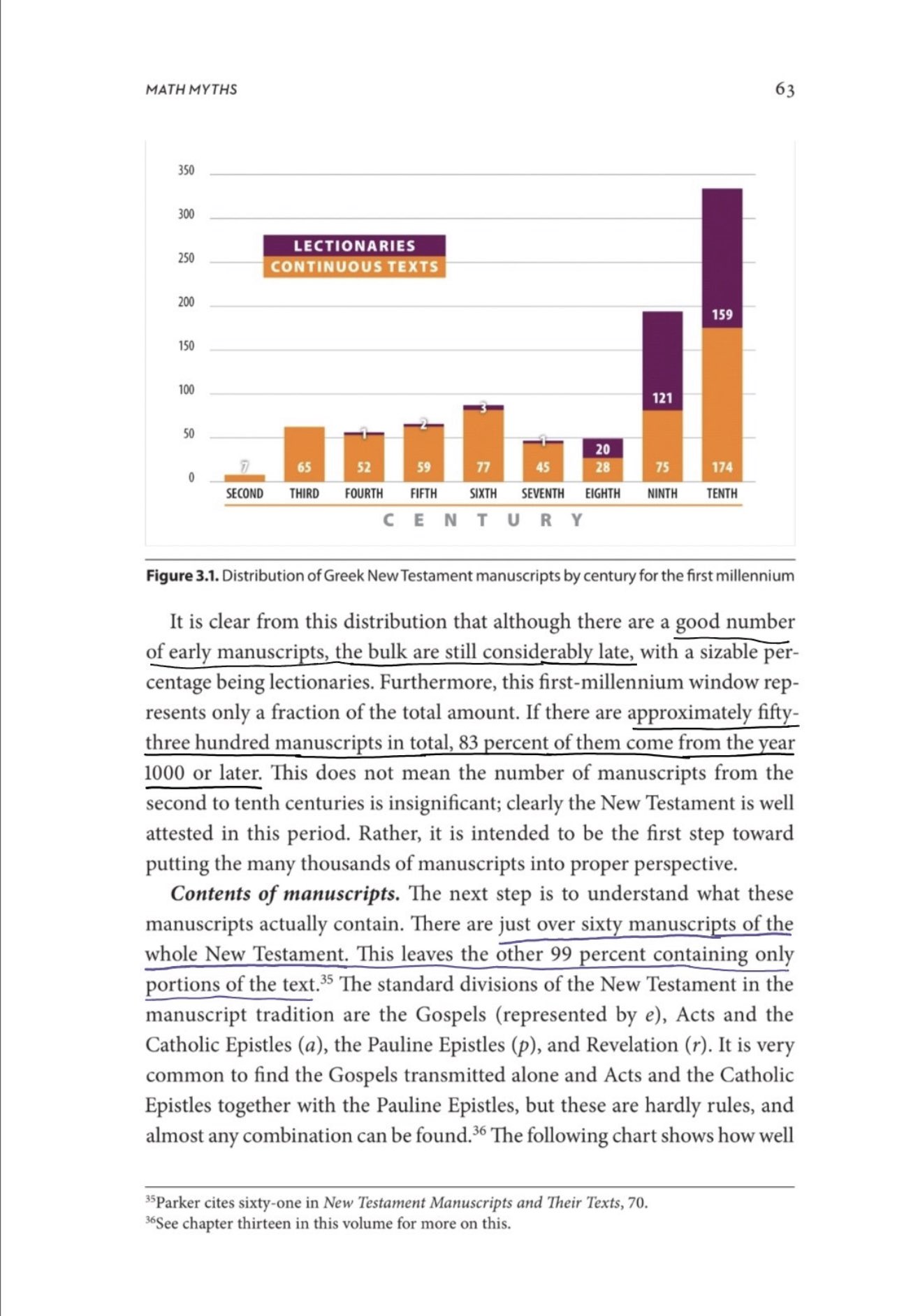 John Chrysostom Contradicts the Claim of Biblical Preservation
Matthew 2:23 and 1 Corinthians 2:9 quote prophetic words that cannot be found in the OT,
John Chrysostom (347-407 AD) claims this is because only few books were preserved fully and that many books were destroyed.
John Chrysostom Contradicts the Claim of Biblical Preservation
Matthew 2:23 and 1 Corinthians 2:9 quote prophetic words that cannot be found in the OT,
John Chrysostom (347-407 AD) claims this is because only few books were preserved fully and that many books were destroyed.
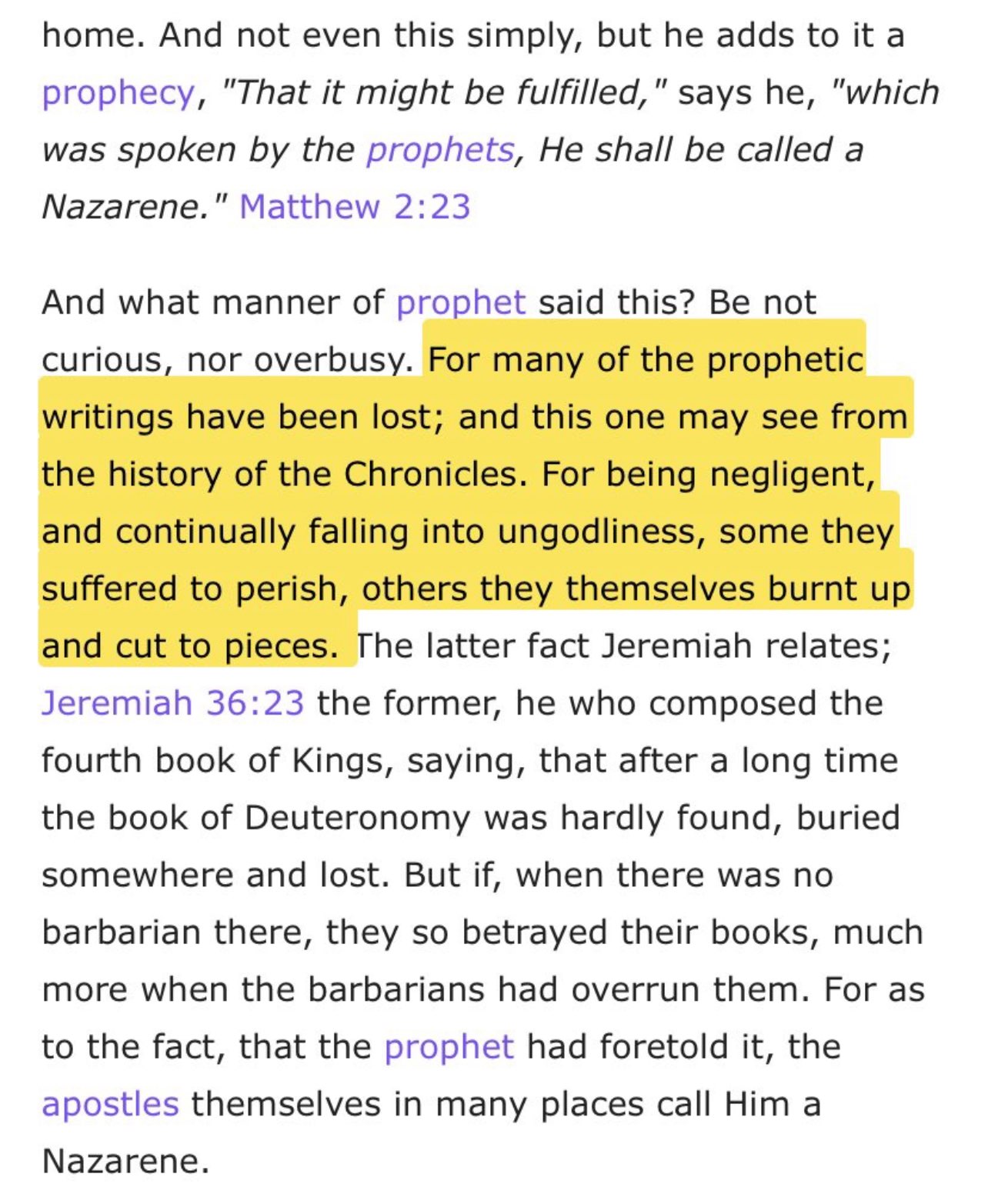
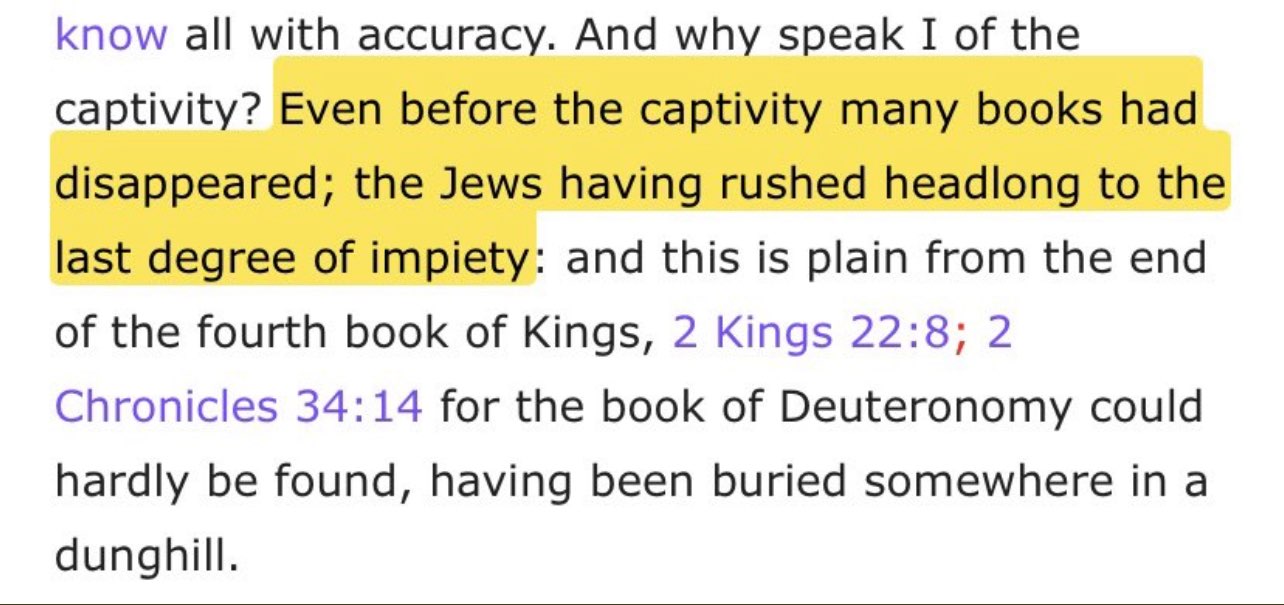
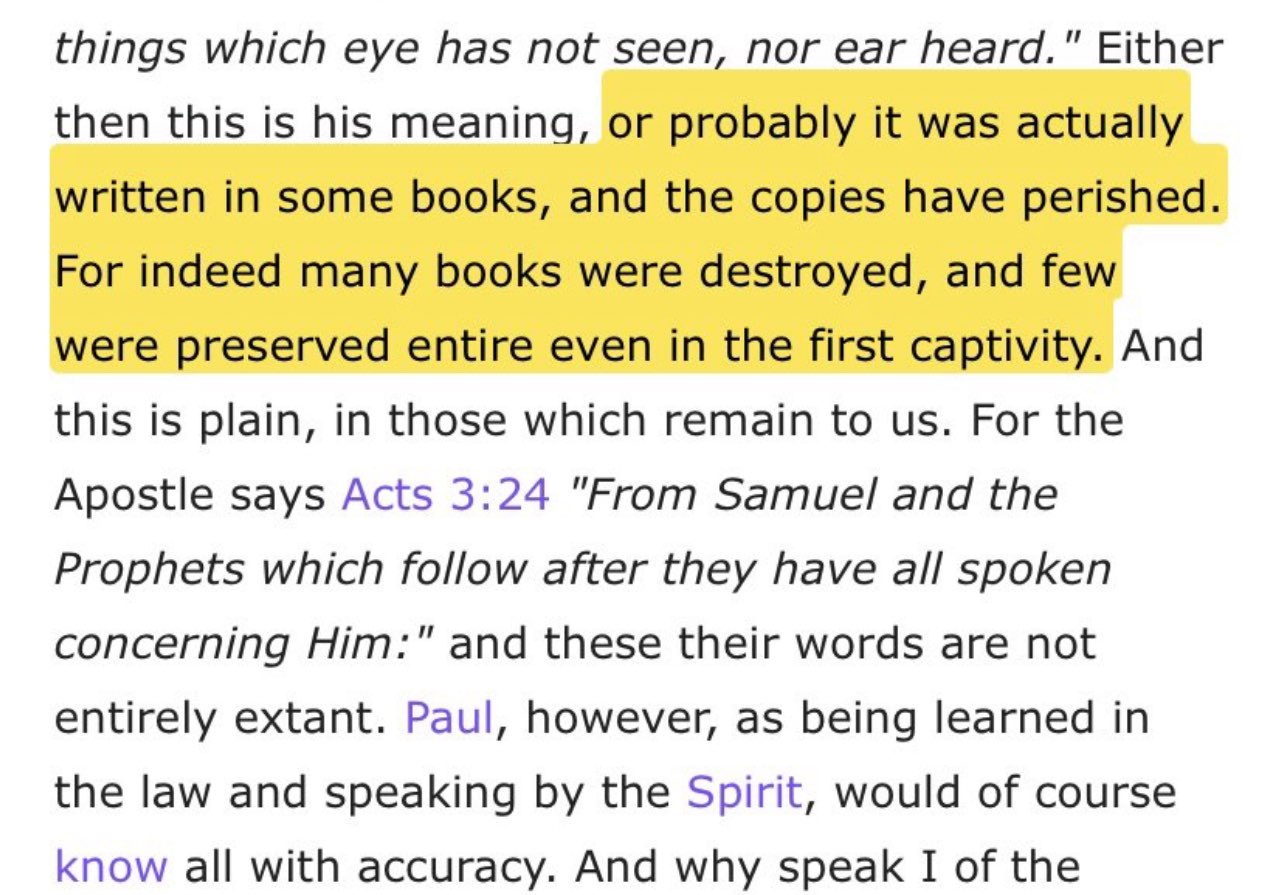 Sources: Homily 9 of “Homilies on the Gospel of St. Matthew,” and Homily 7 of “Homilies on First Corinthians.”
——-
Priest and NT scholar admits that the Bible is corrupted
Richard Simon (b. 1638) was a priest and scholar of the New Testament and rabbinical literature.
In two extensive books he documents the irreparable textual corruption of the entire Bible.
About the New Testament, Simon says:
Sources: Homily 9 of “Homilies on the Gospel of St. Matthew,” and Homily 7 of “Homilies on First Corinthians.”
——-
Priest and NT scholar admits that the Bible is corrupted
Richard Simon (b. 1638) was a priest and scholar of the New Testament and rabbinical literature.
In two extensive books he documents the irreparable textual corruption of the entire Bible.
About the New Testament, Simon says:
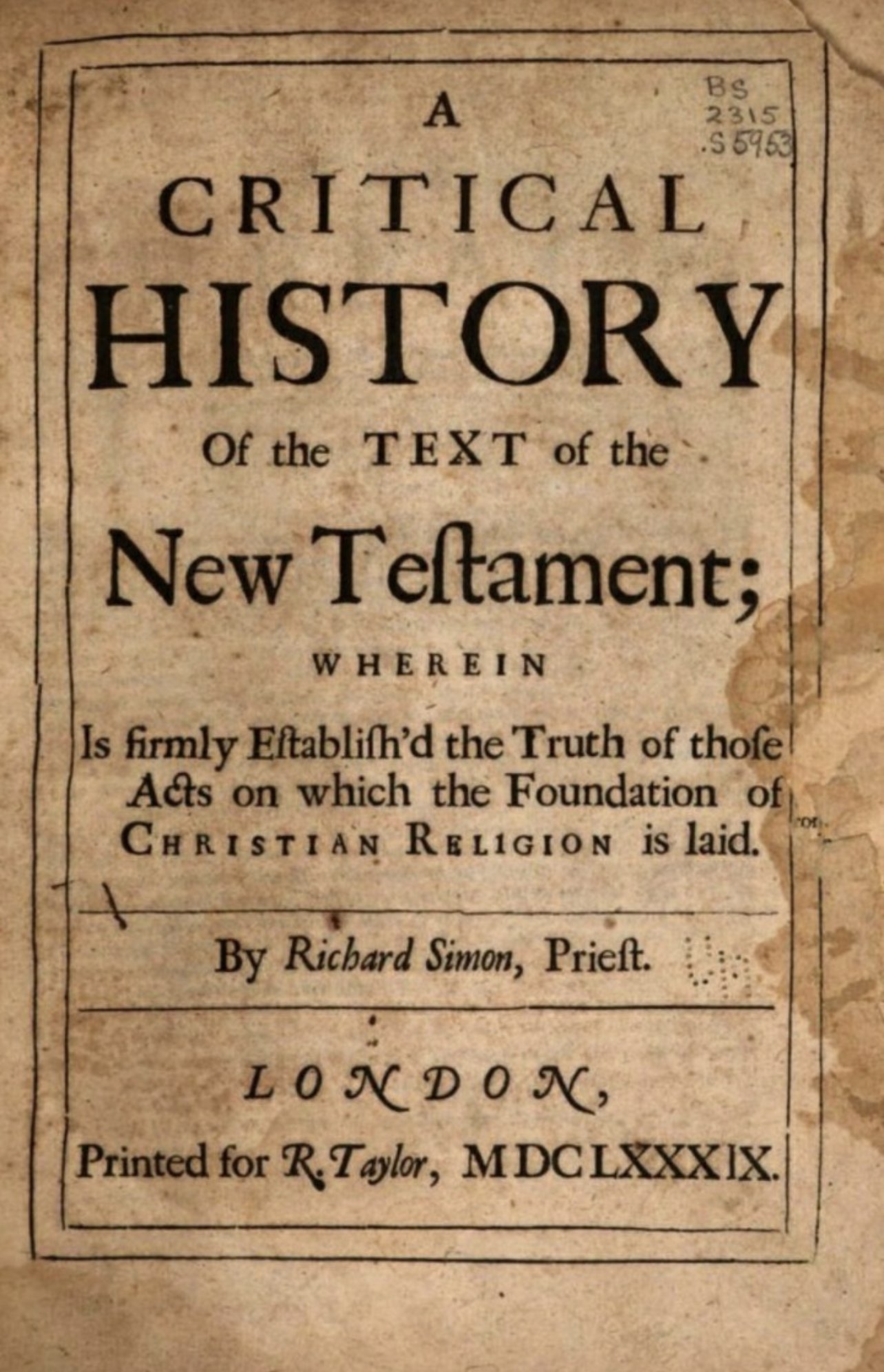
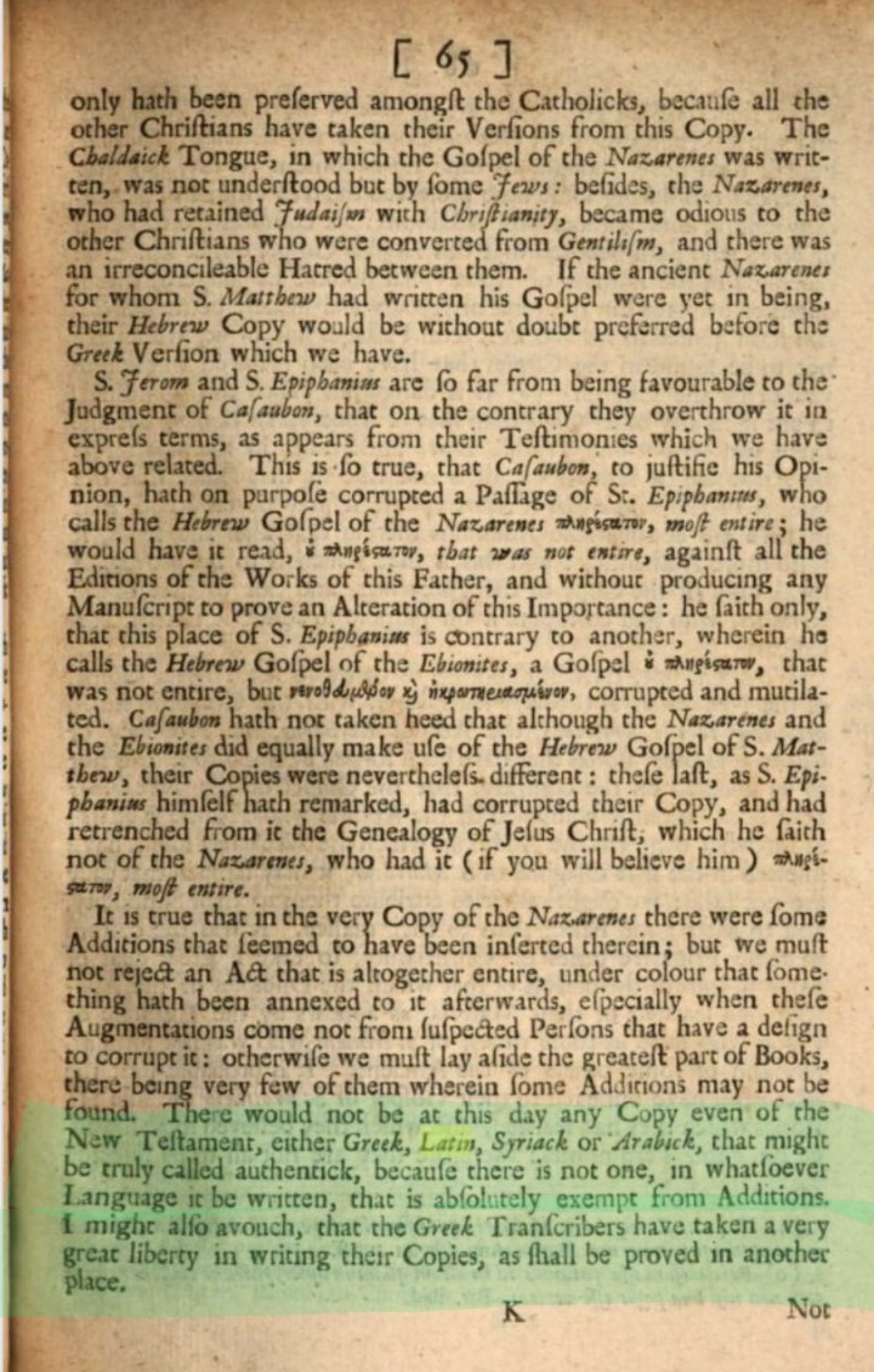 Origen believed that Christians corrupted the Gospel
Origen also agreed on Celsus's view about christians corrupting their scripture.
The Early Church father: Ante-Nicene church fathers Vol.4, Fathers of the third century,Origen against Celsus, Book II,Chapter 27
Origen believed that Christians corrupted the Gospel
Origen also agreed on Celsus's view about christians corrupting their scripture.
The Early Church father: Ante-Nicene church fathers Vol.4, Fathers of the third century,Origen against Celsus, Book II,Chapter 27
 Scholars in the Early Church believed that rabbis corrupted the Bible
Imagine the "scholars in the early church" concluded the rabbis of the first and second century changed the Masoretic text where "Jesus the Messiah" was mentioned.
This book accuses rabbi Akiva as the culprit
Scholars in the Early Church believed that rabbis corrupted the Bible
Imagine the "scholars in the early church" concluded the rabbis of the first and second century changed the Masoretic text where "Jesus the Messiah" was mentioned.
This book accuses rabbi Akiva as the culprit
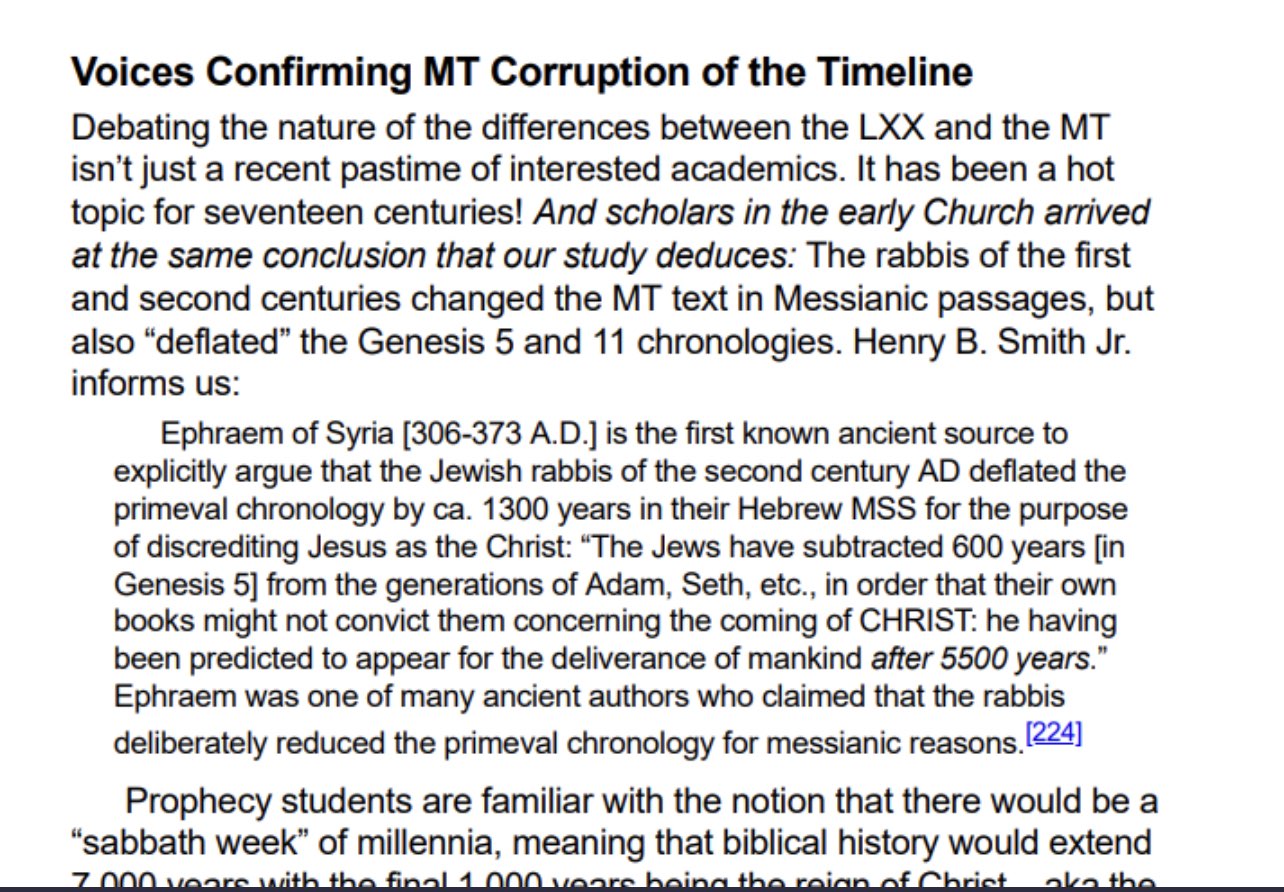 (REBOOTING THE BIBLE S. Douglas Woodward pp. 214)
——-
When Was The Final Bible Canon Established?
(REBOOTING THE BIBLE S. Douglas Woodward pp. 214)
——-
When Was The Final Bible Canon Established?
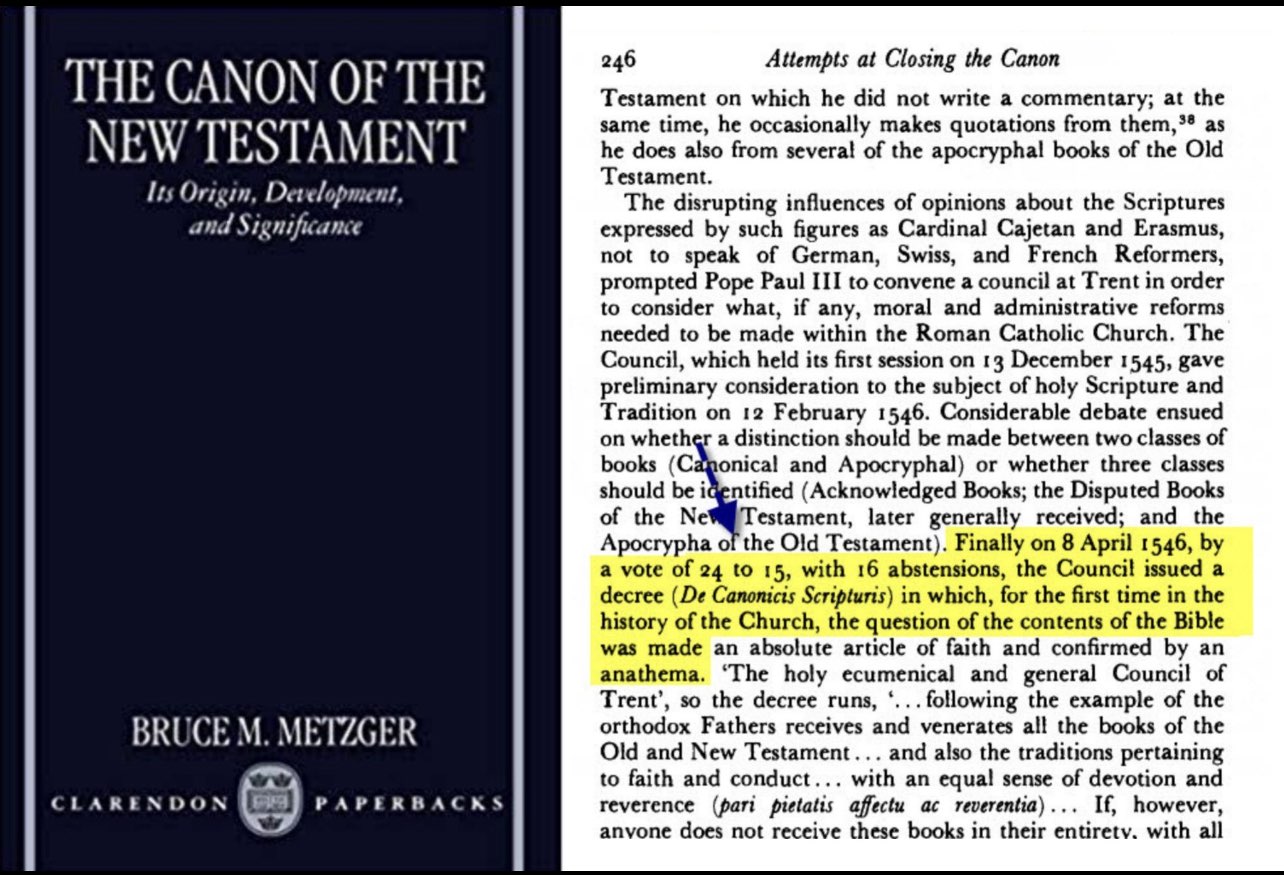 This one has got to be the saddest one of them all ngl.
Imagine taking more than 1500 years after Jesus to finally establish the content of the official Bible canon. Meanwhile 100% of the Quran was established within the 1st century Hijri (7th Century CE)
This one has got to be the saddest one of them all ngl.
Imagine taking more than 1500 years after Jesus to finally establish the content of the official Bible canon. Meanwhile 100% of the Quran was established within the 1st century Hijri (7th Century CE)
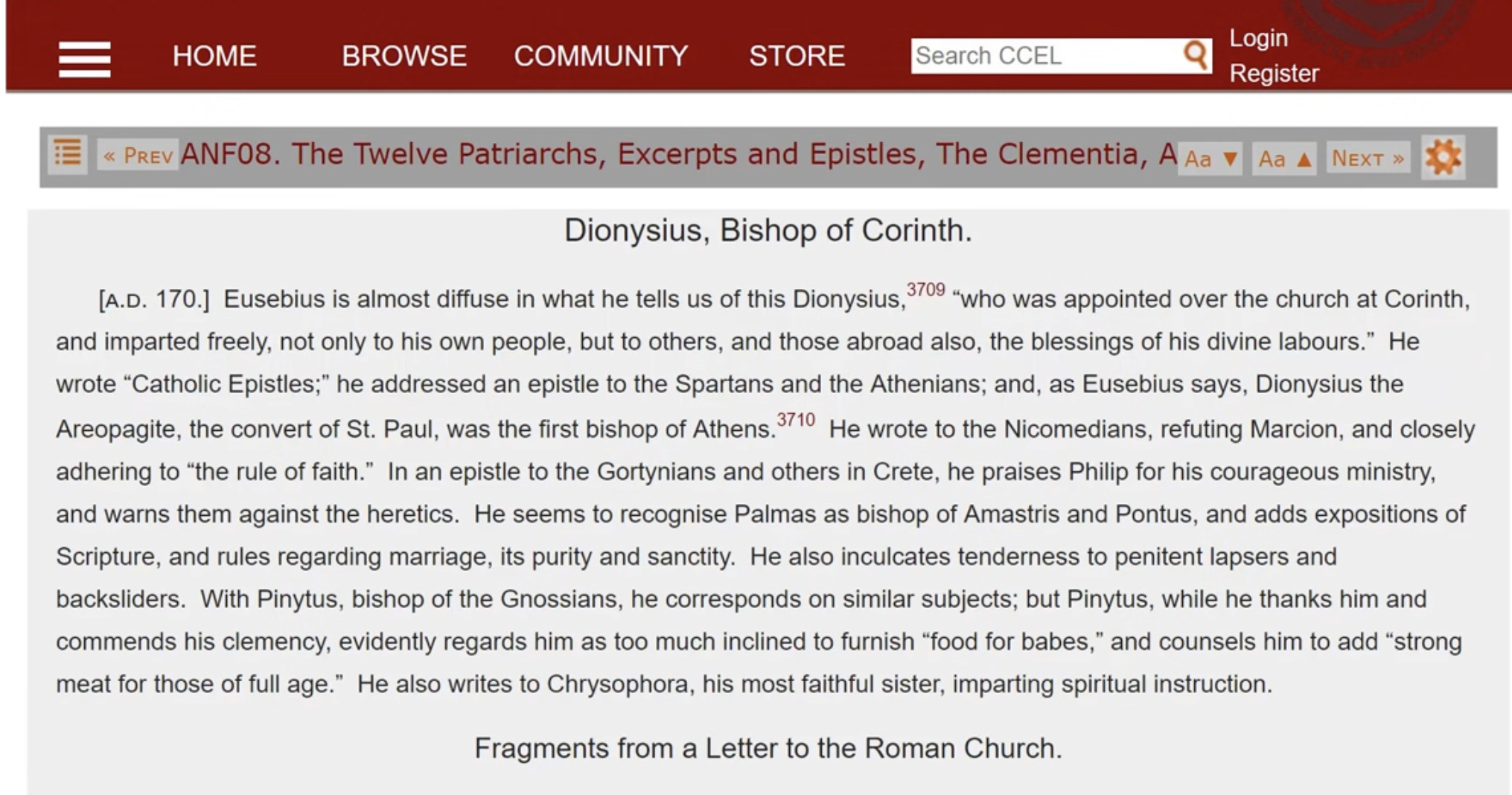
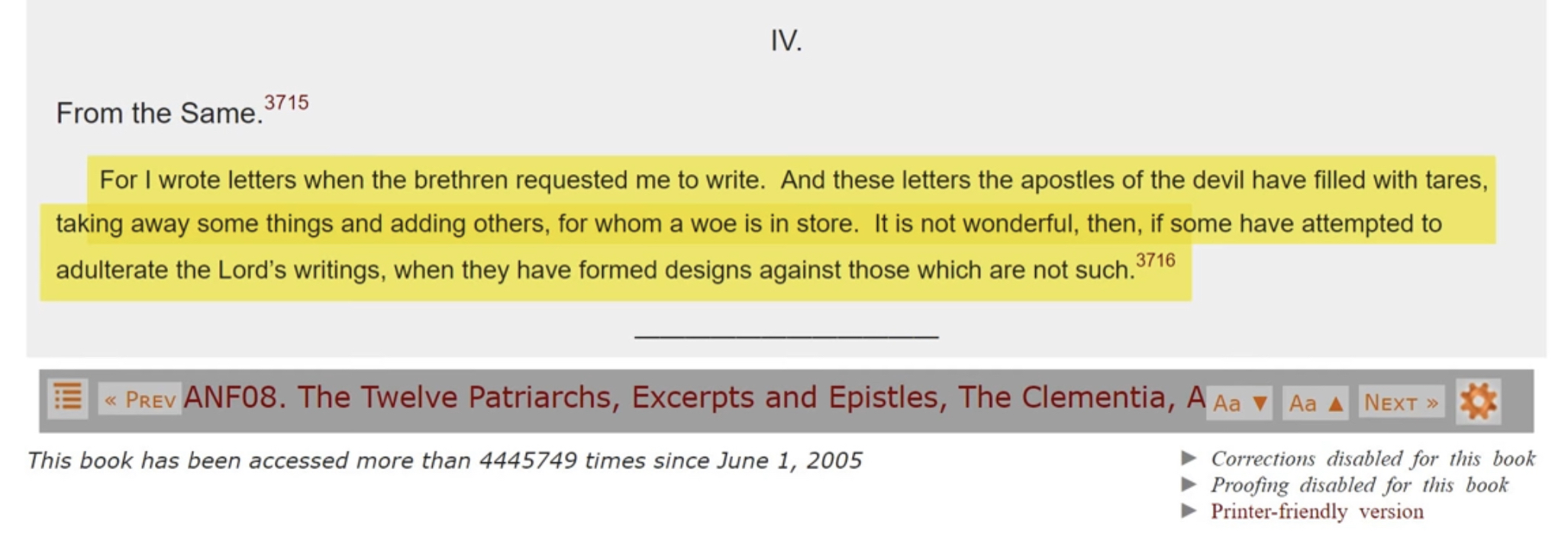 Church father from the early centuries says that the Bible and church fathers writings got corrupted
Here’s the link: https://www.ccel.org/ccel/schaff/anf08.x.vii.html
2500 words were added to the original text
Church father from the early centuries says that the Bible and church fathers writings got corrupted
Here’s the link: https://www.ccel.org/ccel/schaff/anf08.x.vii.html
2500 words were added to the original text
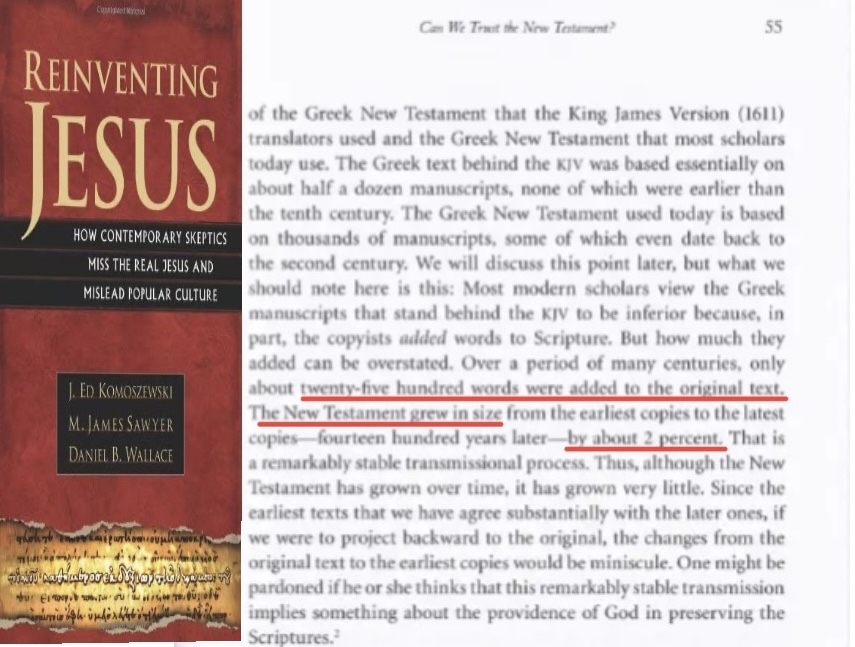 This number is not the actual number of additions to the original he is only speaking about the manuscripts we have so in the dark period we have no idea
———————————————————
This number is not the actual number of additions to the original he is only speaking about the manuscripts we have so in the dark period we have no idea
———————————————————
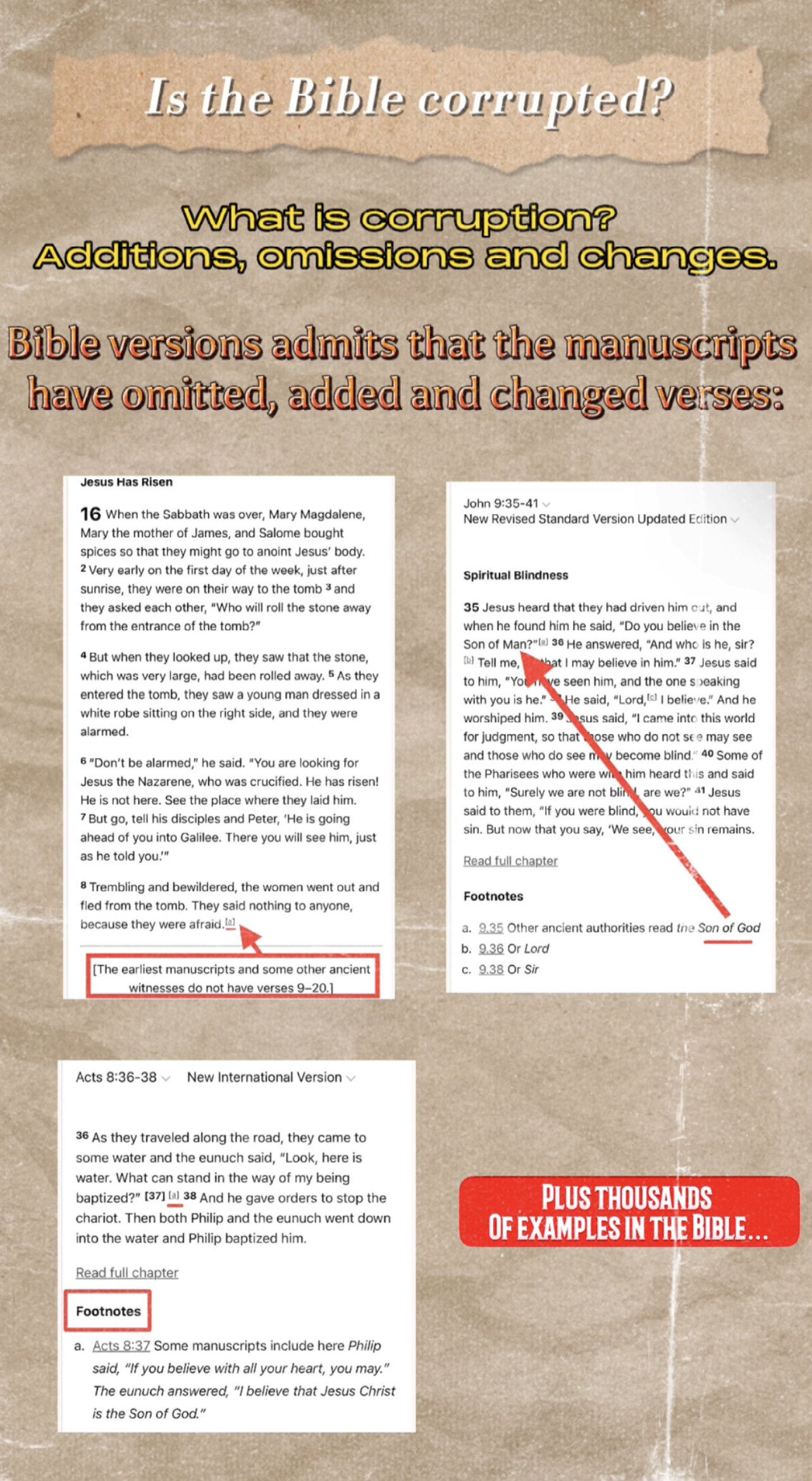 ———————————————————
———————————————————
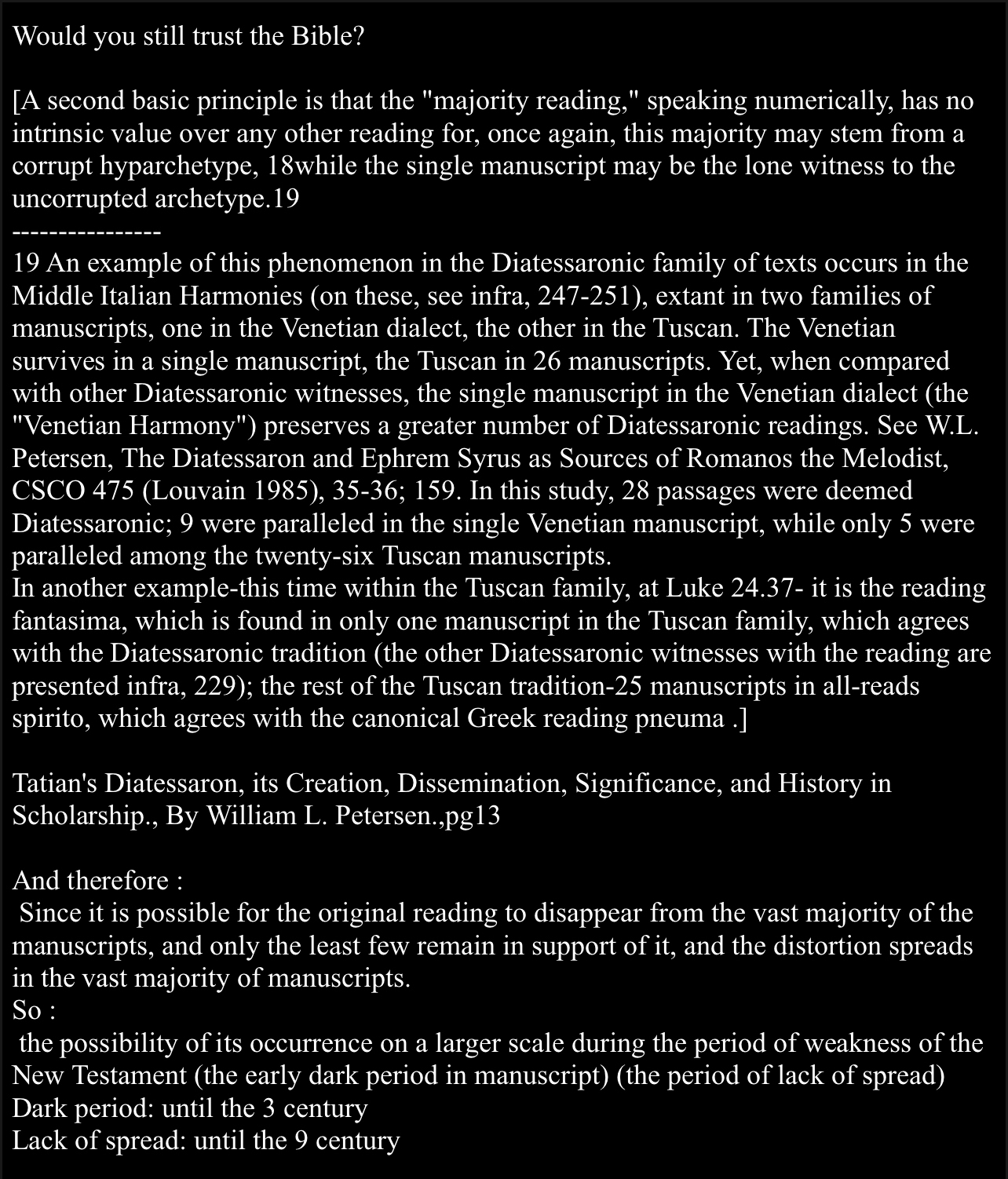 ———————————————————
The Ending of mark corruption Dr Bart Ehrman scholar of the lower textual criticism
Daniel Wallace most famous Bible defender and a scholar of the lower textual criticism
———————————————————
The Ending of mark corruption Dr Bart Ehrman scholar of the lower textual criticism
Daniel Wallace most famous Bible defender and a scholar of the lower textual criticism
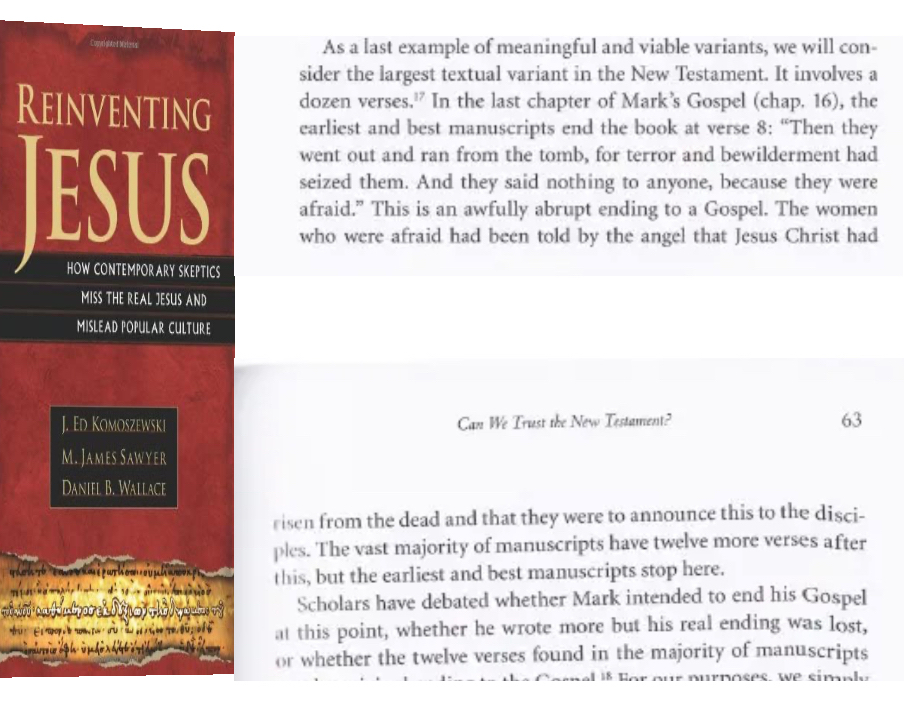 Most famous critical edition of the Bible
Most famous critical edition of the Bible
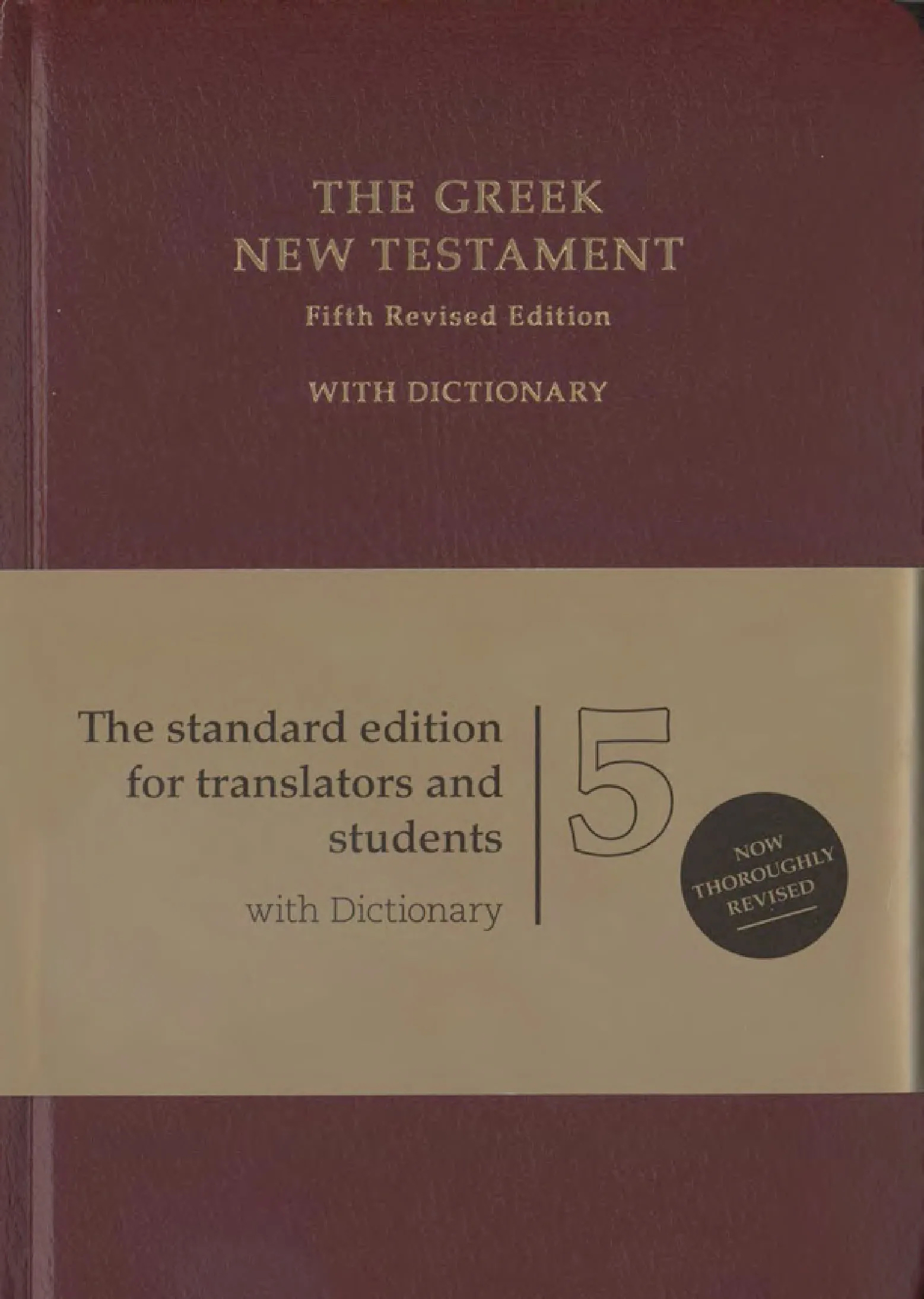
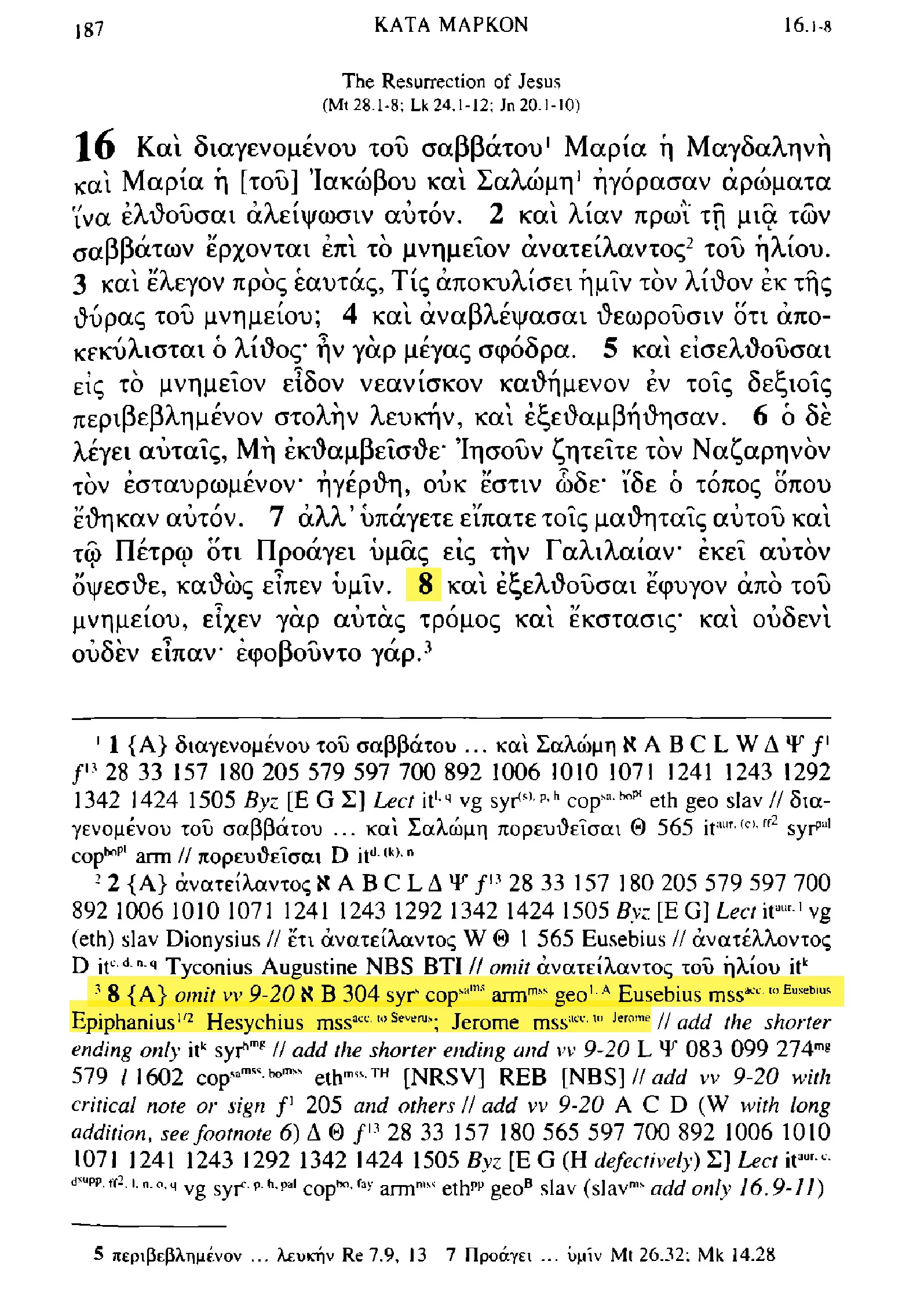 The short version (omit verses 9-20) was given (A) Rank which mean it is certain to be the correct reading
Only those two early Greek manuscripts (א and B) have the correct reading and all of the rest manuscripts (other than one manuscript but it is late) have additions(corruption) in them
The short version (omit verses 9-20) was given (A) Rank which mean it is certain to be the correct reading
Only those two early Greek manuscripts (א and B) have the correct reading and all of the rest manuscripts (other than one manuscript but it is late) have additions(corruption) in them
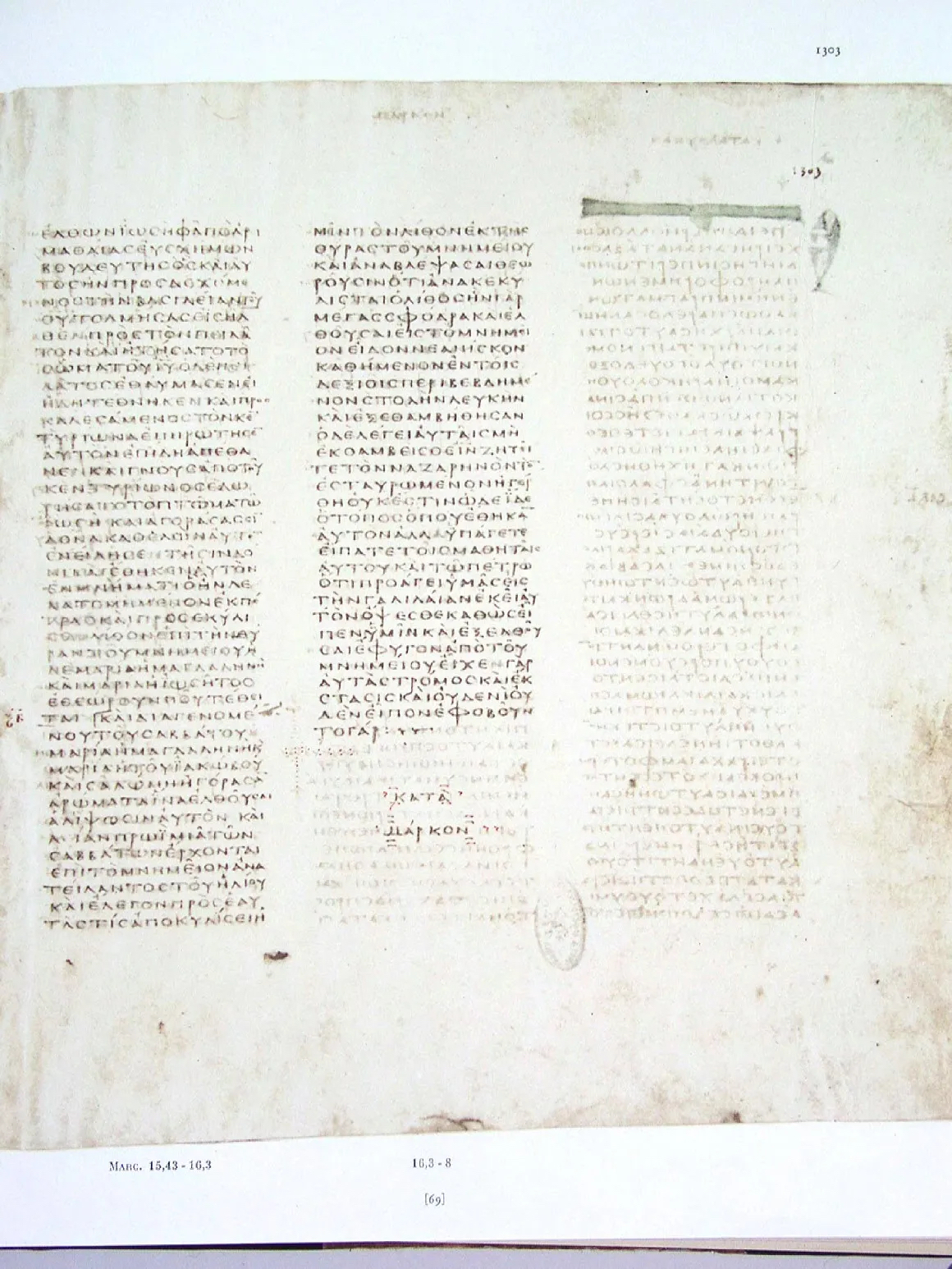
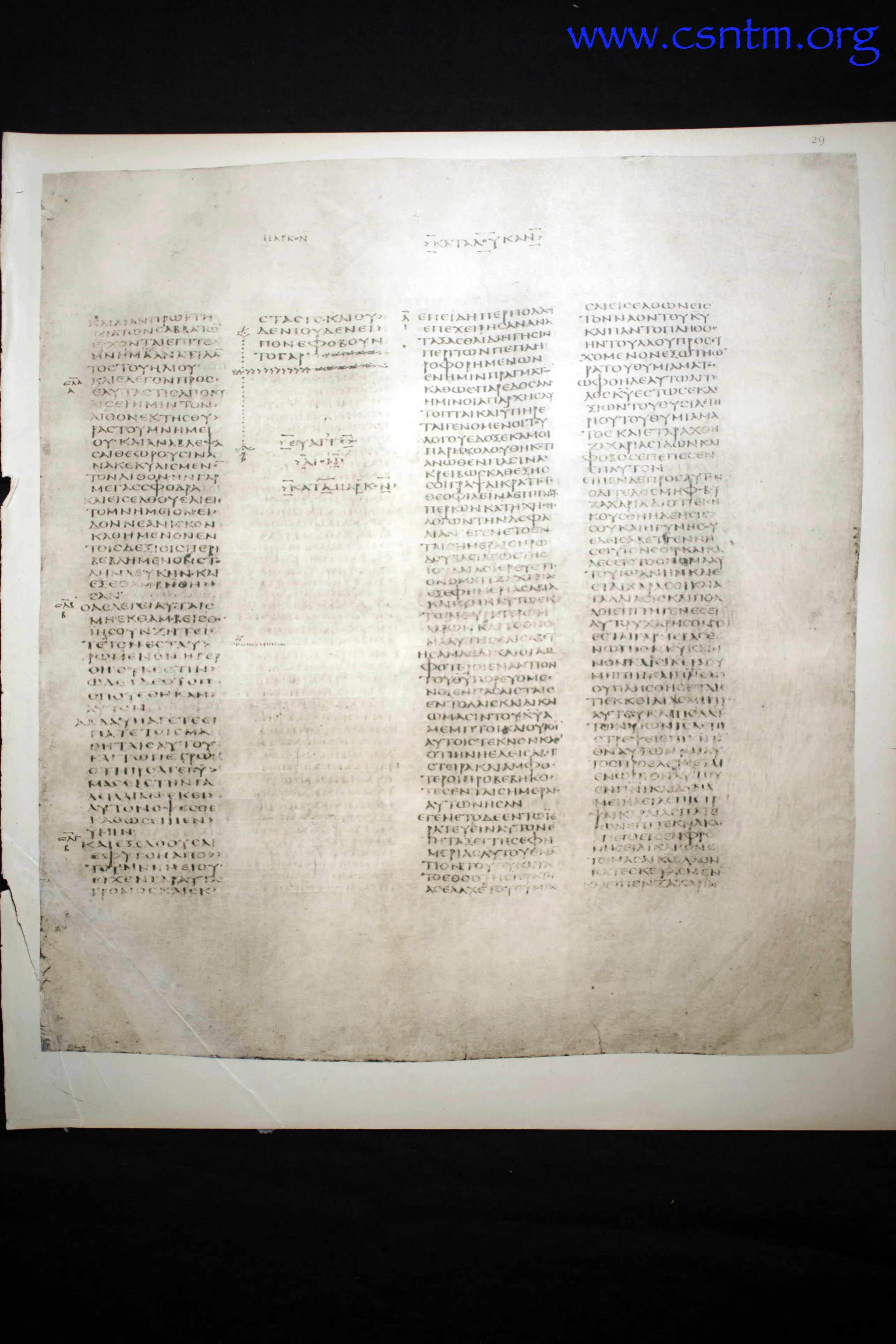 Analyzation: The scribes added these texts (12) in order to make a suitable ending to the Gospel of Mark, as the ending that ends in the Gospel of Mark in (Verse 8) is a sudden ending, as Mark does not mention anything about the events after the resurrection, which are very important events. In the Christian faith, Mark stops at the Mary fleeing in fear in (Verse 8), so the scribes decided to make an appropriate ending. (The Bible could not protect itself from additions)
———————————————————
Christians from time to time use this verse to prove that Jesus is divine
Analyzation: The scribes added these texts (12) in order to make a suitable ending to the Gospel of Mark, as the ending that ends in the Gospel of Mark in (Verse 8) is a sudden ending, as Mark does not mention anything about the events after the resurrection, which are very important events. In the Christian faith, Mark stops at the Mary fleeing in fear in (Verse 8), so the scribes decided to make an appropriate ending. (The Bible could not protect itself from additions)
———————————————————
Christians from time to time use this verse to prove that Jesus is divine
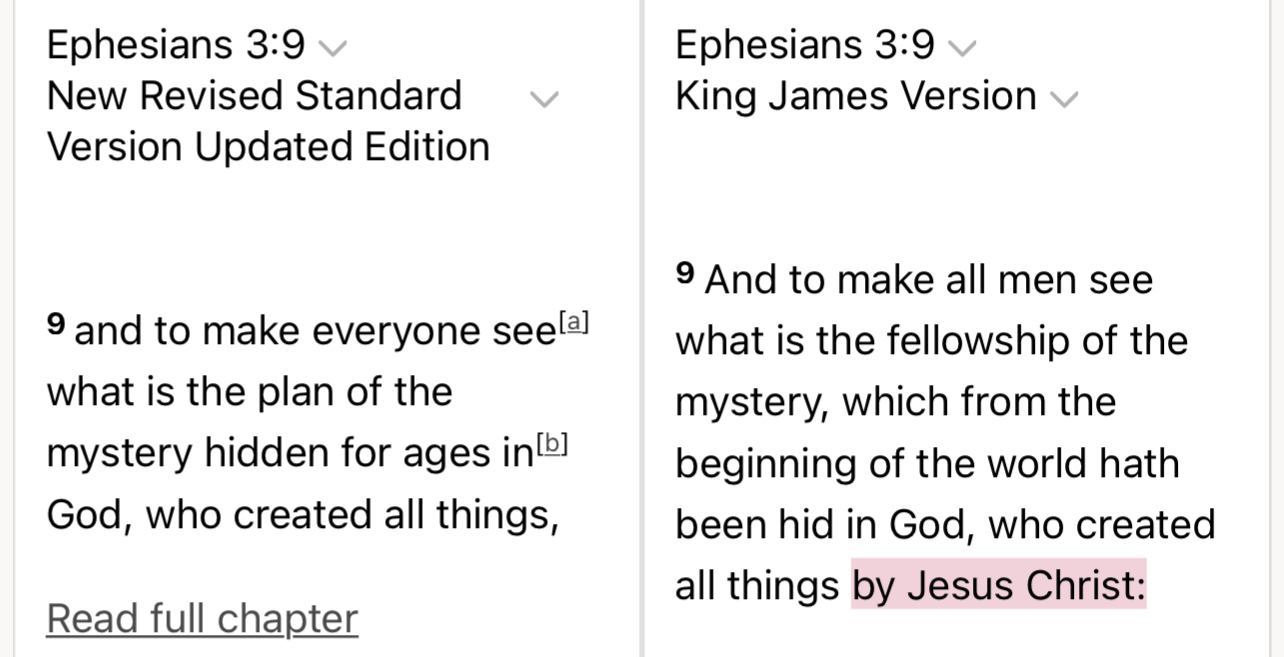 the red highlighted is a later forgery which means it is not authentic
It is not in the major important manuscripts
the red highlighted is a later forgery which means it is not authentic
It is not in the major important manuscripts
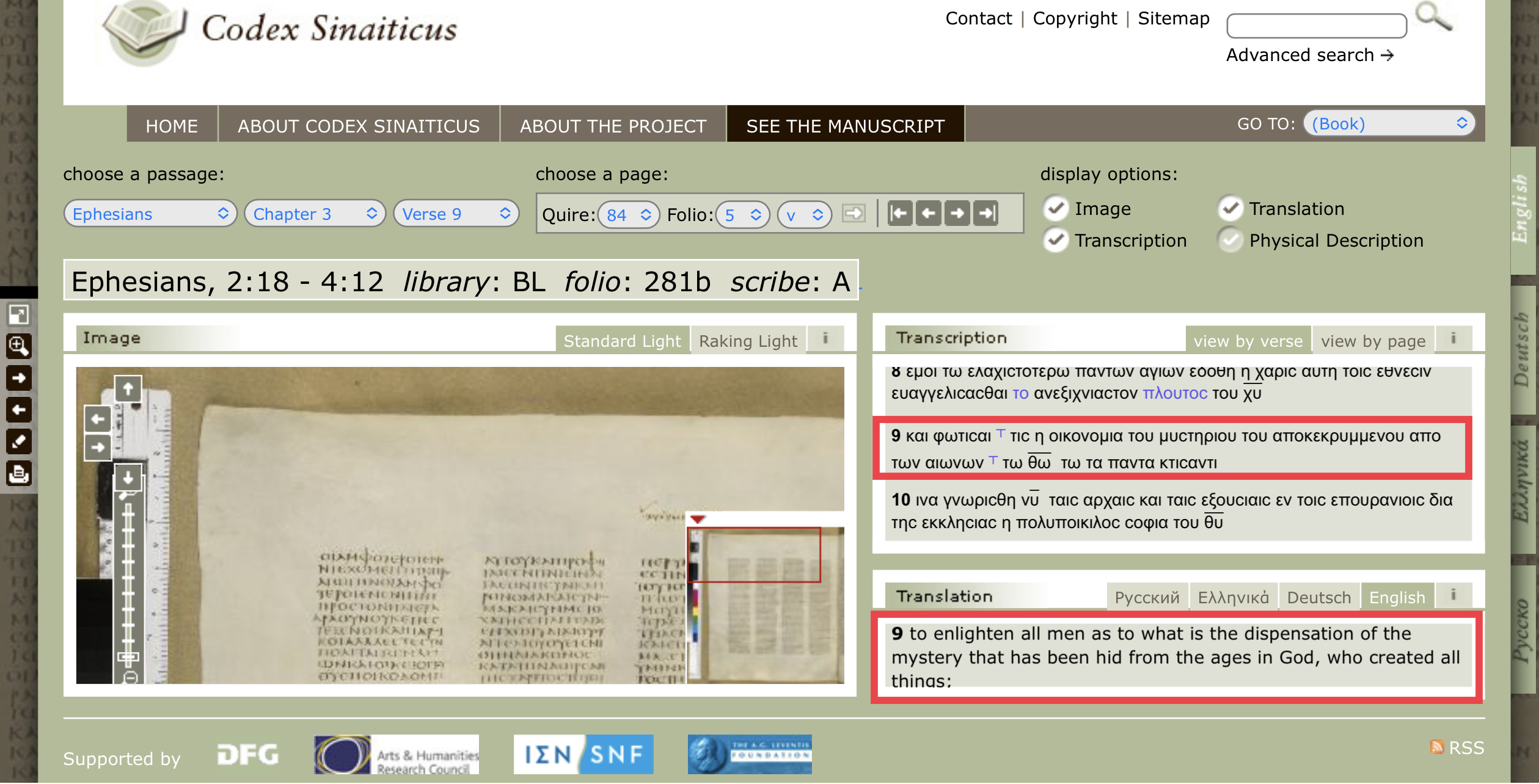
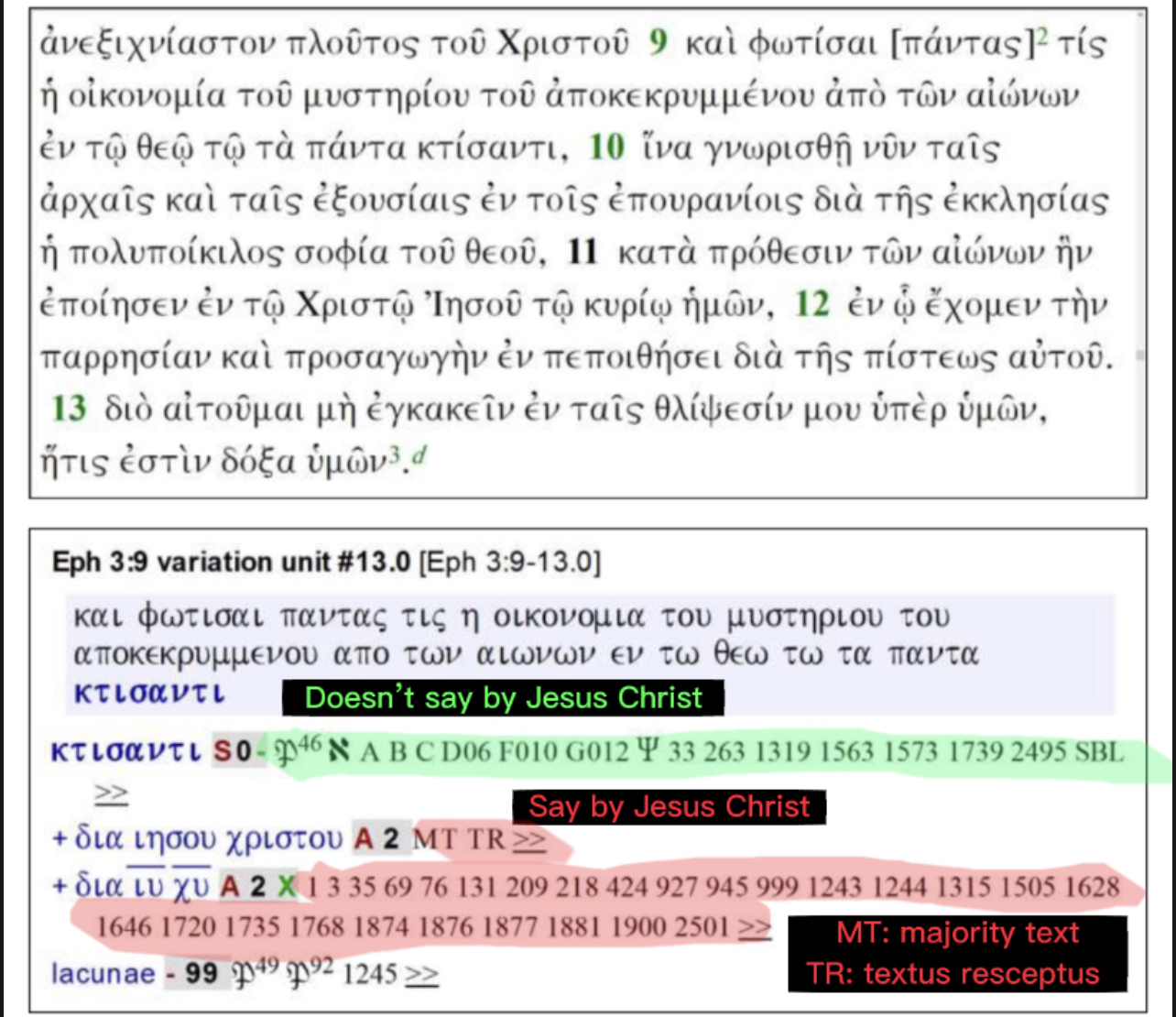 This corruption was spread to the majority of manuscripts and the received text which is the most used version of the Bible
———————————————————
Christians definition of corruption:
The Bible manuscripts are not corrupted as long as it did not lead to the disappearance of a certain essential doctrine with all its evidence or the fabrication of a certain essential doctrine with all its evidence, then they are unimportant corruptions, rather they are not corruptions then.
objection:
The problem with this definition is that it assumes the authenticity of the other texts just because there is no disagreement about them among the manuscripts, as they are agreed upon among the manuscripts. But this assumption is wrong because agreement does not mean validity, as evidenced by the fact that the overwhelming majority of the readings that the critical copies judged to be forged were the readings agreed upon among almost all manuscripts from the fifth to the fifteenth century, and even the agreement extended to the era of printing. so it is the agreed reading among almost all printed copies until the nineteenth century!
For example: the ending of the Gospel of Mark, which is present in all manuscripts and all printed copies from the fifth century AD to the nineteenth century, 1500 years ago, and despite that, all critical copies confirmed that it is not authentic!!
So the agreement does not guarantee authenticity, and we are captives at the mercy of the sands What it brought to us we knew.
Here’s the proof of the mark argument
———————————————————
https://en.wikipedia.org/wiki/Jesus_and_the_woman_taken_in_adultery
“There is now a broad academic consensus that the passage is a later interpolation added after the earliest known manuscripts of the Gospel of John. Although it is included in most modern translations (one notable exception being the New World Translation of the Holy Scriptures) it is typically noted as a later interpolation, as it is by Novum Testamentum Graece NA28. This has been the view of "most NT scholars, including most evangelical NT scholars, for well over a century" (written in 2009).[3] The passage appears to have been included in some texts by the 4th century, and became generally accepted by the 5th century.”
Also check this out
This corruption was spread to the majority of manuscripts and the received text which is the most used version of the Bible
———————————————————
Christians definition of corruption:
The Bible manuscripts are not corrupted as long as it did not lead to the disappearance of a certain essential doctrine with all its evidence or the fabrication of a certain essential doctrine with all its evidence, then they are unimportant corruptions, rather they are not corruptions then.
objection:
The problem with this definition is that it assumes the authenticity of the other texts just because there is no disagreement about them among the manuscripts, as they are agreed upon among the manuscripts. But this assumption is wrong because agreement does not mean validity, as evidenced by the fact that the overwhelming majority of the readings that the critical copies judged to be forged were the readings agreed upon among almost all manuscripts from the fifth to the fifteenth century, and even the agreement extended to the era of printing. so it is the agreed reading among almost all printed copies until the nineteenth century!
For example: the ending of the Gospel of Mark, which is present in all manuscripts and all printed copies from the fifth century AD to the nineteenth century, 1500 years ago, and despite that, all critical copies confirmed that it is not authentic!!
So the agreement does not guarantee authenticity, and we are captives at the mercy of the sands What it brought to us we knew.
Here’s the proof of the mark argument
———————————————————
https://en.wikipedia.org/wiki/Jesus_and_the_woman_taken_in_adultery
“There is now a broad academic consensus that the passage is a later interpolation added after the earliest known manuscripts of the Gospel of John. Although it is included in most modern translations (one notable exception being the New World Translation of the Holy Scriptures) it is typically noted as a later interpolation, as it is by Novum Testamentum Graece NA28. This has been the view of "most NT scholars, including most evangelical NT scholars, for well over a century" (written in 2009).[3] The passage appears to have been included in some texts by the 4th century, and became generally accepted by the 5th century.”
Also check this out
 (Saint) Justin Martyr (100-165CE) who is venerated in the EO , OO , Catholic , Lutheran and Anglican church believed in biblical corruption. He is the earliest Christian apologist. He says the biblical corruption of the Jews is worse than them worshipping the golden calf.
very interesting
https://youtu.be/G0jakZXApcg
https://youtu.be/AymnA526j9U
https://youtu.be/XKp4yWGTfXo
https://youtu.be/kX62bRIG-OI
(Saint) Justin Martyr (100-165CE) who is venerated in the EO , OO , Catholic , Lutheran and Anglican church believed in biblical corruption. He is the earliest Christian apologist. He says the biblical corruption of the Jews is worse than them worshipping the golden calf.
very interesting
https://youtu.be/G0jakZXApcg
https://youtu.be/AymnA526j9U
https://youtu.be/XKp4yWGTfXo
https://youtu.be/kX62bRIG-OI

 TRANSLATION
6.5 OLD TESTAMENT JEWISH CORRUPTION
This rubric shows what some church fathers and Christian scholars say accusing the Jews of removing or changing the verses in the Old Testament because of their profit or their negligence. If the Christians who are supposed to share the same book with the Jews say that, how to ask the Muslims to believe that the Bible is the pure word of God?
6.5.1 Justin Martyr: Jews Remove "Many Scriptures"
The first example is Justin Martyr (100-168 AD) who was a church father who says in his dialogue with Trypho (a Jew) that the Jews removed many scriptures:
"But I am far from putting confidence in your teachers, who refuse to admit that the interpretation made by the seventy elders (...) is correct; and they try to formulate another 169. And I want you to observe, that they have all removed many Scriptures (noXkáą ypowpac;) of the translations made by those seventy elders (...) but I proceed to continue my discussions by means of those passages that are still admitted by you (...) you contradict the proposition «Behold, a virgin concebird» (Is 7, 14], and they say that it should be read "Behold, a young concebird","
At the request of Trypho, who, unbelieving, asks him for an example of those Scriptures that he considers "removed", 171 Justin limited himself to citing a fragment of Ezra, another of Psalm 96, 10 (none of them are preserved in the current canons ) and two of Jeremias, of which one is preserved in the canon (Jr. 11, 19) and the other, unknown, presents an interesting parallelism with the doctrine of Christ's descent into Hell: "The Lord God remembered His dead people of Israel lay in the graves, and He came down to preach His own salvation to them" 112. (Dialogue with Trypho LXX to LXXII, source here and in English)
We see here that Justin accuses the Jews of changing the Bible for their benefit, which means that the Jews did not obey God in Deuteronomy 4:2 and changed His words.
6.5.2 John Chrysostom affirms the loss of many Biblical writings
John Chrysostom said about Matthew 2:23 speaking of a prophecy spoken by the prophets
about Jesus who "was to be called a Nazarene":
WHY IS JESUS CALLED A NAZARENE
But what prophet said that? Don't inquire curiously, don't waste time in overiguario. Because many books of the prophets have disappeared, as can be seen from the history of the Paralipomenos (Par 34,14ss), and it is because the Jews were negligent and continually fell into idolatry; hence some books were left to be lost, others tore them to pieces themselves. One is told by Jeremias (36,19), the other by the author of the fourth book of Kings, saying that after a long time, the book of Deuteronomy, which had been buried there and disappeared, was found with great difficulty (4 Kings 22,8). Now, if when the foreigner had not yet occupied their country, they abandoned the sacred books, much more after the foreign invasion.
(Homily on the Gospel of St. Matthew, St. John Chrysostom source here page 132 and English source ggul)
6.5.3 Adam Clarke: Mount Gerizim or al Monte Ebal
We find the following statement in Deuteronomy:
It will be when you have crossed the Jordan that you will establish these stones that I am commanding you today, on Mount Ebal, and you must plaster with plaster .."
On the other hand the Samaritan version contains:
...the stones that I command them to SET in Gerizim.
Adam Clarke, the famous Protestant scholar, says on page 817 of the first volume of his commentary:
The scholar Kennicott held that the Samaritan version was correct, while scholars
Parry and Verschuur claimed that the Hebrew version was authentic, but it is generally known
that Kennicott's own arguments are irrefutable, and people positively believe that the Jews,
of his enmity against the Samaritans, changed the text. (source here in English)
6.5.4 Conclusion
We found above that the Jews had no problem removing or changing the scriptures for their benefit against the Christians, the Samaritans and in other rubrics we will see examples against the Muslims regarding the offered son of Abraham.
These were some examples in the Christian works, and of course if we search further we will discover more examples. The ancient Islamic works speak of scriptures predicting the arrival of the Prophet Muhammad explicitly and they are not present in the Bible today. If Jews remove verses talking about Jesus and share the Old Testament with Christians, it would be easier to remove verses talking about Prophet Muhammad since Jews don't share the Bible with Muslims, and Christians would agree with them. So we cannot say that the Bible today contains the pure and correct word of God.
Sources:
Pages: 88-89
https://es.wikipedia.org/wiki/Justino_M%C3%A1rtir
https://www.ccel.org/ccel/schaff/anf01.viii.iv.lxxii.html
https://archive.org/stream/el-libro-de-la-sabidurc3ada-y/el-libro-de-la-sabidurc3ada-y_djvu.txt
https://es.scribd.com/doc/65897169/Homilias-sobre-el-Evangelio-de-San-Mateo-San-Juan-Crisostomo
https://www.ccel.org/ccel/schaff/npnf110.iii.IX.html
https://www.studylight.org/commentary/deuteronomy/27-4.html
Types of Scribal Changes:
Unintentional:
1) Parablepsis
2) homeoteleuton
3) homeoarchy
4) Dittography
5) Transposition
Intentional:
1) Antiadoptionistic
2) Antidocetistic
3) Antiseperationistic
4) Anti-jewish
5) Anti-Heretical
5) Heterodoxical
All of these changes happened at a mass scale in the early stages of the transmission of the new testament, the Problem is excaterbated when scribes are not trained (which was the case for 3 whole Centuries during early Christianity due to Christianity being a minority persecuted group with untrained Scribes copying Manuscripts, making many many changes)
Corruption Quotes:
Justin Martyr: (2nd Century Christian Apologist)
And I wish you to observe, that they [the Jews] have altogether taken away many Scriptures from the translations...
Origen: (3rd Century Church Father)
The differences among the manuscripts have become great, either through the negligence of some copyists or through the perverse audacity of others; they either neglect to check over what they have transcribed, or, in the process of checking, they make additions or deletions as they please.
Textual scholar Bruce Metzger quoted this passage, and then observed:
Origen suggests that perhaps all of the manuscripts existing in his day may have become corrupt.
Dionysius (2nd Century Bishop)
When my fellow-Christians invited me to write letters to them I did so. These the devil's apostles have filled with tares, taking away some things and adding others. For them the woe is reserved. Small wonder then if some have dared to tamper even with the word of the Lord himself, when they have conspired to mutilate my own humble efforts.
Celsus (2nd Century Philosopher)
Some believers, as though froma drinking bout, go so far as to oppose themselves and alter the original text of the gospel three or four or several times over, and they change its character to enable them to deny difficulties in face of criticism.
TRANSLATION
6.5 OLD TESTAMENT JEWISH CORRUPTION
This rubric shows what some church fathers and Christian scholars say accusing the Jews of removing or changing the verses in the Old Testament because of their profit or their negligence. If the Christians who are supposed to share the same book with the Jews say that, how to ask the Muslims to believe that the Bible is the pure word of God?
6.5.1 Justin Martyr: Jews Remove "Many Scriptures"
The first example is Justin Martyr (100-168 AD) who was a church father who says in his dialogue with Trypho (a Jew) that the Jews removed many scriptures:
"But I am far from putting confidence in your teachers, who refuse to admit that the interpretation made by the seventy elders (...) is correct; and they try to formulate another 169. And I want you to observe, that they have all removed many Scriptures (noXkáą ypowpac;) of the translations made by those seventy elders (...) but I proceed to continue my discussions by means of those passages that are still admitted by you (...) you contradict the proposition «Behold, a virgin concebird» (Is 7, 14], and they say that it should be read "Behold, a young concebird","
At the request of Trypho, who, unbelieving, asks him for an example of those Scriptures that he considers "removed", 171 Justin limited himself to citing a fragment of Ezra, another of Psalm 96, 10 (none of them are preserved in the current canons ) and two of Jeremias, of which one is preserved in the canon (Jr. 11, 19) and the other, unknown, presents an interesting parallelism with the doctrine of Christ's descent into Hell: "The Lord God remembered His dead people of Israel lay in the graves, and He came down to preach His own salvation to them" 112. (Dialogue with Trypho LXX to LXXII, source here and in English)
We see here that Justin accuses the Jews of changing the Bible for their benefit, which means that the Jews did not obey God in Deuteronomy 4:2 and changed His words.
6.5.2 John Chrysostom affirms the loss of many Biblical writings
John Chrysostom said about Matthew 2:23 speaking of a prophecy spoken by the prophets
about Jesus who "was to be called a Nazarene":
WHY IS JESUS CALLED A NAZARENE
But what prophet said that? Don't inquire curiously, don't waste time in overiguario. Because many books of the prophets have disappeared, as can be seen from the history of the Paralipomenos (Par 34,14ss), and it is because the Jews were negligent and continually fell into idolatry; hence some books were left to be lost, others tore them to pieces themselves. One is told by Jeremias (36,19), the other by the author of the fourth book of Kings, saying that after a long time, the book of Deuteronomy, which had been buried there and disappeared, was found with great difficulty (4 Kings 22,8). Now, if when the foreigner had not yet occupied their country, they abandoned the sacred books, much more after the foreign invasion.
(Homily on the Gospel of St. Matthew, St. John Chrysostom source here page 132 and English source ggul)
6.5.3 Adam Clarke: Mount Gerizim or al Monte Ebal
We find the following statement in Deuteronomy:
It will be when you have crossed the Jordan that you will establish these stones that I am commanding you today, on Mount Ebal, and you must plaster with plaster .."
On the other hand the Samaritan version contains:
...the stones that I command them to SET in Gerizim.
Adam Clarke, the famous Protestant scholar, says on page 817 of the first volume of his commentary:
The scholar Kennicott held that the Samaritan version was correct, while scholars
Parry and Verschuur claimed that the Hebrew version was authentic, but it is generally known
that Kennicott's own arguments are irrefutable, and people positively believe that the Jews,
of his enmity against the Samaritans, changed the text. (source here in English)
6.5.4 Conclusion
We found above that the Jews had no problem removing or changing the scriptures for their benefit against the Christians, the Samaritans and in other rubrics we will see examples against the Muslims regarding the offered son of Abraham.
These were some examples in the Christian works, and of course if we search further we will discover more examples. The ancient Islamic works speak of scriptures predicting the arrival of the Prophet Muhammad explicitly and they are not present in the Bible today. If Jews remove verses talking about Jesus and share the Old Testament with Christians, it would be easier to remove verses talking about Prophet Muhammad since Jews don't share the Bible with Muslims, and Christians would agree with them. So we cannot say that the Bible today contains the pure and correct word of God.
Sources:
Pages: 88-89
https://es.wikipedia.org/wiki/Justino_M%C3%A1rtir
https://www.ccel.org/ccel/schaff/anf01.viii.iv.lxxii.html
https://archive.org/stream/el-libro-de-la-sabidurc3ada-y/el-libro-de-la-sabidurc3ada-y_djvu.txt
https://es.scribd.com/doc/65897169/Homilias-sobre-el-Evangelio-de-San-Mateo-San-Juan-Crisostomo
https://www.ccel.org/ccel/schaff/npnf110.iii.IX.html
https://www.studylight.org/commentary/deuteronomy/27-4.html
Types of Scribal Changes:
Unintentional:
1) Parablepsis
2) homeoteleuton
3) homeoarchy
4) Dittography
5) Transposition
Intentional:
1) Antiadoptionistic
2) Antidocetistic
3) Antiseperationistic
4) Anti-jewish
5) Anti-Heretical
5) Heterodoxical
All of these changes happened at a mass scale in the early stages of the transmission of the new testament, the Problem is excaterbated when scribes are not trained (which was the case for 3 whole Centuries during early Christianity due to Christianity being a minority persecuted group with untrained Scribes copying Manuscripts, making many many changes)
Corruption Quotes:
Justin Martyr: (2nd Century Christian Apologist)
And I wish you to observe, that they [the Jews] have altogether taken away many Scriptures from the translations...
Origen: (3rd Century Church Father)
The differences among the manuscripts have become great, either through the negligence of some copyists or through the perverse audacity of others; they either neglect to check over what they have transcribed, or, in the process of checking, they make additions or deletions as they please.
Textual scholar Bruce Metzger quoted this passage, and then observed:
Origen suggests that perhaps all of the manuscripts existing in his day may have become corrupt.
Dionysius (2nd Century Bishop)
When my fellow-Christians invited me to write letters to them I did so. These the devil's apostles have filled with tares, taking away some things and adding others. For them the woe is reserved. Small wonder then if some have dared to tamper even with the word of the Lord himself, when they have conspired to mutilate my own humble efforts.
Celsus (2nd Century Philosopher)
Some believers, as though froma drinking bout, go so far as to oppose themselves and alter the original text of the gospel three or four or several times over, and they change its character to enable them to deny difficulties in face of criticism.
 Variation of different texts
In the Name of Allah, the Most Beneficent, the Most Merciful
Evidence of the corruption of the Bible
Ambrose, Bishop of Milan, testifies that heretics have corrupted the Bible manuscripts
Who’s Ambrose? Here’s a small biography
Variation of different texts
In the Name of Allah, the Most Beneficent, the Most Merciful
Evidence of the corruption of the Bible
Ambrose, Bishop of Milan, testifies that heretics have corrupted the Bible manuscripts
Who’s Ambrose? Here’s a small biography
 Now let’s see his testimony
the name of the book is "Exposition of Christian Faith"
or "On the Faith" by Ambrose
Book 5, chapter 16, paragraph 192 : See download link
https://www.ccel.org/ccel/s/schaff/npnf210/cache/npnf210.pdf
Now let’s see his testimony
the name of the book is "Exposition of Christian Faith"
or "On the Faith" by Ambrose
Book 5, chapter 16, paragraph 192 : See download link
https://www.ccel.org/ccel/s/schaff/npnf210/cache/npnf210.pdf
 The most ancient available manuscript
containing the Gospel of Mark is Codex Sinaiticu
However, Codex Sinaiticus
And in Codex Vaticanus,
the Codex Alexandrinus,
Codex Washingtonensis, Codex Bezae
and almost all manuscripts contain "nor the Son" variant with the exception of a few late manuscripts which can be counted on the fingers of two hands at most These late, even very late manuscripts, from the 10th century for example These ones don't contain the expression
" nor the Son"
Ambrose, Bishop of Milan considered manuscripts with the phrase "nor the Son" as corrupt manuscripts this is a disaster because corruption at early centuries was spread through manuscripts and translations until modern days
Analyzation: First : Ambrose testifies that there were heretics, or forgers
who distorted the Scriptures to spread
through them blasphemy, impiety and heresy Ok thenSecond : We have to consider two hypotheses:Is the statement of Ambrose, bishop of Milan aboutthe phrase "nor the Son"in Mark 13:32 accurate or not ? For either the statement is accurate or not If his statement is accurate then all the ancient manuscripts which Ambrose mentioned are necessarily untraceable and lost Ambrose, referring to ancient manuscripts, certainly means manuscripts of the 3rd and 4th centuries And since there are surviving manuscripts
from the 4th century ie C. Sinaiticus and C. Vaticanus as we said above and both have the phrase "nor the Son" So, if Ambrose is telling the truth about these manuscripts, none of these manuscripts have survived Third : and that would be a real disaster for Christians
The heretics succeeded in diffusing
their heresy, blasphemy and impiety in the Bible to such an extent that the current Bible,
be it the Van Dyck Bible or any other accredited Bible contains blasphemy, heresy and impiety
and this absolutely blows away
all authenticity and reliability of the Bible
Now, assuming Ambrose knowingly lied
that is, he knew that the phrase "nor the Son" in
the text of Mark 13:32 is present in ancient manuscripts and he lies by denying that the phrase exists in the old manuscripts to evade the difficulty we have at least an explicit admission from him that the phrase "nor the Son" is heresy, impiety and blasphemy
Another important deduction :
Let us emphasize this statement of Ambrose :
"But it is not to be wondered at if they who have corrupted the sacred Scriptures have ALSO falsified this passage"
This means that what Ambrose exposes here
is only a sample of the corruption committed by heretics in the Holy Scriptures
This is just one example, among many,
of the acts of corruption
committed by heretics in the Holy Scriptures
This is enough for the present issue
Problem of the absence of punctuation marks in the early manuscripts
The most ancient available manuscript
containing the Gospel of Mark is Codex Sinaiticu
However, Codex Sinaiticus
And in Codex Vaticanus,
the Codex Alexandrinus,
Codex Washingtonensis, Codex Bezae
and almost all manuscripts contain "nor the Son" variant with the exception of a few late manuscripts which can be counted on the fingers of two hands at most These late, even very late manuscripts, from the 10th century for example These ones don't contain the expression
" nor the Son"
Ambrose, Bishop of Milan considered manuscripts with the phrase "nor the Son" as corrupt manuscripts this is a disaster because corruption at early centuries was spread through manuscripts and translations until modern days
Analyzation: First : Ambrose testifies that there were heretics, or forgers
who distorted the Scriptures to spread
through them blasphemy, impiety and heresy Ok thenSecond : We have to consider two hypotheses:Is the statement of Ambrose, bishop of Milan aboutthe phrase "nor the Son"in Mark 13:32 accurate or not ? For either the statement is accurate or not If his statement is accurate then all the ancient manuscripts which Ambrose mentioned are necessarily untraceable and lost Ambrose, referring to ancient manuscripts, certainly means manuscripts of the 3rd and 4th centuries And since there are surviving manuscripts
from the 4th century ie C. Sinaiticus and C. Vaticanus as we said above and both have the phrase "nor the Son" So, if Ambrose is telling the truth about these manuscripts, none of these manuscripts have survived Third : and that would be a real disaster for Christians
The heretics succeeded in diffusing
their heresy, blasphemy and impiety in the Bible to such an extent that the current Bible,
be it the Van Dyck Bible or any other accredited Bible contains blasphemy, heresy and impiety
and this absolutely blows away
all authenticity and reliability of the Bible
Now, assuming Ambrose knowingly lied
that is, he knew that the phrase "nor the Son" in
the text of Mark 13:32 is present in ancient manuscripts and he lies by denying that the phrase exists in the old manuscripts to evade the difficulty we have at least an explicit admission from him that the phrase "nor the Son" is heresy, impiety and blasphemy
Another important deduction :
Let us emphasize this statement of Ambrose :
"But it is not to be wondered at if they who have corrupted the sacred Scriptures have ALSO falsified this passage"
This means that what Ambrose exposes here
is only a sample of the corruption committed by heretics in the Holy Scriptures
This is just one example, among many,
of the acts of corruption
committed by heretics in the Holy Scriptures
This is enough for the present issue
Problem of the absence of punctuation marks in the early manuscripts




 Received text problems: Manuscripts used by Erasmus: amount + date + badness:
New Testament Tools and Studies Edited by Bruce M. Metzger, Ph.D., D.D., L.H.D.,D. Theol., D. Litt.
Professor of New Testament Language and Literature, Emeritus Princeton Theological Seminary and
Corresponding Fellow of the British Academy and ,Bart D. Ehrman, Ph.D. James A. Gray, Distinguished
Professor of Religious Studies University of North Carolina at Chapel Hill,PG335-336
Received text problems: Manuscripts used by Erasmus: amount + date + badness:
New Testament Tools and Studies Edited by Bruce M. Metzger, Ph.D., D.D., L.H.D.,D. Theol., D. Litt.
Professor of New Testament Language and Literature, Emeritus Princeton Theological Seminary and
Corresponding Fellow of the British Academy and ,Bart D. Ehrman, Ph.D. James A. Gray, Distinguished
Professor of Religious Studies University of North Carolina at Chapel Hill,PG335-336
 [Yet great progress had been made since the day when Erasmus could base an edition of the text on five or fewer manuscripts.]
The text of the new testament pg.7
“But because of the paucity of Greek manuscripts, and in particular the lack of those Greek manuscripts in which he would perceive the origin of the Latin readings, it was difficult for him to take a decision.”
Beyond What Is Written, Erasmus and Beza as Conjectural Critics of the New Testament, by Jan Krans, pg27. (2006)
(The most serious defect of the first edition of the Greek New Testament was not so much its innumerable errors2 as the type of text it represented. Erasmus relied on manuscripts of the twelfth/thirteenth century which represented the Byzantine Imperial text, the Koine text, or the Majority text — however it may be known3—the most recent and the poorest of the various New Testament text types, and his successors have done the same. This was the dominant form of
the text in the fourteenth/fifteenth century manuscript tradition, and even where earlier uncial manuscripts were available they were not consulted.
-------
2. many of these were pointed out to Erasmus by his contemporaries; a nineteenth century
critic in England called it the least carefully printed book ever published.
3. For these terms, cf. p. 66, etc.)
The text of the New Testament pg4
"The defects of King James's Version are many.
1- It was not rendered directly from the original Greek of the New Testament, but was really collated from several English versions, most of which were themselves translations from the Latin. It therefore necessarily misses the finer shades of meaning in the Greek, for it has been well said that "the Greek can draw a clear line where other languages can only make a blot". It would be impossible for a translation of a translation to be a
faithful rendering. Professedly translated from the same Greek text as Luther's, it was mostly from a recension collated by Erasmus in 1516, and Robert Stephens in 1550, from manuscripts no older than the tenth century, and was mainly a revision of several older English versions nearly all from the Latin Vulgate, or Beza's Latin version. We have closely examined a version of S. Tomson, dated 1587, 25 years before King James's saw the light, and find the two to be almost word for word.
2- But even if the Established Version had been a faithful translation of the Greek manuscripts of the New Testament then accessible, it would have been defective, for there were then but eight known and available, none of which were older than the
tenth century, and not one of superior critical value. The book of revelation had but one, and that an incomplete MS., and the missing portions liad to be supplied from the Latin Vulgate. Since then the number of known MSS. has been increased to more than 1,700, besides versions in Latin, Syriac, Coptic and Gothic, dating from two to four centuries after Christ, which contain 150,000 variations from each other. This fact alone should call for a translation from a text made after the most careful and critical collation."
The New Covenant : containing : I. An accurate translation of the New Testament : II. A harmony of the four Gospels : III. A chronological arrangement of the text : IV. A brief and handy commentary by Hanson, J. W. (John Wesley), 1823-1901; Universalist Publishing House; Massachusetts Bible Society, pg 7-8
"The received text rests on a handful of late manuscripts and contains speculative
readings, attested in no existing manuscript, made by Erasmus in his edition of the Greek New Testament of 1516. In spite of the reverence subsequently accorded Erasmus' text, it contains many erroneous and late readings."
The Five Gospels .,The Search for the Authentic Words of Jesus.,pg 8 .,by: Robert W. Funk,Westar Institute
Julian V. Hills,Marquette University
Translation Panel, Harold Attridge University of Notre Dame
Edward F. Beutner,Westar Institute
J. Dominic Crossan,DePaul University
Jon B. Daniels,Defiance College
Arthur J. Dewey,Xavier University
Robert T. Fortna,Vassar College
Ronald F. Hock,University of Southern California Editors, Apocryphal Gospels,Ron Cameron Wesleyan University
Karen L. King,Occidental College
Roy W. Hoover,Whitman College
Arland D. Jacobson,Concordia College JohnS. Kloppenborg,University of Toronto Helmut Koester,Harvard University
Lane C. McGaughy,Willamette University Marvin W. Meyer,Chapman College Robert J. Miller,Midway College
·Stephen J. Patterson,Eden Theological Seminary Daryl D. Schmidt,Texas Christian University Bernard Brandon Scott Phillips Graduate Seminary Chris Shea,Ball State University
Mahlon H. Smith,Rutgers University
"Erasmus simply used about a half dozen late manuscripts that were available to him."
The Majority Text and the Original Text: Are They Identical? Daniel B. Wallace , June 3rd 2004.
https://bible.org/article/majority-text-and-original-text-are-they-identical
"If the TR equals the original text, then the editor must have been just as inspired as the original writers, for he not only selected what readings were to go in this first published edition, but he also created some of the readings. To be specific, the last leaf of Erasmus’ copy of Revelation was missing, so he “back-translated” from Latin
into Greek and thereby created numerous readings which have never been found in any Greek manuscript. This should cause some pause to those conservative Protestants who hail Erasmus’ text as identical with the original, for such a view implies that revelation continued into at least the sixteenth century."
Inspiration, Preservation, and New Testament Textual Criticism,26-june-2004
https://bible.org/article/inspiration-preservation-and-new-testament-textual-criticism
[One must admit that the Vulgate contained a more reliable text of the New
Testament than Erasmus’ Greek manuscripts.]
Beyond What Is Written, Erasmus and Beza as Conjectural Critics of the New Testament, by Jan Krans, intro., pg15. (2006)
[In the early 1970’s, work commenced in the production of a Majority based text of the Greek New Testament. This edition was the work of various Western textual scholars led by Prof. Zane C. Hodges and Arthur L. Farstad. In 1982, the 1st edition of this text was published by Thomas Nelson Publishers. It would later undergo minor revision for a second printing in 1985. The text of the edition departed in less than two thousand total variations from the textus receptus.] Introduction to the BGNT,Historical Background of Byzantine NT MSS.
( this is no doubt partially due to the TR besing originally based on very narrow manuscript foundation)
The greek new testament according to the majority text,second edition,edited by ;ZANE C. HODGES&ARTHUR L. FARSTAD,preface pg7.
(It is often stated that textual criticism of the Bible ends when the era of printed books begins; from that time on, there is no new evidence available. This is largely true — but not entirely. It is true enough that the first printed New Testament, Erasmusʼs edition which eventually led to the Textus Receptus, is derived from manuscripts we know, and thus it has no value. The earliest printed Latin Bible is almost equally useless; while the
source manuscripts are not known, the text is late.)
The Encyclopedia of New Testament Textual Criticism by Robert B. Waltz Inspired by Rich Elliott ,Last Preliminary Edition,pg 44
the Byzantine text has hundreds of splits where no clear majority emerges.
THE TEXT OF THE NEW TESTAMENT IN CONTEMPORARY RESEARCH., CHAPI'ER 19 THE MAJORITY TEXT THEORY:
HISTORY, METHODS, AND CRITQUE., Daniel B. Wallace., pg. 315
Aland found fifty-two variants within the Majority text in the space of two
verses!
THE TEXT OF THE NEW TESTAMENT IN CONTEMPORARY RESEARCH., CHAPI'ER 19 THE MAJORITY TEXT THEORY:
HISTORY, METHODS, AND CRITQUE., Daniel B. Wallace., pg. 315
"The majority of the MSS do not always have a text which is identical to the
TR"
REVIEW ARTICLE., The Greek New Testament According to the Majority Text., DANIEL B. WALLACE., pg120
In Conclusion: most Christians are reading a very bad text of the Bible due to its small amount, late and poor manuscripts. (Note: there’s so much to be said about this and more problems but for now this is enough)
———————————————————
The book catches all the false arguments and lies of those who are silly: 1. The lie of the existence of the original copies, and the duration of their existence. 2. Myth comparing the number of manuscripts of the New Testament to the rest of the writings such as writings Philosophers and others 3. The myth of giving manuscripts a false date (important) 4. Does the history of the manuscript have any value?!!! 5. Myths Regarding Correction Processes (Sinaiticus is Full of Errors) 6. Myth that the differences(variants) are not important 7- Myths related to patristic quotations and the role of the patriarchs in textual criticism 8. Myths related to translations of the New Testament and their value (we have Latin manuscripts from the second century!!) 9. Myths related to modern printed copies
[Yet great progress had been made since the day when Erasmus could base an edition of the text on five or fewer manuscripts.]
The text of the new testament pg.7
“But because of the paucity of Greek manuscripts, and in particular the lack of those Greek manuscripts in which he would perceive the origin of the Latin readings, it was difficult for him to take a decision.”
Beyond What Is Written, Erasmus and Beza as Conjectural Critics of the New Testament, by Jan Krans, pg27. (2006)
(The most serious defect of the first edition of the Greek New Testament was not so much its innumerable errors2 as the type of text it represented. Erasmus relied on manuscripts of the twelfth/thirteenth century which represented the Byzantine Imperial text, the Koine text, or the Majority text — however it may be known3—the most recent and the poorest of the various New Testament text types, and his successors have done the same. This was the dominant form of
the text in the fourteenth/fifteenth century manuscript tradition, and even where earlier uncial manuscripts were available they were not consulted.
-------
2. many of these were pointed out to Erasmus by his contemporaries; a nineteenth century
critic in England called it the least carefully printed book ever published.
3. For these terms, cf. p. 66, etc.)
The text of the New Testament pg4
"The defects of King James's Version are many.
1- It was not rendered directly from the original Greek of the New Testament, but was really collated from several English versions, most of which were themselves translations from the Latin. It therefore necessarily misses the finer shades of meaning in the Greek, for it has been well said that "the Greek can draw a clear line where other languages can only make a blot". It would be impossible for a translation of a translation to be a
faithful rendering. Professedly translated from the same Greek text as Luther's, it was mostly from a recension collated by Erasmus in 1516, and Robert Stephens in 1550, from manuscripts no older than the tenth century, and was mainly a revision of several older English versions nearly all from the Latin Vulgate, or Beza's Latin version. We have closely examined a version of S. Tomson, dated 1587, 25 years before King James's saw the light, and find the two to be almost word for word.
2- But even if the Established Version had been a faithful translation of the Greek manuscripts of the New Testament then accessible, it would have been defective, for there were then but eight known and available, none of which were older than the
tenth century, and not one of superior critical value. The book of revelation had but one, and that an incomplete MS., and the missing portions liad to be supplied from the Latin Vulgate. Since then the number of known MSS. has been increased to more than 1,700, besides versions in Latin, Syriac, Coptic and Gothic, dating from two to four centuries after Christ, which contain 150,000 variations from each other. This fact alone should call for a translation from a text made after the most careful and critical collation."
The New Covenant : containing : I. An accurate translation of the New Testament : II. A harmony of the four Gospels : III. A chronological arrangement of the text : IV. A brief and handy commentary by Hanson, J. W. (John Wesley), 1823-1901; Universalist Publishing House; Massachusetts Bible Society, pg 7-8
"The received text rests on a handful of late manuscripts and contains speculative
readings, attested in no existing manuscript, made by Erasmus in his edition of the Greek New Testament of 1516. In spite of the reverence subsequently accorded Erasmus' text, it contains many erroneous and late readings."
The Five Gospels .,The Search for the Authentic Words of Jesus.,pg 8 .,by: Robert W. Funk,Westar Institute
Julian V. Hills,Marquette University
Translation Panel, Harold Attridge University of Notre Dame
Edward F. Beutner,Westar Institute
J. Dominic Crossan,DePaul University
Jon B. Daniels,Defiance College
Arthur J. Dewey,Xavier University
Robert T. Fortna,Vassar College
Ronald F. Hock,University of Southern California Editors, Apocryphal Gospels,Ron Cameron Wesleyan University
Karen L. King,Occidental College
Roy W. Hoover,Whitman College
Arland D. Jacobson,Concordia College JohnS. Kloppenborg,University of Toronto Helmut Koester,Harvard University
Lane C. McGaughy,Willamette University Marvin W. Meyer,Chapman College Robert J. Miller,Midway College
·Stephen J. Patterson,Eden Theological Seminary Daryl D. Schmidt,Texas Christian University Bernard Brandon Scott Phillips Graduate Seminary Chris Shea,Ball State University
Mahlon H. Smith,Rutgers University
"Erasmus simply used about a half dozen late manuscripts that were available to him."
The Majority Text and the Original Text: Are They Identical? Daniel B. Wallace , June 3rd 2004.
https://bible.org/article/majority-text-and-original-text-are-they-identical
"If the TR equals the original text, then the editor must have been just as inspired as the original writers, for he not only selected what readings were to go in this first published edition, but he also created some of the readings. To be specific, the last leaf of Erasmus’ copy of Revelation was missing, so he “back-translated” from Latin
into Greek and thereby created numerous readings which have never been found in any Greek manuscript. This should cause some pause to those conservative Protestants who hail Erasmus’ text as identical with the original, for such a view implies that revelation continued into at least the sixteenth century."
Inspiration, Preservation, and New Testament Textual Criticism,26-june-2004
https://bible.org/article/inspiration-preservation-and-new-testament-textual-criticism
[One must admit that the Vulgate contained a more reliable text of the New
Testament than Erasmus’ Greek manuscripts.]
Beyond What Is Written, Erasmus and Beza as Conjectural Critics of the New Testament, by Jan Krans, intro., pg15. (2006)
[In the early 1970’s, work commenced in the production of a Majority based text of the Greek New Testament. This edition was the work of various Western textual scholars led by Prof. Zane C. Hodges and Arthur L. Farstad. In 1982, the 1st edition of this text was published by Thomas Nelson Publishers. It would later undergo minor revision for a second printing in 1985. The text of the edition departed in less than two thousand total variations from the textus receptus.] Introduction to the BGNT,Historical Background of Byzantine NT MSS.
( this is no doubt partially due to the TR besing originally based on very narrow manuscript foundation)
The greek new testament according to the majority text,second edition,edited by ;ZANE C. HODGES&ARTHUR L. FARSTAD,preface pg7.
(It is often stated that textual criticism of the Bible ends when the era of printed books begins; from that time on, there is no new evidence available. This is largely true — but not entirely. It is true enough that the first printed New Testament, Erasmusʼs edition which eventually led to the Textus Receptus, is derived from manuscripts we know, and thus it has no value. The earliest printed Latin Bible is almost equally useless; while the
source manuscripts are not known, the text is late.)
The Encyclopedia of New Testament Textual Criticism by Robert B. Waltz Inspired by Rich Elliott ,Last Preliminary Edition,pg 44
the Byzantine text has hundreds of splits where no clear majority emerges.
THE TEXT OF THE NEW TESTAMENT IN CONTEMPORARY RESEARCH., CHAPI'ER 19 THE MAJORITY TEXT THEORY:
HISTORY, METHODS, AND CRITQUE., Daniel B. Wallace., pg. 315
Aland found fifty-two variants within the Majority text in the space of two
verses!
THE TEXT OF THE NEW TESTAMENT IN CONTEMPORARY RESEARCH., CHAPI'ER 19 THE MAJORITY TEXT THEORY:
HISTORY, METHODS, AND CRITQUE., Daniel B. Wallace., pg. 315
"The majority of the MSS do not always have a text which is identical to the
TR"
REVIEW ARTICLE., The Greek New Testament According to the Majority Text., DANIEL B. WALLACE., pg120
In Conclusion: most Christians are reading a very bad text of the Bible due to its small amount, late and poor manuscripts. (Note: there’s so much to be said about this and more problems but for now this is enough)
———————————————————
The book catches all the false arguments and lies of those who are silly: 1. The lie of the existence of the original copies, and the duration of their existence. 2. Myth comparing the number of manuscripts of the New Testament to the rest of the writings such as writings Philosophers and others 3. The myth of giving manuscripts a false date (important) 4. Does the history of the manuscript have any value?!!! 5. Myths Regarding Correction Processes (Sinaiticus is Full of Errors) 6. Myth that the differences(variants) are not important 7- Myths related to patristic quotations and the role of the patriarchs in textual criticism 8. Myths related to translations of the New Testament and their value (we have Latin manuscripts from the second century!!) 9. Myths related to modern printed copies
 Those are common arguments used by Christians (when you discuss the preservation of the Bible with them you will at least see one of them)
———————————————————
This book compares King James Bible with the other translations, first writes the text as in the King James Version, then puts under it the text from other versions that contradict King James, but the corresponding versions do not put it, so it is understood from that that the rest of the 26 that are not put in comparison are in agreement with King JamesThose are common arguments used by Christians (when you discuss the preservation of the Bible with them you will at least see one of them)
Those are common arguments used by Christians (when you discuss the preservation of the Bible with them you will at least see one of them)
———————————————————
This book compares King James Bible with the other translations, first writes the text as in the King James Version, then puts under it the text from other versions that contradict King James, but the corresponding versions do not put it, so it is understood from that that the rest of the 26 that are not put in comparison are in agreement with King JamesThose are common arguments used by Christians (when you discuss the preservation of the Bible with them you will at least see one of them)
 Note: translations differences are due to differences in manuscripts.
———————————————————
The Naṣārā used to believe in a form of the New Testament Text known as the "Textus Receptus". This was the text which Christians received from their Church Tradition and was believed to be the preserved Word of God
However, towards the era of biblical manuscript archeology and discovery, the unearthing of ancient biblical manuscripts such as Codex Sinaiticus, Vaticus, Alexandrinus, revealed something shocking
Every Significant Ancient Biblical Codex differed in terms of its verses and textual contents from the Text which Christians received from their tradition and what they believed in, meaning their tradition had been corrupted
Some Examples of Ancient Biblical Codecies and their textual differences from the "Textus Receptus":
New Testament Omissions
Codex Sinaiticus
Omitted: Matt. {12:47}, 16:3, 17:21, 18:11, 23:14, 24:35, Mark 1:33, 7:16, 9:44, 46, 10:36, 11:26, 15:28, 47, 16:9-20, Luke 10:32, {17:35}, 17:36, John 5:4, 7:53-8:11, 9:38, 16:15, {19:20}, 20:6, {21:25}, Acts {2:21}, 8:37, 15:24, 24:7, 28:29, Rom. {11:30}, 16:24, {1Cor. 2:15}, {Eph. 2:7}, {Heb. 4:9}.
Codex Alexandrinus
Omitted: Mark 15:28, Luke 17:36, 22:43-44, 23:17, {John 5:12}, Acts 8:37, 15:34, 24:7, 28:29, Rom. 11:12, 16:24, 1Cor. 6:3-6, 9:2, 16:19, Rev. 5:4.
Codex Vaticanus.
Omitted: Matt. 12:47, 16:3, 17:21, 18:11, 23:14, Mark 7:16, 9:44, 46, 11:26, 15:28, 16:9-20, Luke 17:36, 22:43-44, 23:17, John 5:4, 7:53-8:11, Acts 8:37, 15:34, 24:7, 28:29, Rom. 16:24, 1Pet. 5:3. Codex Ephraemi Rescriptus.
Omitted : Mark 9:44, 46, 11:26, 15:28, John 5:4, Acts 8:37, Rom. 8:1-2, 16:24.
Codex Bezae Cantabrigiensis.
Omitted: Matt. 5:20, 30, 9:34, 21:44, 23:14, Mark 15:28, Luke 3:30, 5:39, 11:32, 36, 12:21, 19:25, 33, 22:20, 24:12, 40, John 5:4, 8:46, 12:8, 15:3.
Codex Borgianus.
Omitted: Luke 22:43-44, 23:17, John 5:4, 7:53-8:11.
Codex Washingtonianus
Omitted: Matt. 4:21-22, Mark 1:43, 9:44, 46, 10:48, 11:26, Luke 3:24-38, 17:36, 19:25, 22:43-44, John 5:4, 12, 7:53-8:11, 9:38. Westcott, Brooke Foss and Fenton John Anthony Hort, The New Testament in the Original Greek, MacMillan and Co.: Cambridge, England, 1885
Omitted: Matt. 12:47, 16:3, 17:21, 18:11, 23:14, Mark 7:16, 9:44, 46, 11:26, 15:28, 16:9-20, Luke 17:36, 22:20, 43-44, 23:17, 24:12, 40, John 5:4, 7:53-8:11, Acts 8:37, 15:34, 24:7, 28:29, Rom. 16:24.
Institute for New Testament Textual Research, Novum Testamentum Graece: Nestle-Aland, 28th edition, German Bible Society: Berlin, Germany, 1993
Omitted: Matt. 17:21, 18:11, 23:14, Mark 7:16, 9:44, 46, 11:26, 15:28, 16:9-20, Luke 17:36, 22:43-44, 23:17, John 5:4, 7:53-8:11, Acts 8:37, 15:34, 24:7, 28:29, Rom. 16:24.
Holmes, Michael W., The Greek New Testament: SBL Edition, Society of Biblical Literature: Atlanta, GA, 2010
Omitted: Matt. 17:21, 18:11, 23:14, Mark 7:16, 9:44, 46, 11:26, 15:28, 16:9-20, Luke 17:36, 23:17, John 5:4, 7:53-8:11, Acts 8:37, 15:34, 24:7, 28:29, Rom. 16:25-27. Alan Bunning, Bunning Heuristic Prototype Greek New Testament, Center for New Testament Restoration: Lafayette, IN, 2012.
Omitted: Matt. 16:3, 17:21, 18:11, 23:14, Mark 7:16, 9:44, 46, 11:26, 15:28, 16:9-20, Luke 17:36, 22:43-44, 23:17, John 5:4, 7:53-8:11, Acts 8:37, 15:34, 24:7, 28:29, Rom. 16:24.
G. Pierpont, The New Testament in the Original Greek: Byzantine Textform 2005, Chilton Book Publishing: Southborough, MA, 2005 December 1.
Omitted: Luke 17:36, Acts 8:37, 15:34, 24:7.
[Source: Center for New Testament Restoration (https:// greekcntr.org)]
- Armour
———————————————————
Matthew 28:19 NIV
19 Therefore go and make disciples of all nations, baptizing them in the name of the Father and of the Son and of the Holy Spirit,
Oldest Greek manuscript containing the text = Codex Sinaiticus 325 AD
Time of writing of the Gospel attributed to Matthew = not earlier than 80 AD
Missing period between the original and the oldest manuscript = 325 - 80 = 245 years
The problem of baptizing by Jesus name:
Acts 2:38 NIV
38 Peter replied, “Repent and be baptized, every one of you, in the name of Jesus Christ for the forgiveness of your sins. And you will receive the gift of the Holy Spirit.
Acts 8:16 NIV
16 because the Holy Spirit had not yet come on any of them; they had simply been baptized in the name of the Lord Jesus.
Acts 10:48 NIV
48 So he ordered that they be baptized in the name of Jesus Christ. Then they asked Peter to stay with them for a few days
Acts 19:5 NIV
5 On hearing this, they were baptized in the name of the Lord Jesus.
All of those verses are contradicting Matthew 28:19 because they say by Jesus name only
Problem of Eusebius quotations:
Eusebius quoted Mathew 28:19 in the shorter version (17 times) before Nicea (325 CE)
The Proof of the Gospel (5 times)
Commentary in Psalms (4 times)
The Theophania (4 times)
Commentary in Isaiah (2 times)
History of the Church (1 time)
In Praise of Constantine (1 time)
The Proof of the Gospel, Vol. 1, edited and translated by W.J. Ferrar, 1981, page 157 ["Whereas He, who conceived nothing human or mortal, see how truly he speaks with the voice of God, saying in these very words to those disciples of His, the poorest of the poor: ’Go forth, and make disciples of all the nations.’ ‘But how,’ the disciples might reasonably have answered the Master, ‘can we do it?’... But while the disciples of Jesus were most likely either saying thus, or thinking thus, the Master solved their difficulties, by the addition of one phrase, saying they should triumph ‘IN MY NAME.’ For He did not bid them simply and indefinitely 'make disciples of all nations,' but with the necessary addition 'In My Name.' And the power of His Name being so great, that the Apostle says: 'God has given him a name which is above every name, that in the name of Jesus every knee should bow, of things in heaven, and things in earth, and things under the earth.' He showed the virtue of the power in His Name concealed from the crowd, when He said to His Disciples: 'Go, and make disciples of all nations in my name.']
The Proof of the Gospel, Vol. 1, edited and translated by W.J. Ferrar, 1981, page 152 ["But our Lord and Savior did not conceive and not dare to attempt, neither did he attempt and not succeed. With one voice He said to His disciples: 'Go and make disciples of all nation in My Name,' teaching them to observe all things whatsoever I have commanded you.' And He enjoined the effect of His Word; and in a little while every race of the Greek and Barbarians was being brought into discipleship."]
The Proof of the Gospel, Vol. 1, edited and translated by W.J. Ferrar, 1981, page 159 ["I am irresistibly forced to retrace my steps, and search for their cause, and to confess that they could only have succeeded in their daring venture, by a power more divine, and more strong than man's, and by the cooperation of Him Who said to them: 'Make Disciples of all nations in my Name.']
The Proof of the Gospel, Vol. 2, edited and translated by W.J. Ferrar, 1981, page 175 ["'For I came and there was no man, I called and there was none that heard.' And He says to them, 'The Kingdom of God shall be taken away from you, and shall be given to a nation bearing the fruits of it.' And He bid His own disciples after their rejection, 'Go ye make disciples of all the nations in my name.'"]
The Theophania from the Syriac, Text edited by Samuel Lee, London 1842. Cambridge 1843, page 333 ["But he who used nothing human or mortal, see how in truth he again conceded the oracle
of God, in the word which he spoke to his disciples, the weak ones, saying, 'Go ye and make disciples of all the peoples...' These things then (scil. how can we do this? how preach to the Romans, etc.) the disciples of our savior would either have said or thought; so by a simple addition of a word, he resolved the sum of those things of which they doubted, the sum of them he committed to them in that he said, ye conquer 'in my name.' For it was not that he ordered them simply and without discriminating, to 'go and make disciples of all the peoples,' but with the important addition, and he said 'in my name.' For because of the power of his name did all this come about, even as the Apostle said, God has given him a name more excellent than all names, that at the name of Jesus every knee should bow, which is in heaven and in earth and under the earth..."]
The Theophania from the Syriac, Text edited by Samuel Lee, London 1842. Cambridge 1843, page 336 ["The Disciples could not otherwise have undertaken this enterprise, than by a Divine power which exceeds that of man, and by the assistance of Him who said to them, 'Go, and make Disciples of all nations in my name.' And when he had said this to them, he attached to it the promise, by which they should be so encouraged, as readily to give themselves up to the things commanded. For he said unto them, "Behold I am with you always, even to the end of the world."]
The Theophania from the Syriac, Text edited by Samuel Lee, London 1842. Cambridge 1843, page 242 ["Our Savior said to them therefore, after His resurrection, 'Go ye and make Disciples of all nations in my name.
' And these things He said, who formerly had commanded: "In the way of the Gentiles go ye not," but enjoined them that they should preach to the Jews only. But, when these abused their inviters, then He dismissed the servants the second time, and said, "go ye out into the ways and paths, and all that ye find call to the feast."]
The Theophania from the Syriac, Text edited by Samuel Lee, London 1842. Cambridge 1843, page 298 ["Which of the magicians is it, whoever projected that which our Saviour did? But, if one did so project; still he dared not to advance this. But, if one so dared; still he brought not the matter to effect. He (the Saviour) said in one word and enouncement to His Disciples, 'Go and make disciples of all nations in my name, and teach ye them everything that I have commanded you.' And the deed he made to follow the word. For thence, every race of the Greeks and Barbarians became at once, and in a short space of time, (His) Disciples."]
Ecclesiastical History, translated by C.F. Cruse, (1998) Book 3, Chap. 5, page 70 ["But the rest of the apostles, who were harassed in innumerable ways with a view to destroy them and drive them from the land of Judea, had gone forth to preach the Gospel to all the nations, relying upon the aid of Christ, when he said, 'Go ye, teach all nations in my name.']
The Oration in Praise of Constantine, Chap. 16, page 907-908 ["What king or prince in any age of the world, what philosopher, legislator, or prophet, in civilized or barbarous lands, has attained so great a height of excellence, I say not after death, but while living still, and full of mighty power, as to fill the ears and tongues of all mankind with the praises of his name? Surely none save our only Savior has done this, when, after his victory over death, he spoke the word to his followers, and fulfilled it by the event, saying to them, 'Go ye, and make disciples of all nations in my name.']
The Lord's Command to Baptise, Bernard H. Cuneo, 1923, page 77 - Psalms 59:9 ["According to another explanation, the words Sichem, Galaad, Manasses, Ephraim, Juda, Moab, and Edom represent all nations indiscriminately. The Jews are mentioned in the first place, because to them first should the kingdom of God be announced; but after them Christ commanded his disciples to preach the Gospel 'to all the nations in his name.'"]
The Lord's Command to Baptise, Bernard H. Cuneo, 1923, page 78 - Psalms 65:5-6 ["All nations are invited to come consider the awe-inspiring deeds, which God performed in behalf of his people, in Egypt, in the Red Sea, in the Jordan; and to reflect that he who could confute his enemies of old, is still powerful against them. Hence we should rejoice in him, who by his power endureth forever. We should understand these words of that saying of Christ: 'All power is given to me in heaven and on earth. Going make disciples of all the nations in my name.' Wherefore Aquila translates it: 'who exercises authority in his power forever.'"]
The Lord's Command to Baptise, Bernard H. Cuneo, 1923, page 78 - Psalms 67:34 ["That Christ's voice was endowed with power is evident from his deeds; for when he said to his disciples: 'Come, follow me, and I shall make you fishers of men," he actually fulfilled this promise by his power; and again when he commanded them saying: 'Going make disciples of all the nations in my name,' he manifested his power in very deed."]
The Lord's Command to Baptise, Bernard H. Cuneo, 1923, page 79 -
Psalms 76:20 ["From the preceding verse we learn that the earth shook and trembled. This was realized when Christ entered Jerusalem, and the entire city was in consternation; also when the nations of the world trembled upon hearing the words of the Gospel from the lips of the Apostles. How should we understand the prophet when he says that Christ's way is in the sea, and his paths in many waters, and his footsteps will not be known? This passage receives light from his promise to his disciples: 'Going make disciples of all nations in my name,' and, 'Behold I am with you all days even to the end of the world.' For throughout the entire world, invisibly present to his disciples, he traveled on the sea of life, and in the many waters of the nations. This he accomplished by his invisible and hidden power."]
The Lord's Command to Baptise, Bernard H. Cuneo, 1923, page 79 - Isaiah 18:2 ["This command seems to be given to the disciples of our Savior. Since they are messengers of good tidings, they are called messengers, and light ones, to distinguish them from the apostles of the Jews. Wherefore the prophet addresses these messengers of good tidings thus: You disciples of Christ, go as the Savior himself has commanded you; 'Go rather to the lost sheep of the house of Israel,' and 'Going make disciples of all the nations in my name.'"]
The Lord's Command to Baptise, Bernard H. Cuneo, 1923, page 80 - Isaiah 34:16 ["For he who said to them, 'make disciples of all the nations in my name,' also forbad them to establish churches in one and the same place."]
Keep in mind that Eusebius quoted all of that before the oldest manuscript of Mathew
Note: translations differences are due to differences in manuscripts.
———————————————————
The Naṣārā used to believe in a form of the New Testament Text known as the "Textus Receptus". This was the text which Christians received from their Church Tradition and was believed to be the preserved Word of God
However, towards the era of biblical manuscript archeology and discovery, the unearthing of ancient biblical manuscripts such as Codex Sinaiticus, Vaticus, Alexandrinus, revealed something shocking
Every Significant Ancient Biblical Codex differed in terms of its verses and textual contents from the Text which Christians received from their tradition and what they believed in, meaning their tradition had been corrupted
Some Examples of Ancient Biblical Codecies and their textual differences from the "Textus Receptus":
New Testament Omissions
Codex Sinaiticus
Omitted: Matt. {12:47}, 16:3, 17:21, 18:11, 23:14, 24:35, Mark 1:33, 7:16, 9:44, 46, 10:36, 11:26, 15:28, 47, 16:9-20, Luke 10:32, {17:35}, 17:36, John 5:4, 7:53-8:11, 9:38, 16:15, {19:20}, 20:6, {21:25}, Acts {2:21}, 8:37, 15:24, 24:7, 28:29, Rom. {11:30}, 16:24, {1Cor. 2:15}, {Eph. 2:7}, {Heb. 4:9}.
Codex Alexandrinus
Omitted: Mark 15:28, Luke 17:36, 22:43-44, 23:17, {John 5:12}, Acts 8:37, 15:34, 24:7, 28:29, Rom. 11:12, 16:24, 1Cor. 6:3-6, 9:2, 16:19, Rev. 5:4.
Codex Vaticanus.
Omitted: Matt. 12:47, 16:3, 17:21, 18:11, 23:14, Mark 7:16, 9:44, 46, 11:26, 15:28, 16:9-20, Luke 17:36, 22:43-44, 23:17, John 5:4, 7:53-8:11, Acts 8:37, 15:34, 24:7, 28:29, Rom. 16:24, 1Pet. 5:3. Codex Ephraemi Rescriptus.
Omitted : Mark 9:44, 46, 11:26, 15:28, John 5:4, Acts 8:37, Rom. 8:1-2, 16:24.
Codex Bezae Cantabrigiensis.
Omitted: Matt. 5:20, 30, 9:34, 21:44, 23:14, Mark 15:28, Luke 3:30, 5:39, 11:32, 36, 12:21, 19:25, 33, 22:20, 24:12, 40, John 5:4, 8:46, 12:8, 15:3.
Codex Borgianus.
Omitted: Luke 22:43-44, 23:17, John 5:4, 7:53-8:11.
Codex Washingtonianus
Omitted: Matt. 4:21-22, Mark 1:43, 9:44, 46, 10:48, 11:26, Luke 3:24-38, 17:36, 19:25, 22:43-44, John 5:4, 12, 7:53-8:11, 9:38. Westcott, Brooke Foss and Fenton John Anthony Hort, The New Testament in the Original Greek, MacMillan and Co.: Cambridge, England, 1885
Omitted: Matt. 12:47, 16:3, 17:21, 18:11, 23:14, Mark 7:16, 9:44, 46, 11:26, 15:28, 16:9-20, Luke 17:36, 22:20, 43-44, 23:17, 24:12, 40, John 5:4, 7:53-8:11, Acts 8:37, 15:34, 24:7, 28:29, Rom. 16:24.
Institute for New Testament Textual Research, Novum Testamentum Graece: Nestle-Aland, 28th edition, German Bible Society: Berlin, Germany, 1993
Omitted: Matt. 17:21, 18:11, 23:14, Mark 7:16, 9:44, 46, 11:26, 15:28, 16:9-20, Luke 17:36, 22:43-44, 23:17, John 5:4, 7:53-8:11, Acts 8:37, 15:34, 24:7, 28:29, Rom. 16:24.
Holmes, Michael W., The Greek New Testament: SBL Edition, Society of Biblical Literature: Atlanta, GA, 2010
Omitted: Matt. 17:21, 18:11, 23:14, Mark 7:16, 9:44, 46, 11:26, 15:28, 16:9-20, Luke 17:36, 23:17, John 5:4, 7:53-8:11, Acts 8:37, 15:34, 24:7, 28:29, Rom. 16:25-27. Alan Bunning, Bunning Heuristic Prototype Greek New Testament, Center for New Testament Restoration: Lafayette, IN, 2012.
Omitted: Matt. 16:3, 17:21, 18:11, 23:14, Mark 7:16, 9:44, 46, 11:26, 15:28, 16:9-20, Luke 17:36, 22:43-44, 23:17, John 5:4, 7:53-8:11, Acts 8:37, 15:34, 24:7, 28:29, Rom. 16:24.
G. Pierpont, The New Testament in the Original Greek: Byzantine Textform 2005, Chilton Book Publishing: Southborough, MA, 2005 December 1.
Omitted: Luke 17:36, Acts 8:37, 15:34, 24:7.
[Source: Center for New Testament Restoration (https:// greekcntr.org)]
- Armour
———————————————————
Matthew 28:19 NIV
19 Therefore go and make disciples of all nations, baptizing them in the name of the Father and of the Son and of the Holy Spirit,
Oldest Greek manuscript containing the text = Codex Sinaiticus 325 AD
Time of writing of the Gospel attributed to Matthew = not earlier than 80 AD
Missing period between the original and the oldest manuscript = 325 - 80 = 245 years
The problem of baptizing by Jesus name:
Acts 2:38 NIV
38 Peter replied, “Repent and be baptized, every one of you, in the name of Jesus Christ for the forgiveness of your sins. And you will receive the gift of the Holy Spirit.
Acts 8:16 NIV
16 because the Holy Spirit had not yet come on any of them; they had simply been baptized in the name of the Lord Jesus.
Acts 10:48 NIV
48 So he ordered that they be baptized in the name of Jesus Christ. Then they asked Peter to stay with them for a few days
Acts 19:5 NIV
5 On hearing this, they were baptized in the name of the Lord Jesus.
All of those verses are contradicting Matthew 28:19 because they say by Jesus name only
Problem of Eusebius quotations:
Eusebius quoted Mathew 28:19 in the shorter version (17 times) before Nicea (325 CE)
The Proof of the Gospel (5 times)
Commentary in Psalms (4 times)
The Theophania (4 times)
Commentary in Isaiah (2 times)
History of the Church (1 time)
In Praise of Constantine (1 time)
The Proof of the Gospel, Vol. 1, edited and translated by W.J. Ferrar, 1981, page 157 ["Whereas He, who conceived nothing human or mortal, see how truly he speaks with the voice of God, saying in these very words to those disciples of His, the poorest of the poor: ’Go forth, and make disciples of all the nations.’ ‘But how,’ the disciples might reasonably have answered the Master, ‘can we do it?’... But while the disciples of Jesus were most likely either saying thus, or thinking thus, the Master solved their difficulties, by the addition of one phrase, saying they should triumph ‘IN MY NAME.’ For He did not bid them simply and indefinitely 'make disciples of all nations,' but with the necessary addition 'In My Name.' And the power of His Name being so great, that the Apostle says: 'God has given him a name which is above every name, that in the name of Jesus every knee should bow, of things in heaven, and things in earth, and things under the earth.' He showed the virtue of the power in His Name concealed from the crowd, when He said to His Disciples: 'Go, and make disciples of all nations in my name.']
The Proof of the Gospel, Vol. 1, edited and translated by W.J. Ferrar, 1981, page 152 ["But our Lord and Savior did not conceive and not dare to attempt, neither did he attempt and not succeed. With one voice He said to His disciples: 'Go and make disciples of all nation in My Name,' teaching them to observe all things whatsoever I have commanded you.' And He enjoined the effect of His Word; and in a little while every race of the Greek and Barbarians was being brought into discipleship."]
The Proof of the Gospel, Vol. 1, edited and translated by W.J. Ferrar, 1981, page 159 ["I am irresistibly forced to retrace my steps, and search for their cause, and to confess that they could only have succeeded in their daring venture, by a power more divine, and more strong than man's, and by the cooperation of Him Who said to them: 'Make Disciples of all nations in my Name.']
The Proof of the Gospel, Vol. 2, edited and translated by W.J. Ferrar, 1981, page 175 ["'For I came and there was no man, I called and there was none that heard.' And He says to them, 'The Kingdom of God shall be taken away from you, and shall be given to a nation bearing the fruits of it.' And He bid His own disciples after their rejection, 'Go ye make disciples of all the nations in my name.'"]
The Theophania from the Syriac, Text edited by Samuel Lee, London 1842. Cambridge 1843, page 333 ["But he who used nothing human or mortal, see how in truth he again conceded the oracle
of God, in the word which he spoke to his disciples, the weak ones, saying, 'Go ye and make disciples of all the peoples...' These things then (scil. how can we do this? how preach to the Romans, etc.) the disciples of our savior would either have said or thought; so by a simple addition of a word, he resolved the sum of those things of which they doubted, the sum of them he committed to them in that he said, ye conquer 'in my name.' For it was not that he ordered them simply and without discriminating, to 'go and make disciples of all the peoples,' but with the important addition, and he said 'in my name.' For because of the power of his name did all this come about, even as the Apostle said, God has given him a name more excellent than all names, that at the name of Jesus every knee should bow, which is in heaven and in earth and under the earth..."]
The Theophania from the Syriac, Text edited by Samuel Lee, London 1842. Cambridge 1843, page 336 ["The Disciples could not otherwise have undertaken this enterprise, than by a Divine power which exceeds that of man, and by the assistance of Him who said to them, 'Go, and make Disciples of all nations in my name.' And when he had said this to them, he attached to it the promise, by which they should be so encouraged, as readily to give themselves up to the things commanded. For he said unto them, "Behold I am with you always, even to the end of the world."]
The Theophania from the Syriac, Text edited by Samuel Lee, London 1842. Cambridge 1843, page 242 ["Our Savior said to them therefore, after His resurrection, 'Go ye and make Disciples of all nations in my name.
' And these things He said, who formerly had commanded: "In the way of the Gentiles go ye not," but enjoined them that they should preach to the Jews only. But, when these abused their inviters, then He dismissed the servants the second time, and said, "go ye out into the ways and paths, and all that ye find call to the feast."]
The Theophania from the Syriac, Text edited by Samuel Lee, London 1842. Cambridge 1843, page 298 ["Which of the magicians is it, whoever projected that which our Saviour did? But, if one did so project; still he dared not to advance this. But, if one so dared; still he brought not the matter to effect. He (the Saviour) said in one word and enouncement to His Disciples, 'Go and make disciples of all nations in my name, and teach ye them everything that I have commanded you.' And the deed he made to follow the word. For thence, every race of the Greeks and Barbarians became at once, and in a short space of time, (His) Disciples."]
Ecclesiastical History, translated by C.F. Cruse, (1998) Book 3, Chap. 5, page 70 ["But the rest of the apostles, who were harassed in innumerable ways with a view to destroy them and drive them from the land of Judea, had gone forth to preach the Gospel to all the nations, relying upon the aid of Christ, when he said, 'Go ye, teach all nations in my name.']
The Oration in Praise of Constantine, Chap. 16, page 907-908 ["What king or prince in any age of the world, what philosopher, legislator, or prophet, in civilized or barbarous lands, has attained so great a height of excellence, I say not after death, but while living still, and full of mighty power, as to fill the ears and tongues of all mankind with the praises of his name? Surely none save our only Savior has done this, when, after his victory over death, he spoke the word to his followers, and fulfilled it by the event, saying to them, 'Go ye, and make disciples of all nations in my name.']
The Lord's Command to Baptise, Bernard H. Cuneo, 1923, page 77 - Psalms 59:9 ["According to another explanation, the words Sichem, Galaad, Manasses, Ephraim, Juda, Moab, and Edom represent all nations indiscriminately. The Jews are mentioned in the first place, because to them first should the kingdom of God be announced; but after them Christ commanded his disciples to preach the Gospel 'to all the nations in his name.'"]
The Lord's Command to Baptise, Bernard H. Cuneo, 1923, page 78 - Psalms 65:5-6 ["All nations are invited to come consider the awe-inspiring deeds, which God performed in behalf of his people, in Egypt, in the Red Sea, in the Jordan; and to reflect that he who could confute his enemies of old, is still powerful against them. Hence we should rejoice in him, who by his power endureth forever. We should understand these words of that saying of Christ: 'All power is given to me in heaven and on earth. Going make disciples of all the nations in my name.' Wherefore Aquila translates it: 'who exercises authority in his power forever.'"]
The Lord's Command to Baptise, Bernard H. Cuneo, 1923, page 78 - Psalms 67:34 ["That Christ's voice was endowed with power is evident from his deeds; for when he said to his disciples: 'Come, follow me, and I shall make you fishers of men," he actually fulfilled this promise by his power; and again when he commanded them saying: 'Going make disciples of all the nations in my name,' he manifested his power in very deed."]
The Lord's Command to Baptise, Bernard H. Cuneo, 1923, page 79 -
Psalms 76:20 ["From the preceding verse we learn that the earth shook and trembled. This was realized when Christ entered Jerusalem, and the entire city was in consternation; also when the nations of the world trembled upon hearing the words of the Gospel from the lips of the Apostles. How should we understand the prophet when he says that Christ's way is in the sea, and his paths in many waters, and his footsteps will not be known? This passage receives light from his promise to his disciples: 'Going make disciples of all nations in my name,' and, 'Behold I am with you all days even to the end of the world.' For throughout the entire world, invisibly present to his disciples, he traveled on the sea of life, and in the many waters of the nations. This he accomplished by his invisible and hidden power."]
The Lord's Command to Baptise, Bernard H. Cuneo, 1923, page 79 - Isaiah 18:2 ["This command seems to be given to the disciples of our Savior. Since they are messengers of good tidings, they are called messengers, and light ones, to distinguish them from the apostles of the Jews. Wherefore the prophet addresses these messengers of good tidings thus: You disciples of Christ, go as the Savior himself has commanded you; 'Go rather to the lost sheep of the house of Israel,' and 'Going make disciples of all the nations in my name.'"]
The Lord's Command to Baptise, Bernard H. Cuneo, 1923, page 80 - Isaiah 34:16 ["For he who said to them, 'make disciples of all the nations in my name,' also forbad them to establish churches in one and the same place."]
Keep in mind that Eusebius quoted all of that before the oldest manuscript of Mathew


 ———————————————————
Amount of manuscripts and dates
———————————————————
Amount of manuscripts and dates



 ———————————————————
———————————————————

 ———————————————————
Books and Verses mentioned in the Bible that are not in the Bible Canon
❗️Moses quotes a verse to comfort Aaron that doesn’t exist in the Old Testament
👇
“Moses then said to Aaron, “This is what the Lord spoke of when he said: ‘Among those who approach me I will be proved holy; in the sight of all the people I will be honored.’ Aaron remained silent.”
(Leviticus 10:3)
❗️Where’s the Book or Wars?
👇
“That is why the Book of the Wars of the Lord says: ‘…Zahab in Suphah and the ravines, the Arnon.’”
(Numbers 21:14)
❗️ Where is The Chronicles of the Kings of Israel?
👇
“Now the rest of the acts of Jeroboam, how he warred and how he reigned, behold, they are written in the Book of the Chronicles of the Kings of Israel.”
(1 Kings 14:19)
❗️Where’s the Book of the Annals of the kings of Judah?
👇
“As for the other events of Rehoboam’s reign, and all he did, are they not written in the book of the annals of the kings of Judah?”
(1 Kings 14:29)
❗️Where’s the “Book of Shemaiah, and of Iddo the Seer” (also called Story of the Prophet Iddo or The Annals of the Prophet Iddo.)
👇
“As for the other events of Solomon’s reign, from beginning to end, are they not written in the records of Nathan the prophet, in the prophecy of Ahijah the Shilonite and in the visions of Iddo the seer concerning Jeroboam son of Nebat?”
(2 Chronicles 9:29)
“Now the acts of Rehoboam, first and last, are they not written in the book of Shemaiah the prophet, and of Iddo the seer concerning genealogies? And there were wars between Rehoboam and Jeroboam continually.”
(2 Chronicles 12:15)
“The other events of Abijah’s reign, what he did and what he said, are written in the annotations of the prophet Iddo.”
(2 Chronicles 13:22)
——
❗️Where’s the Book of the Annals of Solomon?
👇
“As for the other events of Solomon’s reign—all he did and the wisdom he displayed—are they not written in the book of the annals of Solomon?”
(1 Kings 11:41)
❗️Where’s The Annals of King David?
👇
“Joab son of Zeruiah began to count the men but did not finish. God’s wrath came on Israel on account of this numbering, and the number was not entered in the book of the annals of King David.”
(1 Chronicles 27:24)
❗️Where’s the “Book of Nathan the prophet,” “The book of Samuel the seer,” and the “Book of Gad the Seer”? 👇
“As for the events of King David’s reign, from beginning to end, they are written in the records of Samuel the seer, the records of Nathan the prophet and the records of Gad the seer, together with the details of his reign and power, and the circumstances that surrounded him and Israel and the kingdoms of all the other lands.”
(1 Chronicles 29:29-30)
“As for the other events of Solomon’s reign, from beginning to end, are they not written in the records of Nathan the prophet, in the prophecy of Ahijah the Shilonite and in the visions of Iddo the seer concerning Jeroboam son of Nebat?”
(2 Chronicles 9:29)
❗️Where’s The Story of the Book of Kings?
👇
“The account of his sons, the many prophecies about him, and the record of the restoration of the temple of God are written in the annotations on the book of the kings. And Amaziah his son succeeded him as king.”
(2 Chronicles 24:27)
❗️Where’s The Book of the Kings of Judah and Israel? 👇
“The other events of Hezekiah’s reign and his acts of devotion are written in the vision of the prophet Isaiah son of Amoz in the book of the kings of Judah and Israel.”
(2 Chronicles 32:32)
——
❗️ Where’s The Sayings of the Seers (or Sayings of Hozai, in the Masoretic Text)?
👇
“His prayer and how God was moved by his entreaty, as well as all his sins and unfaithfulness, and the sites where he built high places and set up Asherah poles and idols before he humbled himself—all these are written in the records of the seers.”
(2 Chronicles 33:19)
❗️Where’s the Book of Jasher?
👇
“So the sun stood still, and the moon stopped, till the nation avenged itself on its enemies, as it is written in the Book of Jashar. The sun stopped in the middle of the sky and delayed going down about a full day.”
(Joshua 10:13)
“David took up this lament concerning Saul and his son Jonathan, and he ordered that the people of Judah be taught this lament of the bow (it is written in the Book of Jashar):”
(2 Samuel 1:17-18)
❗️Where’s The Laments for Josiah?
👇
“Jeremiah composed laments for Josiah, and to this day all the male and female singers commemorate Josiah in the laments. These became a tradition in Israel and are written in the Laments.”
(2 Chronicles 35:25)
❗️Where in any of the 4 Gospels is this quote from Jesus found?
👇
“In everything I did, I showed you that by this kind of hard work we must help the weak, remembering the words the Lord Jesus himself said: ‘It is more blessed to give than to receive.’ ”
(Acts 20:35)
———————————————————
Books and Verses mentioned in the Bible that are not in the Bible Canon
❗️Moses quotes a verse to comfort Aaron that doesn’t exist in the Old Testament
👇
“Moses then said to Aaron, “This is what the Lord spoke of when he said: ‘Among those who approach me I will be proved holy; in the sight of all the people I will be honored.’ Aaron remained silent.”
(Leviticus 10:3)
❗️Where’s the Book or Wars?
👇
“That is why the Book of the Wars of the Lord says: ‘…Zahab in Suphah and the ravines, the Arnon.’”
(Numbers 21:14)
❗️ Where is The Chronicles of the Kings of Israel?
👇
“Now the rest of the acts of Jeroboam, how he warred and how he reigned, behold, they are written in the Book of the Chronicles of the Kings of Israel.”
(1 Kings 14:19)
❗️Where’s the Book of the Annals of the kings of Judah?
👇
“As for the other events of Rehoboam’s reign, and all he did, are they not written in the book of the annals of the kings of Judah?”
(1 Kings 14:29)
❗️Where’s the “Book of Shemaiah, and of Iddo the Seer” (also called Story of the Prophet Iddo or The Annals of the Prophet Iddo.)
👇
“As for the other events of Solomon’s reign, from beginning to end, are they not written in the records of Nathan the prophet, in the prophecy of Ahijah the Shilonite and in the visions of Iddo the seer concerning Jeroboam son of Nebat?”
(2 Chronicles 9:29)
“Now the acts of Rehoboam, first and last, are they not written in the book of Shemaiah the prophet, and of Iddo the seer concerning genealogies? And there were wars between Rehoboam and Jeroboam continually.”
(2 Chronicles 12:15)
“The other events of Abijah’s reign, what he did and what he said, are written in the annotations of the prophet Iddo.”
(2 Chronicles 13:22)
——
❗️Where’s the Book of the Annals of Solomon?
👇
“As for the other events of Solomon’s reign—all he did and the wisdom he displayed—are they not written in the book of the annals of Solomon?”
(1 Kings 11:41)
❗️Where’s The Annals of King David?
👇
“Joab son of Zeruiah began to count the men but did not finish. God’s wrath came on Israel on account of this numbering, and the number was not entered in the book of the annals of King David.”
(1 Chronicles 27:24)
❗️Where’s the “Book of Nathan the prophet,” “The book of Samuel the seer,” and the “Book of Gad the Seer”? 👇
“As for the events of King David’s reign, from beginning to end, they are written in the records of Samuel the seer, the records of Nathan the prophet and the records of Gad the seer, together with the details of his reign and power, and the circumstances that surrounded him and Israel and the kingdoms of all the other lands.”
(1 Chronicles 29:29-30)
“As for the other events of Solomon’s reign, from beginning to end, are they not written in the records of Nathan the prophet, in the prophecy of Ahijah the Shilonite and in the visions of Iddo the seer concerning Jeroboam son of Nebat?”
(2 Chronicles 9:29)
❗️Where’s The Story of the Book of Kings?
👇
“The account of his sons, the many prophecies about him, and the record of the restoration of the temple of God are written in the annotations on the book of the kings. And Amaziah his son succeeded him as king.”
(2 Chronicles 24:27)
❗️Where’s The Book of the Kings of Judah and Israel? 👇
“The other events of Hezekiah’s reign and his acts of devotion are written in the vision of the prophet Isaiah son of Amoz in the book of the kings of Judah and Israel.”
(2 Chronicles 32:32)
——
❗️ Where’s The Sayings of the Seers (or Sayings of Hozai, in the Masoretic Text)?
👇
“His prayer and how God was moved by his entreaty, as well as all his sins and unfaithfulness, and the sites where he built high places and set up Asherah poles and idols before he humbled himself—all these are written in the records of the seers.”
(2 Chronicles 33:19)
❗️Where’s the Book of Jasher?
👇
“So the sun stood still, and the moon stopped, till the nation avenged itself on its enemies, as it is written in the Book of Jashar. The sun stopped in the middle of the sky and delayed going down about a full day.”
(Joshua 10:13)
“David took up this lament concerning Saul and his son Jonathan, and he ordered that the people of Judah be taught this lament of the bow (it is written in the Book of Jashar):”
(2 Samuel 1:17-18)
❗️Where’s The Laments for Josiah?
👇
“Jeremiah composed laments for Josiah, and to this day all the male and female singers commemorate Josiah in the laments. These became a tradition in Israel and are written in the Laments.”
(2 Chronicles 35:25)
❗️Where in any of the 4 Gospels is this quote from Jesus found?
👇
“In everything I did, I showed you that by this kind of hard work we must help the weak, remembering the words the Lord Jesus himself said: ‘It is more blessed to give than to receive.’ ”
(Acts 20:35)
 ❗️Where is Paul’s former letter to the Corinthians
👇
“I wrote to you in my letter not to associate with sexually immoral people.”
(1 Corinthians 5:9)
—-
For those who still argue that the New Testament is preserved:
➡️0% of the NT manuscripts that we have come from the 1st century!
➡️94% of the surviving manuscripts come from the 9th century or later.
Let that sink in!
Reference:
Aland, Kurt; Aland, Barbara (1995). The Text of The New Testament: An Introduction to the Critical Editions and to the Theory and Practice of Modern Textual Criticism, p. 81
❗️Where is Paul’s former letter to the Corinthians
👇
“I wrote to you in my letter not to associate with sexually immoral people.”
(1 Corinthians 5:9)
—-
For those who still argue that the New Testament is preserved:
➡️0% of the NT manuscripts that we have come from the 1st century!
➡️94% of the surviving manuscripts come from the 9th century or later.
Let that sink in!
Reference:
Aland, Kurt; Aland, Barbara (1995). The Text of The New Testament: An Introduction to the Critical Editions and to the Theory and Practice of Modern Textual Criticism, p. 81
 83% of the Greek NT manuscripts come from the year 1,000 onwards.
83% of the Greek NT manuscripts come from the year 1,000 onwards.

 John Chrysostom Contradicts the Claim of Biblical Preservation
Matthew 2:23 and 1 Corinthians 2:9 quote prophetic words that cannot be found in the OT,
John Chrysostom (347-407 AD) claims this is because only few books were preserved fully and that many books were destroyed.
John Chrysostom Contradicts the Claim of Biblical Preservation
Matthew 2:23 and 1 Corinthians 2:9 quote prophetic words that cannot be found in the OT,
John Chrysostom (347-407 AD) claims this is because only few books were preserved fully and that many books were destroyed.


 Sources: Homily 9 of “Homilies on the Gospel of St. Matthew,” and Homily 7 of “Homilies on First Corinthians.”
——-
Priest and NT scholar admits that the Bible is corrupted
Richard Simon (b. 1638) was a priest and scholar of the New Testament and rabbinical literature.
In two extensive books he documents the irreparable textual corruption of the entire Bible.
About the New Testament, Simon says:
Sources: Homily 9 of “Homilies on the Gospel of St. Matthew,” and Homily 7 of “Homilies on First Corinthians.”
——-
Priest and NT scholar admits that the Bible is corrupted
Richard Simon (b. 1638) was a priest and scholar of the New Testament and rabbinical literature.
In two extensive books he documents the irreparable textual corruption of the entire Bible.
About the New Testament, Simon says:

 Origen believed that Christians corrupted the Gospel
Origen also agreed on Celsus's view about christians corrupting their scripture.
The Early Church father: Ante-Nicene church fathers Vol.4, Fathers of the third century,Origen against Celsus, Book II,Chapter 27
Origen believed that Christians corrupted the Gospel
Origen also agreed on Celsus's view about christians corrupting their scripture.
The Early Church father: Ante-Nicene church fathers Vol.4, Fathers of the third century,Origen against Celsus, Book II,Chapter 27
 Scholars in the Early Church believed that rabbis corrupted the Bible
Imagine the "scholars in the early church" concluded the rabbis of the first and second century changed the Masoretic text where "Jesus the Messiah" was mentioned.
This book accuses rabbi Akiva as the culprit
Scholars in the Early Church believed that rabbis corrupted the Bible
Imagine the "scholars in the early church" concluded the rabbis of the first and second century changed the Masoretic text where "Jesus the Messiah" was mentioned.
This book accuses rabbi Akiva as the culprit
 (REBOOTING THE BIBLE S. Douglas Woodward pp. 214)
——-
When Was The Final Bible Canon Established?
(REBOOTING THE BIBLE S. Douglas Woodward pp. 214)
——-
When Was The Final Bible Canon Established?
 This one has got to be the saddest one of them all ngl.
Imagine taking more than 1500 years after Jesus to finally establish the content of the official Bible canon. Meanwhile 100% of the Quran was established within the 1st century Hijri (7th Century CE)
This one has got to be the saddest one of them all ngl.
Imagine taking more than 1500 years after Jesus to finally establish the content of the official Bible canon. Meanwhile 100% of the Quran was established within the 1st century Hijri (7th Century CE)

 Church father from the early centuries says that the Bible and church fathers writings got corrupted
Here’s the link: https://www.ccel.org/ccel/schaff/anf08.x.vii.html
2500 words were added to the original text
Church father from the early centuries says that the Bible and church fathers writings got corrupted
Here’s the link: https://www.ccel.org/ccel/schaff/anf08.x.vii.html
2500 words were added to the original text
 This number is not the actual number of additions to the original he is only speaking about the manuscripts we have so in the dark period we have no idea
———————————————————
This number is not the actual number of additions to the original he is only speaking about the manuscripts we have so in the dark period we have no idea
———————————————————
 ———————————————————
———————————————————
 ———————————————————
The Ending of mark corruption Dr Bart Ehrman scholar of the lower textual criticism
Daniel Wallace most famous Bible defender and a scholar of the lower textual criticism
———————————————————
The Ending of mark corruption Dr Bart Ehrman scholar of the lower textual criticism
Daniel Wallace most famous Bible defender and a scholar of the lower textual criticism
 Most famous critical edition of the Bible
Most famous critical edition of the Bible

 The short version (omit verses 9-20) was given (A) Rank which mean it is certain to be the correct reading
Only those two early Greek manuscripts (א and B) have the correct reading and all of the rest manuscripts (other than one manuscript but it is late) have additions(corruption) in them
The short version (omit verses 9-20) was given (A) Rank which mean it is certain to be the correct reading
Only those two early Greek manuscripts (א and B) have the correct reading and all of the rest manuscripts (other than one manuscript but it is late) have additions(corruption) in them

 Analyzation: The scribes added these texts (12) in order to make a suitable ending to the Gospel of Mark, as the ending that ends in the Gospel of Mark in (Verse 8) is a sudden ending, as Mark does not mention anything about the events after the resurrection, which are very important events. In the Christian faith, Mark stops at the Mary fleeing in fear in (Verse 8), so the scribes decided to make an appropriate ending. (The Bible could not protect itself from additions)
———————————————————
Christians from time to time use this verse to prove that Jesus is divine
Analyzation: The scribes added these texts (12) in order to make a suitable ending to the Gospel of Mark, as the ending that ends in the Gospel of Mark in (Verse 8) is a sudden ending, as Mark does not mention anything about the events after the resurrection, which are very important events. In the Christian faith, Mark stops at the Mary fleeing in fear in (Verse 8), so the scribes decided to make an appropriate ending. (The Bible could not protect itself from additions)
———————————————————
Christians from time to time use this verse to prove that Jesus is divine
 the red highlighted is a later forgery which means it is not authentic
It is not in the major important manuscripts
the red highlighted is a later forgery which means it is not authentic
It is not in the major important manuscripts

 This corruption was spread to the majority of manuscripts and the received text which is the most used version of the Bible
———————————————————
Christians definition of corruption:
The Bible manuscripts are not corrupted as long as it did not lead to the disappearance of a certain essential doctrine with all its evidence or the fabrication of a certain essential doctrine with all its evidence, then they are unimportant corruptions, rather they are not corruptions then.
objection:
The problem with this definition is that it assumes the authenticity of the other texts just because there is no disagreement about them among the manuscripts, as they are agreed upon among the manuscripts. But this assumption is wrong because agreement does not mean validity, as evidenced by the fact that the overwhelming majority of the readings that the critical copies judged to be forged were the readings agreed upon among almost all manuscripts from the fifth to the fifteenth century, and even the agreement extended to the era of printing. so it is the agreed reading among almost all printed copies until the nineteenth century!
For example: the ending of the Gospel of Mark, which is present in all manuscripts and all printed copies from the fifth century AD to the nineteenth century, 1500 years ago, and despite that, all critical copies confirmed that it is not authentic!!
So the agreement does not guarantee authenticity, and we are captives at the mercy of the sands What it brought to us we knew.
Here’s the proof of the mark argument
———————————————————
https://en.wikipedia.org/wiki/Jesus_and_the_woman_taken_in_adultery
“There is now a broad academic consensus that the passage is a later interpolation added after the earliest known manuscripts of the Gospel of John. Although it is included in most modern translations (one notable exception being the New World Translation of the Holy Scriptures) it is typically noted as a later interpolation, as it is by Novum Testamentum Graece NA28. This has been the view of "most NT scholars, including most evangelical NT scholars, for well over a century" (written in 2009).[3] The passage appears to have been included in some texts by the 4th century, and became generally accepted by the 5th century.”
Also check this out
This corruption was spread to the majority of manuscripts and the received text which is the most used version of the Bible
———————————————————
Christians definition of corruption:
The Bible manuscripts are not corrupted as long as it did not lead to the disappearance of a certain essential doctrine with all its evidence or the fabrication of a certain essential doctrine with all its evidence, then they are unimportant corruptions, rather they are not corruptions then.
objection:
The problem with this definition is that it assumes the authenticity of the other texts just because there is no disagreement about them among the manuscripts, as they are agreed upon among the manuscripts. But this assumption is wrong because agreement does not mean validity, as evidenced by the fact that the overwhelming majority of the readings that the critical copies judged to be forged were the readings agreed upon among almost all manuscripts from the fifth to the fifteenth century, and even the agreement extended to the era of printing. so it is the agreed reading among almost all printed copies until the nineteenth century!
For example: the ending of the Gospel of Mark, which is present in all manuscripts and all printed copies from the fifth century AD to the nineteenth century, 1500 years ago, and despite that, all critical copies confirmed that it is not authentic!!
So the agreement does not guarantee authenticity, and we are captives at the mercy of the sands What it brought to us we knew.
Here’s the proof of the mark argument
———————————————————
https://en.wikipedia.org/wiki/Jesus_and_the_woman_taken_in_adultery
“There is now a broad academic consensus that the passage is a later interpolation added after the earliest known manuscripts of the Gospel of John. Although it is included in most modern translations (one notable exception being the New World Translation of the Holy Scriptures) it is typically noted as a later interpolation, as it is by Novum Testamentum Graece NA28. This has been the view of "most NT scholars, including most evangelical NT scholars, for well over a century" (written in 2009).[3] The passage appears to have been included in some texts by the 4th century, and became generally accepted by the 5th century.”
Also check this out